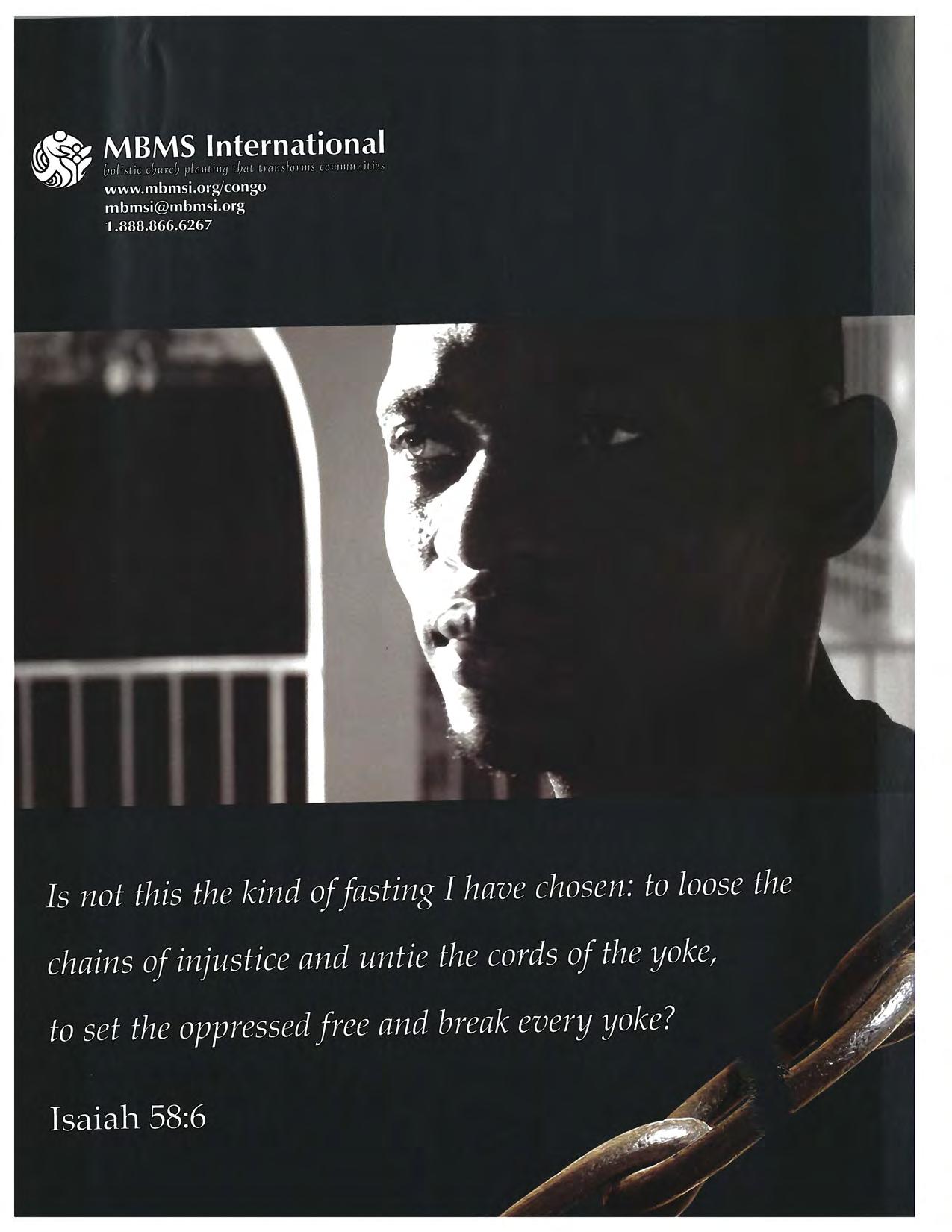MBMSI WITNESS INSIDE
19 Rolling out the welcome mat
21 Survey affirms ministry of conference
23 The cattle on a thousand hills


MBMSI WITNESS INSIDE
19 Rolling out the welcome mat
21 Survey affirms ministry of conference
23 The cattle on a thousand hills


You've spent your life discovering and developing your God-given gifts - and honOring God with them . We can help you continue to use your resources wisely, as you shape a legacy that affirms your faith and your values. Ask us about:
• Retirement income planning
• Estate planning/administration and charitable giving plans
• Medicare supplement coverage
• Values-based investing options
• Stewardship resources and workshops
For more infonnation, call (800) 348-7468, or visit www mma-online.org.
All products may not be available in every state
19 > Rolling out the welcome mat 21 > Survey affirms ministry of national conference 22 > usc finishes in the black 23 > The cattle on a thousand hills
24 > Mennonites mobilize after May earthquake
25 > Bethel dedicates new facility 28 > lost named Midwest mobilizer

Why walk with a rock in your shoe
PH ' LIP SIDE by Philip Wiebe Paying the price of gas
with God]
10 HE MAKES ME LIE DOWN by Diane Andrews with Myra Holmes
In the midst of a life filled with many good things, I was running on empty. And like David, the author of Psalm 23, I realized it was time to move from being a shepherd to being a sheep.
12 AN ODE TO WALK ING by Layton Friesen
I am tangling with the automobile- a tyrant that has such a grip on our lives that only drasti c measures can put it on the defensive. Consider these four reasons why walking may be a godly way to go.
15 THE GOSPEL OF GRIT by Wally Kroeker
Sermons are seldom preached on the nitty-gritty sayings found in Proverbs. But in these sayings about ordinary life we see a God with both feet on the ground
16 WELCO ME TO THE COMPLEX LIFE by Pierre Gilbert
The lure of materialism can tempt us at times to equate a simple lifestyle with Christian discipleship . While God may call some people to the simple life, he calls others of us to the complex life. The book of Daniel suggests that ones simple-or complex-economic lifestyle is secondary to a much more important concern.
BY NOW OUR HOUSEHOLD HAS FULLY CONVERTED TO summertime. After being apart for most of the day during the past nine months of school, our family has spent June relearning how to get along. Bedtime has moved back an hour or more. We've become accustomed to evenings at the baseball diamond and are comfortable smelling like suntan lotion or bug spray or both. We have breathed a collective sigh of relief, thankful that the wheat harvest was completed safely and successfully.
Now it's July, the month when Kansas temperatures typically soar. In all likelihood there won't be many thunderstorms to cool things off and so we'll be spending afternoons atthe swimming pool, unless it gets too hot even for that. We'll be scouring cookbooks looking for new ways to grill an entire meal-anything to avoid using the oven. Thanks to the green thumbs in our congregation, I'll be able to "shop" the boxes of tomatoes, zucchini and cucumbers setting by the church door with a note that says, "Free-help yourself."
Families aren't the only ones who observe summertime. Given the list of church activities we compiled this past month-and didn't have room for in this issue-it seems congregations have also shifted to summertime.
Church picnics and cam pouts are common and mission trips and service projects are on the docket. Most congregations have completed or are preparing for vacation Bible school or other children's activities. Many kids will enjoy a life-changing week at a church-sponsored camp. Some congregations initiate a different worship schedule during the summer or host special family-friendly Sunday evening activities. Check the August issue of the Leader for an extended Church News and Notes section that will list many of the late spring and summer events our U.S. Mennonite Brethren have enjoyed.
The writer of Eccelessasties says that "for everything there is a season." May the events that fill our calendars this summer make for a season that is refreshing and renewing.
"I would look at them (his captors) and be thinking, ibis is how 1 could incapacitate them: and then I would think of Jesus' call to love your enemy and it just seemed really incongruous. These thoughts interfered with my ability to love them, something which was already hard enough to do." -Tom Fox, Christian Peacemaker Teams activist who was held captive by Sunni Muslim militants in Baghdad for 188 days, in an interview with Mennonite Weekly Review
• July 26-28-U.S. Conference Pastors' Conference, Boone, NC
• July 28-30-U.S. Conference convention, Boone, NC
• Oct. 26-29-Cenrral District Conference convention, Henderson , Neb
• March 31 - April 3, 2007- National MB Youth Convention, Anaheim, Calif
JU LY 2006
Vol um e 69
Number 7
Connie Faber EDITOR
Myra Holmes ASSISTANT EDI TOR
Ela ine Ewert GRAPHI C DESIGNER

MANDATE The Ch rist ia n Lea der (l SS N 000 9- 5149 ) i s pub l i shed mo nthly by th e U S Co nfer e nce of Menn onite Bre th re n Chu rc hes The Chr is tian Leader see k s to inform Menn on it e Brethre n memb ers and churches of th e event s. ac tiviti es deci si ons and i ss ues of th eir deno m in ati on and to i nstru ct inspire and init ia t e di alogu e so mem bers w ill as pi re t o be fa ithful di sci ples of Ch ri st as und ersto od in the evang el ic aVAn abapti st th eolog ical t radition
EDITORIAL PO LICY Th e vi ews exp re ssed in thi s publicatio n do not nec essarily repre se nt th e po siti on of th e Chri s t i an Leader th e U S Conferen ce Lead er s hi p Boar d or t he Menno ni te Brethren Church Scri pture r eferences are from New Internationat Vers ion unless oth erwi se noted The editors invite free la nce arti cle su bmi ss ions A SASE must accompany articl es.
READ ER PARTICIPATION The editors invite reade rs t o sha re th eir thought s and op inion s on topic s r eleva nt t o th e Men nonite Brethre n Church usi ng letters to th e edi tor an d Forum essays. Letters t o the editor should be bri ef - 300 wo rd s or less - and on one subject. Lett ers mu st be signed and i nclude the write r'S ci ty and state Lett ers will be edited for clarity. appropri at eness and l ength Leite rs will be published as space allow s unless marked - Not for pu blication : Forum is op en to members or attende es of Men noni t e Brethren churches Essays should not exceed 800 words and should include the wri ter's nam e addre ss. home church and occupat ion.
COMMUNI CATION All corre spond ence. including chang e of address. should be addressed to the Chris tian Leader. Box 220 Hillsboro KS 67063
Phon e: 620- 947 - 5543 Fax : 62 0- 947 -32 66 E- mail : chr isti anlead erfclusmb org
SUB SC RIPTION S $18 for one year $34 for two years and $50 for three years 1$20 $38 $54 in Ca nada) ; $ 1 50 per copy
MEMB ERSH iP The Chris /ian Leader is a m ember of th e Eva ng el ic al Press Ass ocia t io n and Meetingho use. an ass oci at io n of Men noni te and Bre th re n in Chri st ed itors
PO STMASTE R Send add r ess chan ges to the Christian Leader. Box 22 0 Hillsboro. KS 67063 Periodi ca l s postage paid at Hillsboro Kan sa s.
The Da Vinci Code challenges our faith. How should a Christian respond?
YOU couldn't tum your head in any direction the third week in May-or most of the year for that matterwithout seeing or hearing about Dan Brown's The Da Vinci Code, a story suggesting that the church con-
spired to hide the true iden-
tity of Christ and to mislead
his followers.
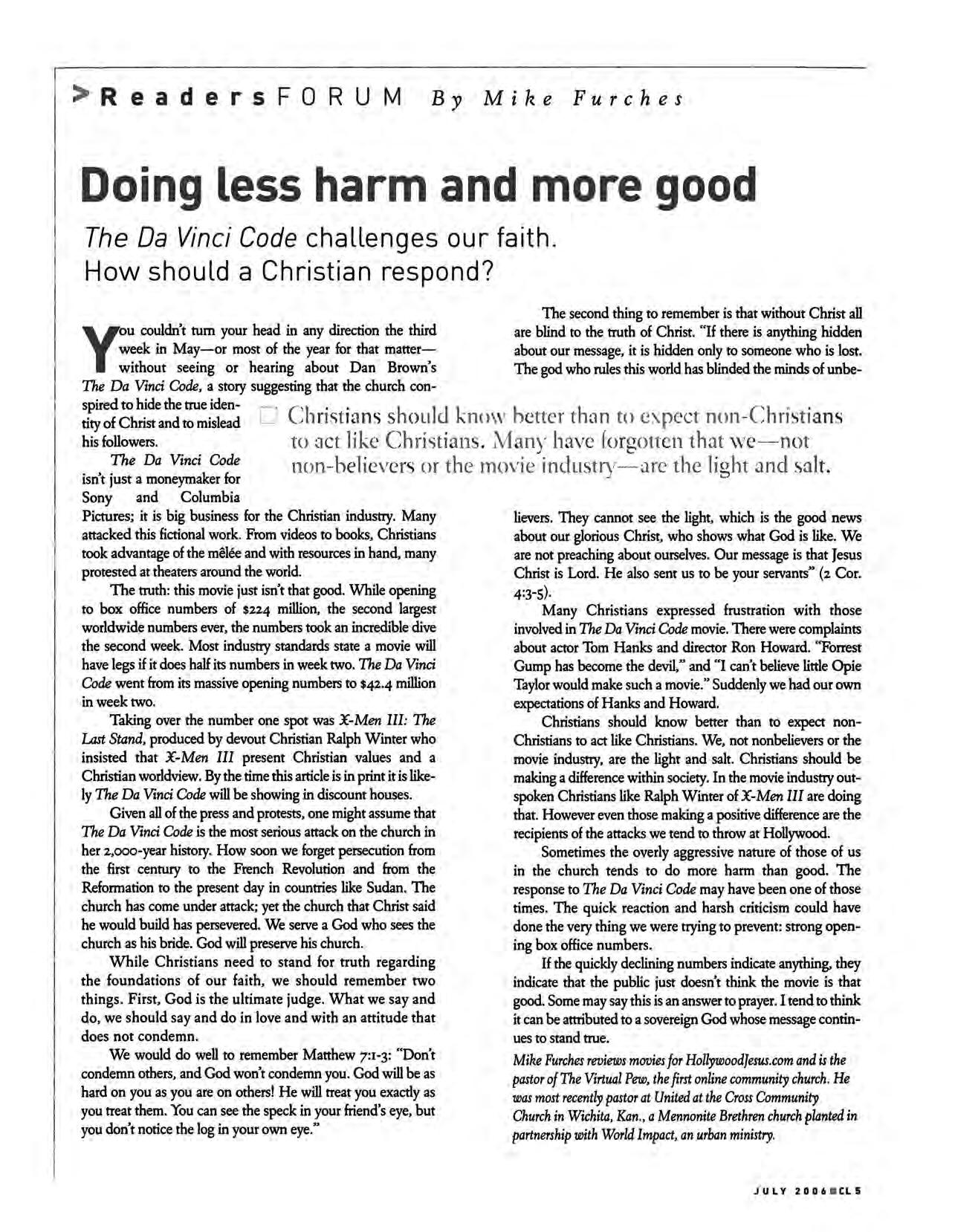
The second thing to remember is that without Christ all are blind to the truth of Christ. "If there is anything hidden about our message, it is hidden only to someone who is lost. The god who rules this world has blinded the minds of unbe-
The Da Vinci Code non - h e li e ve rs or the movie indu strY -Jre the li ght and salt . isn't just a moneymaker for Sony and Columbia Pictures; it is big business for the Christian industry. Many attacked this fictional work From videos to books, Christians took advantage of the melee and with resources in hand, many protested at theaters around the world.
The truth: this movie just isn't that good. While opening to box office numbers of $224 million, the second largest worldwide numbers ever, the numbers took an incredible dive the second week. Most industry standards state a movie will have legs if it does half its numbers in week two. The Da Vinci Code went from its massive opening numbers to $42.4 million in week two.
Taking over the number one spot was X-Men III: The Last Stand, produced by devout Christian Ralph Winter who insisted that X-Men III present Christian values and a Christian worldview By the time this article is in print it is likely The Da Vinci Code will be showing in discount houses.
Given all of the press and protests, one might assume that The Da Vinci Code is the most serious attack on the church in her 2,ooo-year history. How soon we forget persecution from the first century to the French Revolution and from the Reformation to the present day in countries like Sudan. The church has come under attack; yet the church that Christ said he would build has persevered. We selVe a God who sees the church as his bride. God will preseIVe his church.
While Christians need to stand for truth regarding the foundations of our faith, we should remember two things. First, God is the ultimate judge What we say and do, we should say and do in love and with an attitude that does not condemn
We would do well to remember Matthew 7:1-3: "Don't condemn others, and God won't condemn you. God will be as hard on you as you are on others! He will treat you exactly as you treat them. You can see the speck in your friend's eye, but you don't notice the log in your own eye."
lievers. They cannot see the light, which is the good news about our glorious Christ, who shows what God is like. We are not preaching about ourselves. Our message is that Jesus Christ is Lord. He also sent us to be your selVants" (2 Cor. 4:3-5)·
Many Christians expressed frustration with those involved in The Da Vinci Code movie. There were complaints about actor Tom Hanks and director Ron Howard. "Forrest Gump has become the devil," and "I can't believe little Opie Taylor would make such a movie." Suddenly we had our own expectations of Hanks and Howard.
Christians should know better than to expect nonChristians to act like Christians. We, not nonbelievers or the movie industry, are the light and salt. Christians should be making a difference within society. In the movie industry outspoken Christians like Ralph Winter of X-Men III are doing that. However even those making a positive difference are the recipients of the attacks we tend to throw at Hollywood.
Sometimes the overly aggressive nature of those of us in the church tends to do more harm than good. The response to The Da Vinci Code may have been one of those times . The quick reaction and harsh criticism could have done the very thing we were trying to prevent: strong opening box office numbers.
If the quickly declining numbers indicate anything. they indicate that the public just doesn't think the movie is that good. Some may say this is an answer to prayer. I tend to think it can be attributed to a sovereign God whose message continues to stand true.
Mike Furches reviews movies for HollywoodJesus.com and is the pastor of The Virtual Pew, the first online community church He was most recently pastor at United at the Cross Commun ity Church in Wichita, Kan., a Mennonite Brethren church planted in partnership with World Impact, an urban ministry.
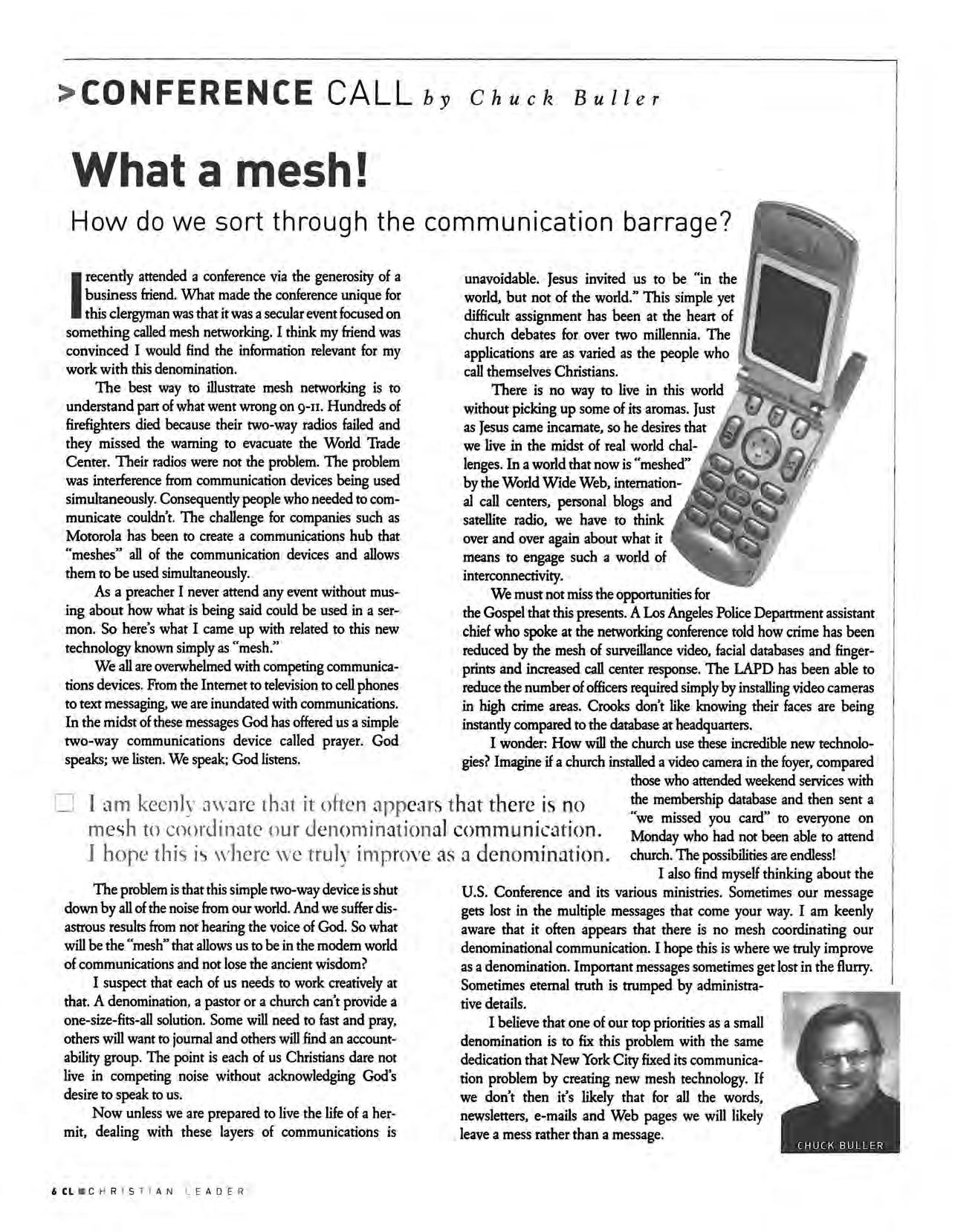
Chuck Buller
Irecently attended a conference via the generosity of a business friend. What made the conference unique for this clergyman was that it was a secular event focused on something called mesh networking. I think my friend was convinced I would find the information relevant for my work with this denomination.
The best way to illustrate mesh networking is to understand part of what went wrong on 9-11. Hundreds of firefighters died because their two-way radios failed and they missed the warning to evacuate the World Trade Center. Their radios were not the problem. The problem was interference from communication devices being used simultaneously Consequently people who needed to communicate couldn't. The challenge for companies such as Motorola has been to create a communications hub that "meshes" all of the communication devices and allows them to be used simultaneously.
As a preacher I never attend any event without musing about how what is being said could be used in a sermon. So here's what I came up with related to this new technology known simply as "mesh."
We all are overwhelmed with competing communications devices . From the Internet to television to cell phones to text messaging, we are inundated with communications. In the midst of these messages God has offered us a simple two-way communications device called prayer. God speaks; we listen. We speak; God listens.
unavoidable. Jesus invited us to be "in the world, but not of the world." This simple yet difficult assignment has been at the heart of church debates for over two millennia. The applications are as varied as the people who call themselves Christians.
There is no way to live in this world without picking up some of its aromas. Just as Jesus came incarnate, so he desires that we live in the midst of real world challenges. In a world that now is "meshed" by the World Wide Web, international call centers, personal blogs and satellite radio, we have to think over and over again about what it means to engage such a world of interconnectivity.
We must not miss the opportunities for the Gospel that this presents. A Los Angeles Police Department assistant chief who spoke at the networking conference told how crime has been reduced by the mesh of surveillance video, facial databases and fingerprints and increased call center response. The LAPD has been able to reduce the number of officers required simply by installing video cameras in high crime areas. Crooks don't like knowing their faces are being instantly compared to the database at headquarters.
I wonder: How will the church use these incredible new technologies? Imagine if a church installed a video camera in the foyer, compared those who attended weekend services with
1 ;.lm keenly aware th;.lt it often app e;]fS t hat th ere is no me s h to coordinate our d e nomin ation al communication . I hope thi,; is where \ve truly imp rove as a denomina t io n .
The problem is that this simple two-way device is shut down by all of the noise from our world. And we suffer disastrous results from not hearing the voice of God. So what will be the "mesh" that allows us to be in the modem world of communications and not lose the ancient wisdom?
I suspect that each of us needs to work creatively at that. A denomination. a pastor or a church can't provide a one-size-fits-all solution. Some will need to fast and pray, others will want to journal and others will find an accountability group The point is each of us Christians dare not live in competing noise without acknowledging God's desire to speak to us.
Now unless we are prepared to live the life of a hermit, dealing with these layers of communications is
the membership database and then sent a "we missed you card" to everyone on Monday who had not been able to attend church. The possibilities are endless!
I also find myself thinking about the U.S. Conference and its various ministries. Sometimes our message gets lost in the multiple messages that come your way. I am keenly aware that it often appears that there is no mesh coordinating our denominational communication. I hope this is where we truly improve as a denomination. Important messages sometimes get lost in the flurry. Sometimes eternal truth is trumped by administrative details.
I believe that one of our top priorities as a small denomination is to fix this problem with the same dedication that New York City fixed its communication problem by creating new mesh technology. If we don't then it's likely that for all the words, newsletters, e-mails and Web pages we will likely leave a mess rather than a message
Fresno Pacific University hosted the National Association of Intercollegiate Athletics Outdoor Track and Field National Championships May 25-27 The competition consists of 52 events and boasts the largest participation of any NAIA national competition. Founded in 19370 the NAIA strives for exceptional standards in academics, diversity and character among its 300 member institutions and is committed to changing the culture of sport through its Champions of Character program.
Both FPU, the MB-owned university in Fresno, Calif., and Tabor College, the MB-owned college in Hillsboro, Kan., competed in the events. The FPU Web site lists four women and five men who participated. FPU's women placed 16th overall, while the men placed 49th. Two FPU women earned NAIA All-American honors: junior Karley Kalinich for a third place finish in discus and sophomore Natalie Friesen for a third place finish in the triple jump.
Eight Tabor athletes-seven men and one woman-competed. 'This is by far the most athletes we've ever taken to nationals," says coach Dave Kroeker.
The event was expected to have significant economic impact on the Fresno area, with nearly $1 million in hotel stays, meal purchases, transportation fees and other retail sales from about 1,500 athletes and coaches, as well as spectators, from more than 100 teams across the U.S. and Canada.
The championships, co-sponsored by the university and Fresno Sports Council, will be at Fresno Pacific University again in 2007.-FPU
Members of the Vietnam Mennonite Church were beaten and arrested during a confrontation with authorities May 22 Nine were held overnight at the local police station . Six were released the next day and the others a day later
This latest conflict follows the release from prison March 3 of the last of the "Mennonite Six " The six were arrested in 2004 , charged with "hindering officials from carrying out their duties" and sentenced to prison terms ranging from a few months to several years . All six consistently denied that they had violated Viemamese laws
The May 22 conflict centered around renovations to the church building in Ho Chi Minh City's District Two. Pastor Nguyen Hong Quang submitted a request April 27 for a building permit to do temporary repairs to the building, fix the leaking roof and resolve flooding problems Quang was granted permission to

raise the level of the foundation and floor and to replace the roofing The permit specifically stated that "the petitioner is not permitted to change the structure of the building, build or extend the present dimensions "
An observer said that Quang was planning to add a loft to the front section of the building On May 22, local authorities cited him for going beyond their approval and asked the group to stop the work. When the church continued the renovation, the authorities and police converged on the house, beating and arresting church members.
In the past two years, Vietnam's National Assembly has adopted different religious regulations , and the Prime Minister promulgated new procedures for relating to evangelical groups However these changes have been implemented unevenly in different areas , and lack of trust continues between many religious groups and various levels of government.
The church requests prayer for those arrested and asks that the violent actions of the police be denounced.-MWC
As a new hurricane season begins, Mennonite Central Committee hurricane workers and members of pattner congregations face the summer with trepidation and faith. MCC is the relief, service and peace agency of North American Mennonites.
"Personally I don't even want to think about it, but it is a reality and we have to embrace ourselves with trust in the Lord, exercise our faith with all our hearts and minds and hope that it doesn't come our way," says Blanca Mackay, a hurricane response worker at Amor Viviente, an Anabaptist congregation in Metairie, La.
Lawrence Velasquez, a hurricane response worker at Comunidad Cristiana Intemacional in the New Orleans suburb of Harahan, says he knows residents so leery of the coming hurricane season that they've decided to wait to repair their homes until after it ends. Even families that have gotten money from insurance companies fear investing it in fixing their homes now, he says.
Hurricane season lasts from June 1 to Nov. 30. The National Oceanic and Atmospheric Administrarion has predicted 13 to 16 storms

strong enough to be named, with eight to 10 hurricanes. Of those, four to six could become "major" Category 3 hurricanes.
Meanwhile MCC continues its response to the devastation of Hurricanes Katrina and Rita. Local hurricane response workers remain in place in New Orleans suburbs. In Meridian, Miss., and Houston, Texas, local hurricane response workers aid evacuees who still have not returned to New Orleans. MCC will continue its response to the 2005 hurricanes over the next three to five years, supporting long-term projects to assist evacuees, working with local Anabaptist churches and addressing underlying injustices that the storm brought to the surface.-MCC
Concerns for safety have prompted Christian Peacemaker Teams to leave Baghdad, Iraq, for several months as they reevaluate the group's work in that country. CPT has had a presence in Iraq since October 2002, six months before the U.S. led invasion. The team focused on detainees' rights and efforts to end military occupation of the country. In November 2005 four CPTers were kidnapped in Baghdad. One was found March 9 shot to death and the other three were freed March 23 by British commandos.
'We decided during the kidnapping to stay in Iraq until there was a resolution," CPT said in a May 29 statement. 'l\fter resolution, our plan was to have the team go out for a time to debrief and to consider the future of our presence and work in Iraq. We followed our plan, and currently the team is on a temporary leave of absence from Iraq while we make decisions."
CPT cites concerns for safety and uncertainties about Iraq's future government as reasons for the leave, which is expected to be between two and six months. Contacts in Iraq will keep them informed about developments and options. Two CPT interns remain in Iraq in an undisclosed location . CPT has Anabaptist roots, having been founded after a speech by Ronald J. Sider at the 1984 Mennonite World Conference.-CPT. MWR
By the May 15 end of open enrollment for Medicare Part D, Mennonite Mutual Aid had enrolled 9,636 members in the new prescription drug benefit plan, including approximately 2,000 people who had not previously participated in an MMA health plan. One reason for this success is due to the efforts of MMA counselors and staff who talked to more than 10,000 senior constituents across the country in educational seminars and one-on-one meetings. MMA, an Anabaptist stewardship solutions organization, is partnering with UniCare, a Wellpoint Company, to offer Medicare Part D prescription drug coverage. For more information, visit www.mma-online.org.-MMA
Ken Reddig has been appointed executive secretary of the North American Mennonite Brethren Historical Commission beginning July 1. Reddig is currently director of the Centre for MB Studies in Winnipeg and will continue in that role on a reduced basis. Reddig is replacing Abe Dueck, who retired June 30.-HC
The 30th anniversary edition of the Mennonite Your Way Hospitality Directory is available to order. Mennonite Your Way provides a network connecting the hospitality of those wishing to be hosts and travelers seeking fellowship. The directory now includes over 1500 hosts in 51 countries. For more information visit www mennoniteyourway.com.
Mennonite Central Committee's 2005-2006 meat canning season yielded a record 566,322 cans of meat. In a tradition that dates to 1946, a four-person canning crew takes the mobile meat canner on the road from October through April. This year the canner visited 13 U.S. states and two Canadian provinces. Local volunteers donate meat and help the MCC crew cut, cook, stir and can it. A much-valued source of protein for families impacted by war, disaster and poverty, each can feeds five to 10 people.-MCC
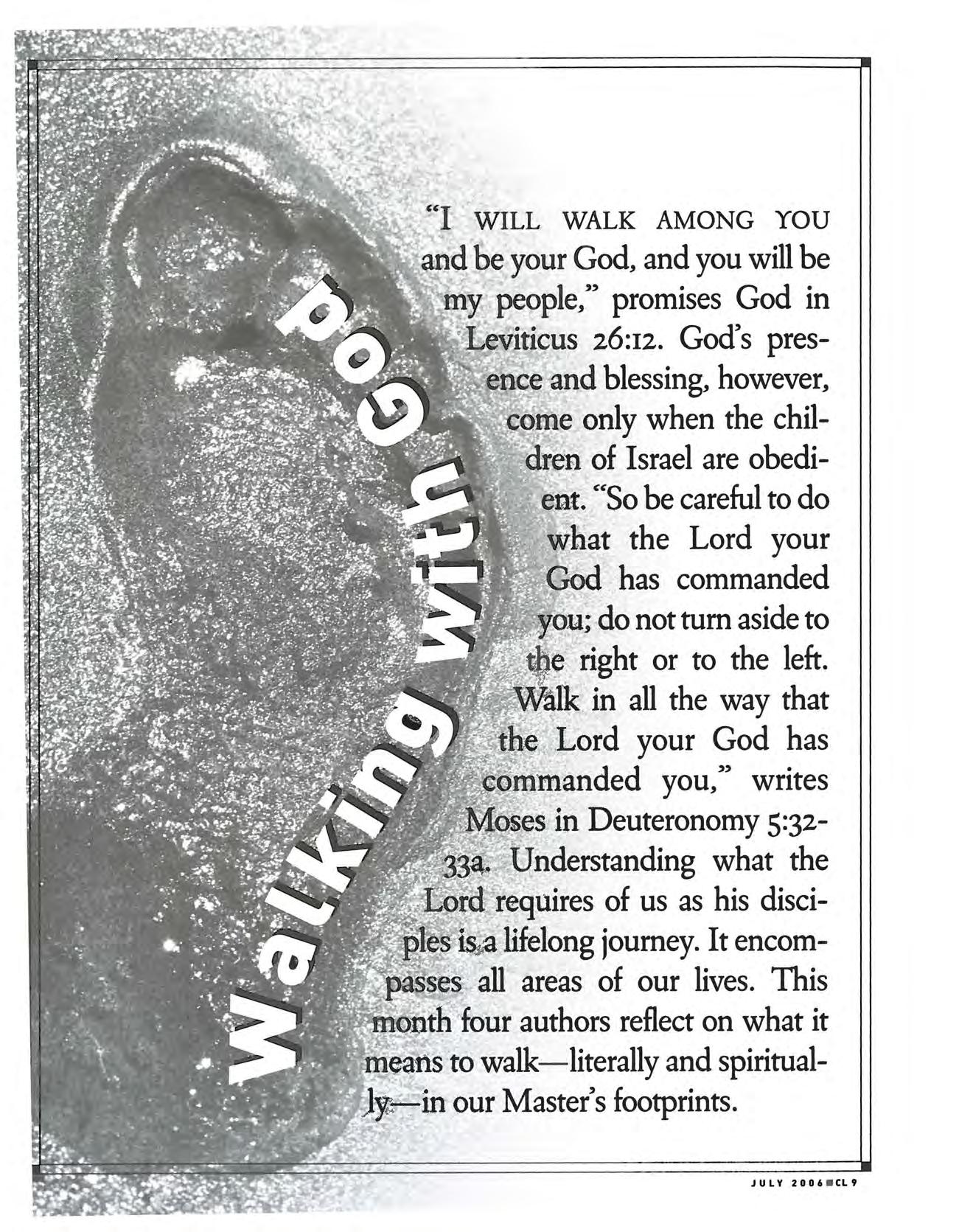
CIfI " ,. WILL WALK AMONG YOU "\ ". pe your God, and you will be > eeople/' promises God in 26:12. God's presblessing, however, only when the chil" of Israel are obedi. C4:S o be careful to do r:>;, the Lord your ' has commanded not tum aside to , right or to the left . ..,' in all the way that :Lord your God has ded you," writes in Deuteronomy 5:32ding what the of us as his disci"" _ c::. journey. It encomall areas of our lives. This }'four authors reflect on what it to walk-literally and spiritualour Master's footprints.
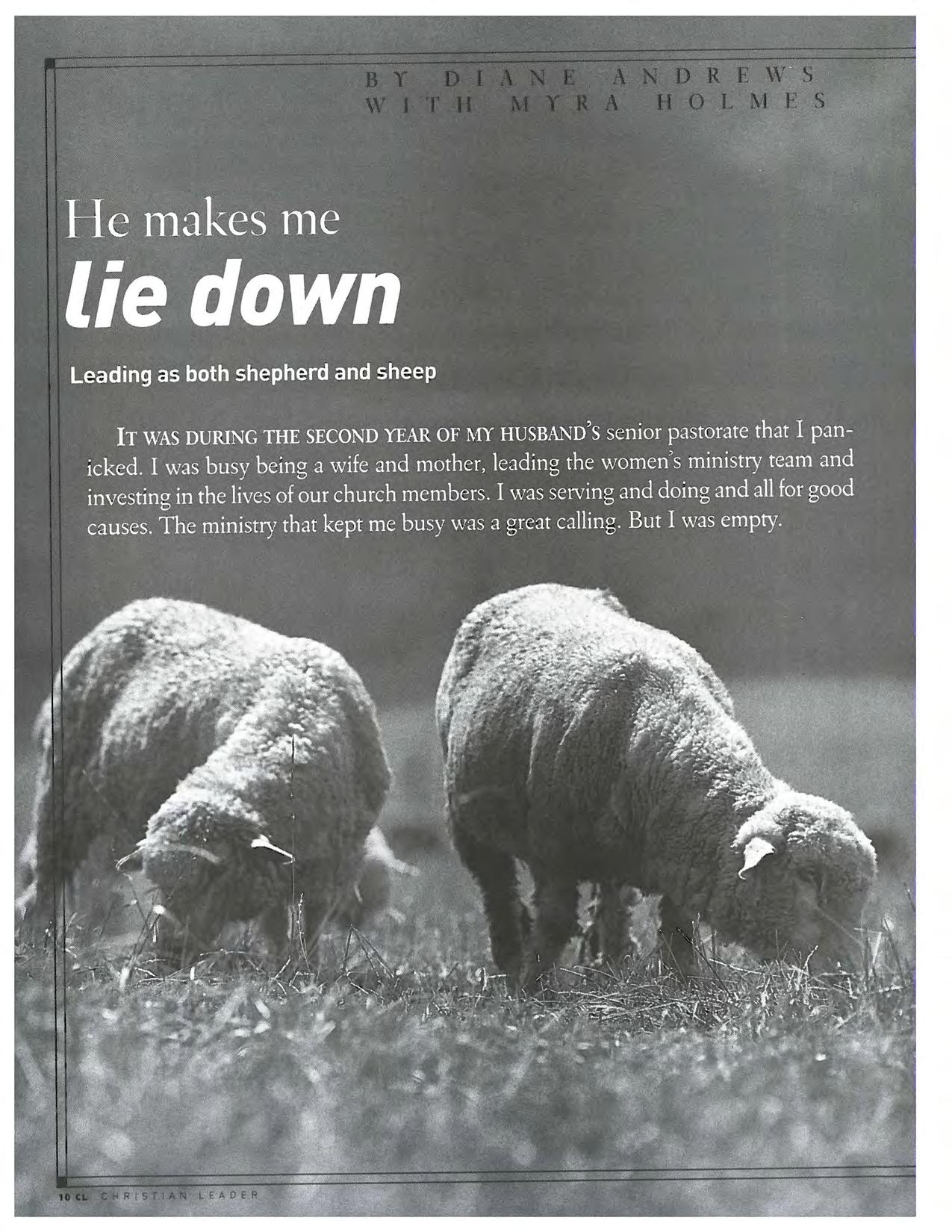

My heart's desire was to serve the women of our church. I envisioned them as baby birds in the nest and I, the mother bird, had nothing to feed them. My personal storehouse was empty. I was not praying. I was not having quiet time with God consistendy. I needed to replenish myself.
The process of renewal began when I attended a prayer summit. As the leader prayed, «Lord, there's an empty pastor's wife here that needs to be filled," I recogni2ed my need to rest physically and renew my relationship with Christ. That day I felt like a dried-up sponge that was dipped in the Holy Spirit, encouraged and refilled. Since then, I've learned to stay close to God through regular Bible study, prayer and retteats.
In part because of my experience, I founded R&R Retreats for women like me who need to be filled. R&R organizes weekend retteats to encourage women to rest and to renew their relationship with Christ. Unlike retteats that are filled with speakers and workshops, R&R Retreats always dedicates one afternoon to quiet time. I\Te seen lives changed at these retreats because as women spend time with God, he changes their hearts.
I'm convinced that we-women and men-will live in chaos if we don't take time for rest and renewal. It's our lifeline. Like David, the author of Psalm 23, we need to learn to be both «shepherds" and «sheep."
David was a shepherd, both in the literal sense as a young man and in a figurative sense as the king of Israel. Yet in Psalm 23:1 David says, 'The Lord is my shepherd." He declares that he is also a little sheep that needs a shepherd. He knows that he must listen to the Shepherd's voice and follow him closely.
As I think about living my life as both shepherd and sheep, Psalm 23 is an encouragement.
The Lord is my Shepherd
David begins this psalm with an important declaration: 'The Lord is my Shepherd." Most of us are better at being shepherds than at being sheep. The lifestyle of a sheepstaying close by our Shepherd, being still and resting in him-doesn't come easily in the midst of a busy lifestyle. It's hard to stop. I've seen women struggle with the quiet time at our retreats. They don't know how to be quiet: they're uncomfortable; they pace. Sometimes it's a matter of obedience and we have to schedule the time. It doesn't just happen.
While it's a great calling to be a shepherd, it's a greater calling to be a sheep.
I shall not want
Our fast-paced lifestyles carry intense demands: We manage households, parent children, run businesses, pursue careers, support friends and serve in the church Those demands won't go away, but we can choose how we live in that lifestyle.
David says that because the Lord is his Shepherd, «I shall not be in want" (23:1) If our first priority is to be a faithful sheep, then we will be more effective in our roles and we shall not want what we do not have. It's not always things we
want; sometimes we long for a different pace or different lifestyle. If we regularly take time to know the Shepherd's voice, it will drastically change our lifestyle. We will be more in tune with his calling and guidance. We will be more obedient and more content. God wants to bless us, but we must have proper priorities.
Green pastures and still waters
It is only when we '1ie down in green pastures" and walk with him beside «quiet waters" that we learn to recognize God's voice. Renewal only comes through rest.
Those green pastures look different for each of us. For some it's a retteat like an R&R Retreat. For others it's a hike in the mountains or a cozy study full of books. Some respond to Bible study, music, beauty or even extreme simplicity.
One woman had a beautiful wing chair that she had intended as a quiet place but had never used. It simply wasn't drawing her to God. At an R&R Retreat, she discovered that she responded best to God's voice when she was outside basking in the sun.
Where do you hear God's voice most clearly? Go to that place. Spend time there.
He makes me lie down
Sometimes in our busyness we run through the pasture and not right past the blessing he has in store for us there. When we don't choose to lie down, our Shepherd will make us lie down in the pasture. He will force us through circumstances or pain or even illness, not because he's mean, but because he doesn't want us to miss the blessing.
When we hold an R&R Retreat I always ask, 'Who feels like God made them come?" There's always someone, and they're always blessed through the quiet time. .
One woman said that she hated retteats and had come only because her daughter-in-law had invited her. As she found a place outside in the forest during the quiet time she found renewal for her soul. She wrote in our R&R journal, "I have a vision of God stroking my head saying, 'My child, my child, you have finally come home.'"
The challenge for us is to choose to lie down before God makes us lie down. Begin slowly with five or 10 minutes at a time, if necessary. Consider a retreat to get out of your daily environment and encourage rest.
He restores my soul
When we choose to spend time in the pasture we will draw close to the Shepherd. When we show up, God shows up, whether through his Word, through beauty, through a still, small voice or through journaling. Then the Shepherd restores our soul. He guides us in paths of righteousness, but always for his name's sake. Even when we must walk through the «valley of the shadow of death," we will know his comfort.
God is a God of order. We tend to want the comfort, peace and guidance without first stopping. The pasture must come first.
In the midst of our busy, shepherd lifestyles, let us also answer the greater calling to be faithful sheep.
Diane Andrews is founder and director of Rb'R Retreats, a ministry of Belleview Community Church, Littleton, Colo., that organizes retreats for women from all walks of life. Since its founding in 2001, well over 1,000 women have attended an Rb'R retreat. Myra Holmes is the Leader assistant editor.

Four reasons why walking may be a godly way to go
I number it among my blessings that my father had no car.... The deadly power of rushing about wherever I pleased had not been given me. I measured distances by the standard of man, man walking on his own two feet, not by the standard of the internal combustion engine .... The truest and most horrible claim made of modern transport is that it Hannihilates space." It does. It annihione of the mpst glorious gifts we have been given.... Of space and wants it annihilated that . Why not creep into his cofat once? There is little enough space th ere. - C.S. Lewis, Surprised by Joy
WHAT FOLLOWS IS THE KIND OF CONGRATULATIONto-self that occasionally sits in my mind when I find myself walking while others drive Nevertheless, it might serve as a kind of proposal for enshrining walking as a Christian form of transportation.
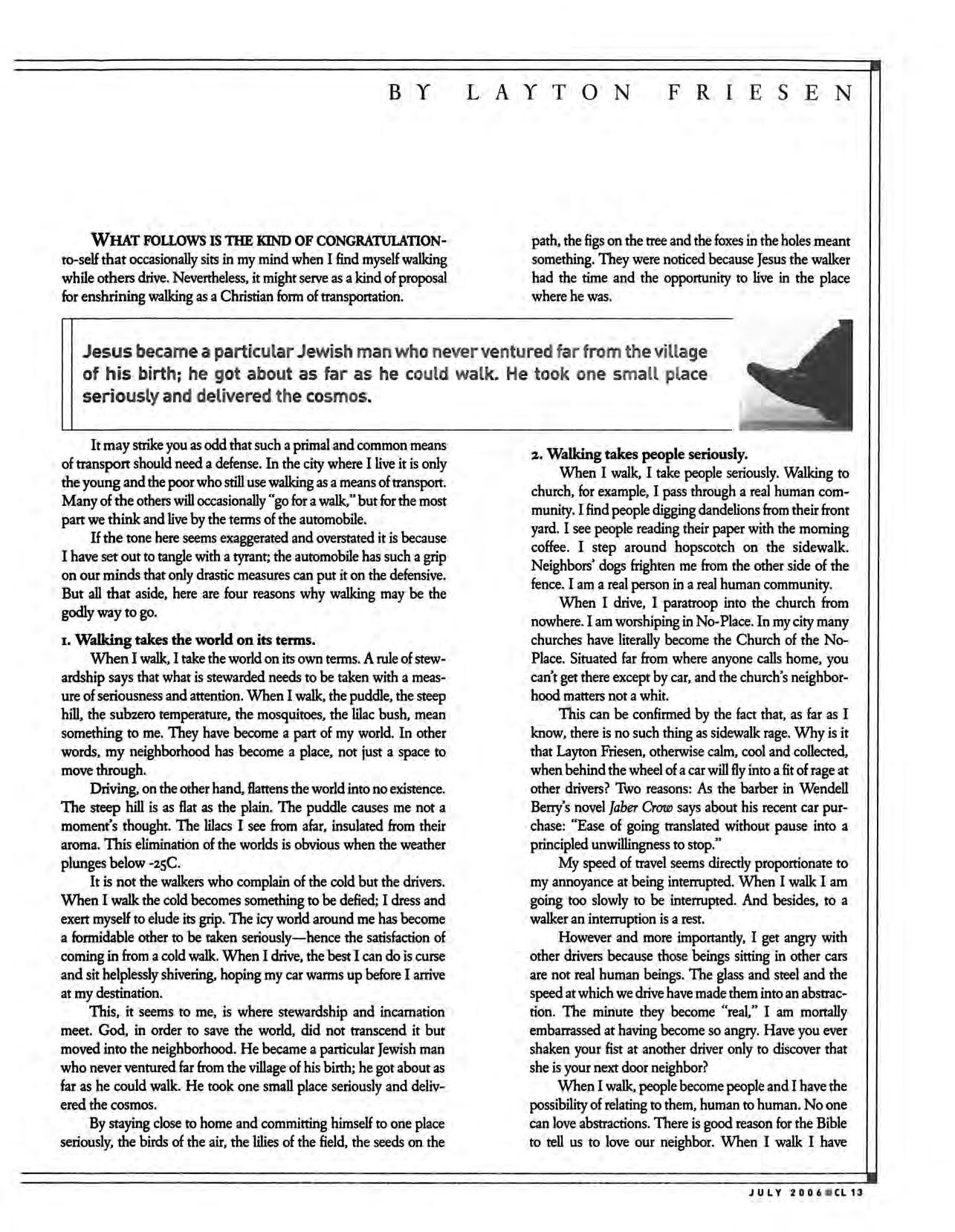
path, the figs on the tree and the foxes in the holes meant something. They were noticed because Jesus the walker had the time and the opportunity to live in the place where he was.
Jesus became a particular Jewish man who never ventured far from the village of his birth; he got about as far as he could walk. He took one small place se riously and delivered the cosmos
It may strike you as odd that such a primal and common means of transport should need a defense. In the city where I live it is only the young and the poor who still use walking as a means of transport. Many of the others will occasionally"go for a walk," but for the most part we think and live by the terms of the automobile.
If the tone here seems exaggerated and overstated it is because I have set out to tangle with a tyrant; the automobile has such a grip on our minds that only drastic measures can put it on the defensive. But all that aside, here are four reasons why walking may be the godly way to go.
I. Walking takes the world on its tenos.
When I walk, I take the world on its own terms. A rule of stewardship says that what is stewarded needs to be taken with a measure of seriousness and attention. When I walk, the puddle, the steep hill, the subzero temperature, the mosquitoes, the lilac bush, mean something to me. They have become a part of my world. In other words, my neighborhood has become a place, not just a space to move through.
Driving. on the other hand, flattens the world into no existence. The steep hill is as flat as the plain. The puddle causes me not a moment's thought. The lilacs I see from afar, insulated from their aroma. This elimination of the worlds is obvious when the weather plunges below -zSC.
It is not the walkers who complain of the cold but the drivers. When I walk the cold becomes something to be defied; I dress and exert myself to elude its grip. The icy world around me has become a formidable other to be taken seriously-hence the satisfaction of coming in from a cold walk. When I drive, the best I can do is curse and sit helplessly shivering. hoping my car warms up before I arrive at my destination
This, it seems to me, is where stewardship and incarnation meet. God, in order to save the world, did not transcend it but moved into the neighborhood. He became a particular Jewish man who never ventured far from the village of his birth; he got about as far as he could walk He took one small place seriously and delivered the cosmos.
By staying close to home and committing himself to one place seriously, the birds of the air, the lilies of the field, the seeds on the
2.. Walking takes people seriously.
When I walk, I take people seriously. Walking to church, for example, I pass through a real human community. I find people digging dandelions from their front yard. I see people reading their paper with the morning coffee. I step around hopscotch on the sidewalk. Neighbors' dogs frighten me from the other side of the fence. I am a real person in a real human community.
When I drive, I paratroop into the church from nowhere. I am worshiping in No- Place In my city many churches have literally become the Church of the NoPlace. Situated far from where anyone calls home, you can't get there except by car, and the church's neighborhood matters not a whit.
This can be confirmed by the fact that, as far as I know, there is no such thing as sidewalk rage. Why is it that Layton Friesen, otherwise calm, cool and collected, when behind the wheel of a car will fly into a fit of rage at other drivers? Two reasons: As the barber in Wendell Berry's novel Jaber Crow says about his recent car purchase: "Ease of going translated without pause into a principled unwillingness to stop."
My speed of travel seems directly proportionate to my annoyance at being interrupted. When I walk I am going too slowly to be interrupted. And besides, to a walker an interruption is a rest.
However and more importantly, I get angry with other drivers because those beings sitting in other cars are not real human beings. The glass and steel and the speed at which we drive have made them into an abstraction. The minute they become "real," I am mortally embarrassed at having become so angry. Have you ever shaken your fist at another driver only to discover that she is your next door neighbor?
When I walk, people become people and I have the possibility of relating to them, human to human. No one can love abstractions. There is good reason for the Bible to tell us to love our neighbor. When I walk I have
moved from being something analogous to a pomographer (degrading others by dehumanizing them into abstractions) to being a neighbor (relating to people who present themselves to me in all their uniqueness .) The essay to read here is G.K Chesterton's "On Certain Modem Writers and the Institution of the Family."
3. Walking contributes to my life.
When I walk, my body makes a necessary contribution to my life. In this age of cars and planes my body can quickly become a useless appendage to my mind. Much

4. Walking moves me at a human speed.
When I walk, I move at the speed of a human being; when I drive I move at the speed of the gods. We often laugh at the poor folks at the tum of the century who thought a person would die when 35 mph was exceeded. I wonder whether jet lag and the suffocating stress of my modem life may be their last laugh Might I feel hurried. harried and hustled because I am being yanked about at demonic speeds?
Might there actually be speeds that are too fast for my health? Might the reckless speed of my travel be another manifestation of that
My world becomes a s mall, huma n - si ze d world a nd as such it is a world
th at can be r easonably appreci at ed, lov ed and t end ed by a human being
communications technology has little to recommend it other than making the real presence of my body superfluous to my life-cell phones, Intemet. Automation has repeatedly bullied my body away from places where irs skill is valued. My body seems to provide me with no essential service and so must be put on life support called exercise.
My body becomes a means to nothing and so becomes an end, which is to say it becomes an idol. An idol is usually a good thing that has lost irs place in life and through that loss has taken on hideous proportions. The world I live in tempts me to idolize bodies even when it seeks to eliminate every conceivable use for my body.
However, when I walk I have no such idol. As a walker my body has become a means to an end It is getting me someplace. Its care is important because it has a job to do toward something I value. As something important, my body has again become a part of who I am . I have become more whole. which is another way of saying I have become more C hristian
grasping, agitated craving for divine power that alienated the original pair and that frustrated the Babel-raisers? Might my obsession with stretching myself over the world like a god wreak havoc on creation as well as my soul?
Walking seems gentle to my soul. As a walker I can entertain no illusions of grandeur. I cannot be pretentious about the limits of my world. There are certain"places I simply can't get to on foot. This kind of limitation breeds contentment.
My world becomes a small, human-sized world and as such it is a world that can be reasonably appreciated, loved and tended by a human being. As a small human-sized world it is a world for which I can take a reasonable amount of responsibility. That just seems a lot more Christian to me.
Layton Friesen is senior pastor at Fort Garry Evangelical Mennonite Church and was previously associate pastor at Crestview Fellowship , both in Winnipeg Man This article was first published in The Messenger. the publication of the Evangelical Mennonite Conference.
In Proverbs we read about a God with both feet on the ground.
YOU'VE PROBABLY NEVER HEARD A SERMON ON
Proverbs 14:4 : 'Where no oxen are, the trough is clean; but much increase comes by the strength of an ox" (NKJV).
This doesn't fit our idea of deep theology, but it's quite basic. "Do you want to have a clean manger, a tidy but empty bam? Then don't keep oxen. But if you want a good harvest you will need those oxen, and your bam will get messy."
This is typical of the book of Proverbs as it comments on the nitty-gritty aspects of life. With unsparing candor, it addresses mattets like gossip, sloth, household quarrels and business. Here are some samples (NRSV):

all-powerful.
Books like Proverbs tell us that God is interested in more than doctrine, theology and religious language. Wisdom literature grew out of the daily lives, rela-
God doesn't hibernate for six days and then wander back into our lives on the seventh. God is present in the frantic activity of daily, ordinary existence.
• How long will you lie there, 0 lazybones? (6:9).
• Like vinegar to the teeth, and smoke to the eyes, so are the lazy to their employers (10:26).
• The Lord abhors dishonest scales, but accurate weights are his delight (11:1).
• "It's no good, it's no good!" says the buyer; then off he goes and boasts about his purchase (20:14).
• Food gained by fraud tastes sweet to a man, but he ends up with a mouth full of gravel (20:17).
• If a man loudly blesses his neighbor early in the morning it will be taken as a curse (27:14).
In Proverbs the sages express earthly and earthy concerns. We see a God with both feet on the ground.
Proverbs is one of a small collection of Old Testament books known as wisdom literature (including Job, Ecclesiastes and Song of Solomon) Someone has called these writings the "irreligious orphans" of the Old Testament. They seem short on spirituality and long on the grist of daily life. You won't find much there about justification by faith. However, they deal with other crucial themes. They tell us that human life itself is central to God's interest. They assure us that the routine stuff of our lives is important.
Elsewhere in Scripture we learn that God has majesty. God is divine. God is righteous God is the God of our salvation. God is
tionships and struggles of people like you and me. 'i\nything that occurs in the dwelling place of human comes under the care, concern and saving possibilities of its Designer," writes Kathleen O'Connor.
Out of these homespun bits of wisdom comes the serious truth that God is in everything.
God doesn't dip into human life just on Sunday morning and then take off for the rest of the week. God doesn't hibernate for six days and then wander back into our lives on the seventh. God is present in the frantic activity of daily, ordinary existence.
This gospel of grit tells us that the daily grind of the marketplace is more important than we often think.
In short, our work matters to God.
Wany Kroeker is the editor of The Marketplace, a magazine for Christians in business published by Mennonite &onornic Development Associates. This article is reprinted with permission from Kroeker's book God's Week has Seven Days : Monday Musings for Marketplace Christians. Copyright 1998 by Herald Press, Scottdale, PA1S683
IN 2003, Fox NETWORK CREATED THE SIMPLE LIFE, a reality show in which Paris Hilton and Nicole Richie, two young urban and wealthy socialites who never worked a day in their lives, take on a variety of jobs. Though Fox did not pursue the concept beyond season four. E! Network has now resurrected the show. and Fox has produced various versions for the international market.
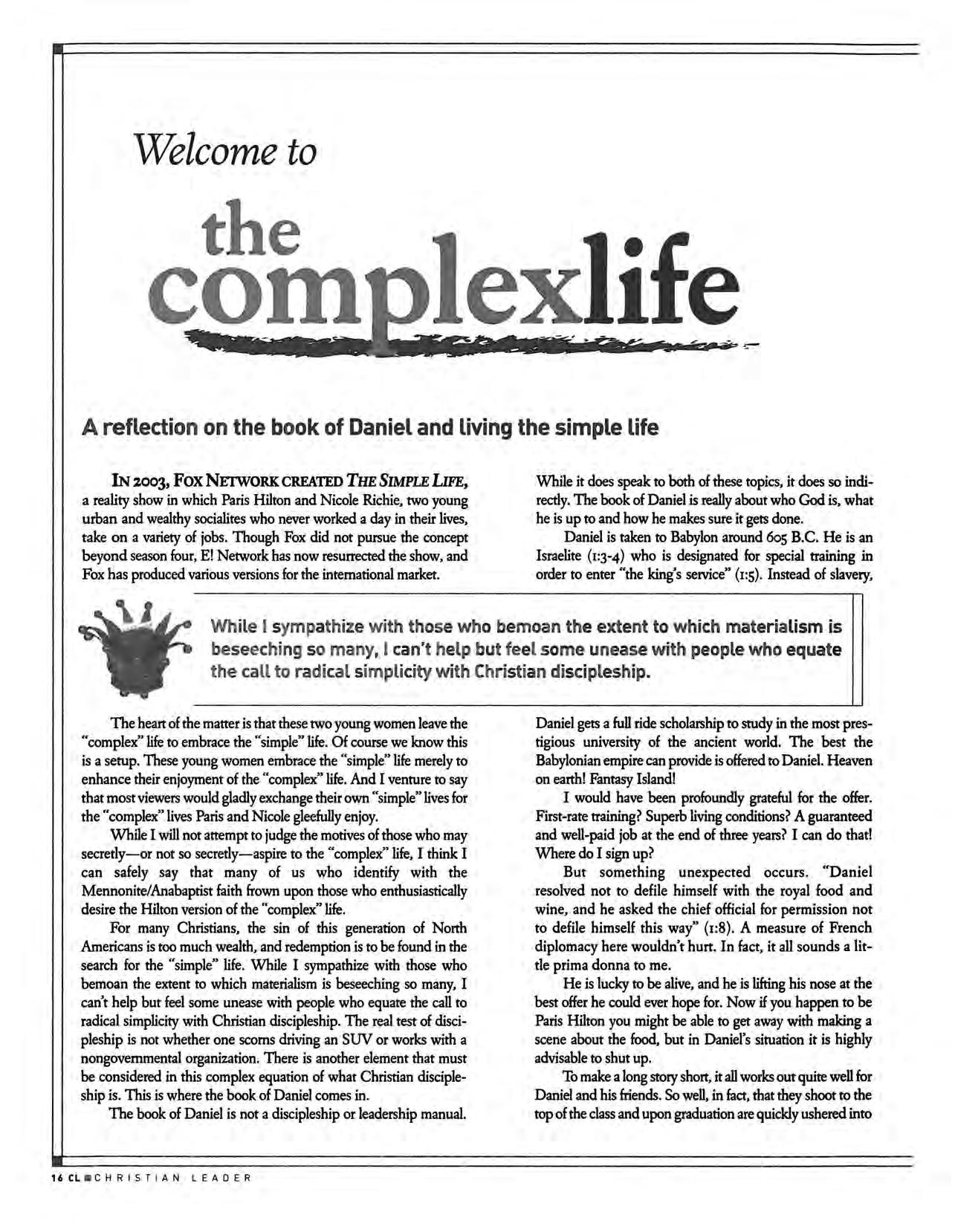
While it does speak to both of these topics, it does so indirectly. The book of Daniel is really about who God is, what he is up to and how he makes sure it gets done.
Daniel is taken to Babylon around 605 B.C. He is an Israelite (1:3-4) who is designated for special training in order to enter "the king's service" (1:5). Instead of slavery.
Wh ile I symp ath ize w it h those who bemoan th e extent to whi ch materia lis m is beseechi ng so m any, I can't h el p but fee l some unease with people who equate th e ca U to ra dical simp licity wi t h Ch rist ian di scipleship_
The heart of the matter is that these two young women leave the "complex" life to embrace the "simple" life. Of course we know this is a setup. These young women embrace the "simple" life merely to enhance their enjoyment of the "complex" life. And I venture to say that most viewers would gladly exchange their own "simple" lives for the "complex" lives Paris and Nicole gleefully enjoy.
While I will not attempt to judge the motives of those who may secretly-or not so secretly-aspire to the "complex" life. I think I can safely say that many of us who identify with the Mennonite/Anabaptist faith frown upon those who enthusiastically desire the Hilton version of the "complex" life.
For many Christians, the sin of this generation of North Americans is too much wealth, and redemption is to be found in the search for the "simple" life. While I sympathize with those who bemoan the extent to which materialism is beseeching so many, I can't help but feel some unease with people who equate the call to radical simplicity with Christian discipleship. The real test of discipleship is not whether one scorns driving an SUV or works with a nongovernmental organization There is another element that must be considered in this complex equation of what Christian discipleship is. This is where the book of Daniel comes in.
The book of Daniel is not a discipleship or leadership manual.
Daniel gets a full ride scholarship to study in the most prestigious university of the ancient world. The best the Babylonian empire can provide is offered to Daniel. Heaven on earth! Fantasy Island!
I would have been profoundly grateful for the offer. First-rate training? Superb living conditions? A guaranteed and well-paid job at the end of three years? I can do that! Where do I sign up?
But something unexpected occurs "Daniel resolved not to defile himself with the royal food and wine, and he asked the chief official for permission not to defile himself this way" (1:8). A measure of French diplomacy here wouldn't hurt. In fact. it all sounds a little prima donna to me.
He is lucky to be alive, and he is lifting his nose at the best offer he could ever hope for. Now if you happen to be Paris Hilton you might be able to get away with making a scene about the food, but in Daniel's situation it is highly advisable to shut up.
To make a long story short, it all works out quite well for Daniel and his friends. So well, in fact, that they shoot to the top of the class and upon graduation are quickly ushered into
the king's service. Daniel becomes one of the most powerful administrators of his time.
Is that all there is to Daniel's story? Stay faithful and God will reward you? As often happens in Scripture, there is more to the story than an easy moral lesson.
In order to understand what is happening, we need to remember this most basic fact about the God of the Old Testament: Yahweh is up to something. He has a project. Ultimately God is committed to the creation of a people made up of men and women who will freely love and serve him.
At the time of Daniel, the people of Israel are facing a terrible crisis. Jerusalem is desttoyed. The elite of the nation have been taken into exile . The Israelites risk losing their identity as _ the people of God. For God, this is catastrophic. If this happens, it will signal the failure of God's project and with it the end of God's redemptive plan for humanity.
This is one project that must not fail.
The "purpose-driven" crisis
How does God meet the challenge? Does he give Daniel superpowers? Does he arrange for a lethal epidemic that only affects the Babylonians? Does he create an army of robots to cripple the Babylonian forces? God could adopt any one of those strategies, but in

this case he doesn't. In fact, most often, he avoids this type of opt ion.
There is one basic principle that governs the nature of God's intervention in the world: God works in partnership with human beings . He never does by himself what he can do through human agents. While it would certainly be more effective for God to do everything himself or to use an army of well-trained androids, the reality is that God has chosen to work with human beings (see for example Gen. 1:27-28; 2:15-17). Bottom line, God needs a person to help him with the task at hand. God's problem is straightforward: How can he ensure the survival of Israel as God's people in a foreign land? The solution? God needs someone in the highest echelons of the Babylonian administration to - facilitate the implementation of , policies to promote the survival of the Israelite community in Babylon. Daniel's most pressing mandate is, to put it bluntly, to climb the corporate ladder. His mission is to reach the highest possible level of authority in the Babylonian government. Easier said than done. How do you get a lowly foreigner to the second highest position in the superpower of the time? Today, it would be like asking how to get someone born in Birmingham, Ala , to become Secretary of
State of the most powerful nation on earth.
W h i I e space does not allow me to comment on the factors that have contributed to the success of the remarkable Condoleezza Rice, the book of Daniel does provide an answer in regards to Daniel: the purposedriven crisis
Crises have a way of disrupting our lives. Nobody really wants them, for they often entail the loss of life and property. But crises don't only cause instability; they often create opportunities.
By 1979, Chrysler is facing a financial crisis of unprecedented proportions. As catastrophic as it is, this setback creates an opportunity for a new CEO, Lee lacocca, to leave his mark. and for the company to develop the innovative K-car platform and to invent the wildly successful minivan concept. This crisis also enables Gerald Greenwald to become Chrysler's vice president and the first Jewish person to become a top executive in any of the three major automakers.
The book of Daniel is written to provide a new perspective on who God is and how he works in history. In the book of Daniel, God nudges his agenda forward by allowing a series of crises that open opportunities for Daniel to rise in the ranks of the Babylonian administtation and to become the second most powerful man in the kingdom. In order to accomplish his objectives, God calls a remarkably gifted young man to partner with him. But for this sttategy to be successful, Daniel has to be willing and prepared to embrace the "complex" life.
This is where we get back to the "simple" life Many of us, in our zeal to be "counter cultural," tend to value a particular version of the "simple" life. We may, for instance, characterize power, money, business and capitalism as inttinsically evil or at best necessary evils. We may be passionate about a particular environmental ideology.

The issue is not whether it is appropriate to hold such opinions. The problem is that sometimes a particular model of the "simple" life is offered as the paragon of Christian living.
I don't wish to caricature, but it frequently feels like the highest good a young Christian can aspire to is to find some low paying job working for a nonprofit organization. That may well be fine in some cases, but what we need to remember, particularly in the light of the book of Daniel, is that lifestyle is to a great extent secondary. The most critical factor in the discipleship equation is mission.
The overtiding concern of the disciple of Christ is not whether he or she should seek a particular version of the "simple" or "complex" life. The first concern of the disciple of Christ is to seek God and to be sensitive to God's specific call on his or her life in partnering with him.
Lifestyle, in and of itself, should never be the Christian's primary focus. Whenever that happens, despicable life-sucking legalisms quickly follow. Mission should be the primary motivation of the follower of Christ. Can God call Christians into a life of simplicity? Of course. But he also invites some of his servants into the "complex" life: high finance, business, science, engineering, law, diplomacy, etc Christian integrity does not mean conforming to any particular person's feelings about what is an acceptable lifestyle. It is, however, the ability to recognize God's call on one's life and to live accordingly. This is exactly what Daniel does.
In this increasingly complex society, one must expect God to call young men and women to the "complex" life. The imperative to bring the Good News to all, and the necessity to work through history to fulfill that imperative ensure that God will continue to call Christians to embrace the "complex" life for the sake of those he wishes to
We as a church need to recognize this reality and affirm those who are so called, not by condemning them, but by giving them the tools to manage the difficult call to the "complex" life (Rom. 14:1-23; 1 Cor. 9:22-23).
Pierre Gilbert is associate professor of Bible and theology at MB Biblical Seminary and Canadian Mennonite University. He lives in Winnipeg, Man.
Mennonite World Conference has accepted an invitation from its Paraguayan member churches to hold Assembly IS in Asuncion, Paraguay July 13-19, 2009. Why did Paraguayan Mennonites offer to host a large international gathering? According to Alfred Neufeld, they extended their invitation out of gratitude for the global Mennonite family.
Neufeld, a leader of the Mennonite Brethren church in Paraguay, is the chair of the national coordinating committee for Assembly IS and a faculty member at the Universidad Evangelica del Paraguay In March Neufeld talked with MWC reporter Marcus Shantz during MWC General Council meetings held in Pasadena, Calif. In their discussion, Neufeld reflects on plans for Assembly IS and offers a sense of what visitors can expect.
MWC: Hosting a Mennonite World Conference assembly is a big undertaking. Why did the Paraguayan Mennonites offer to do this?
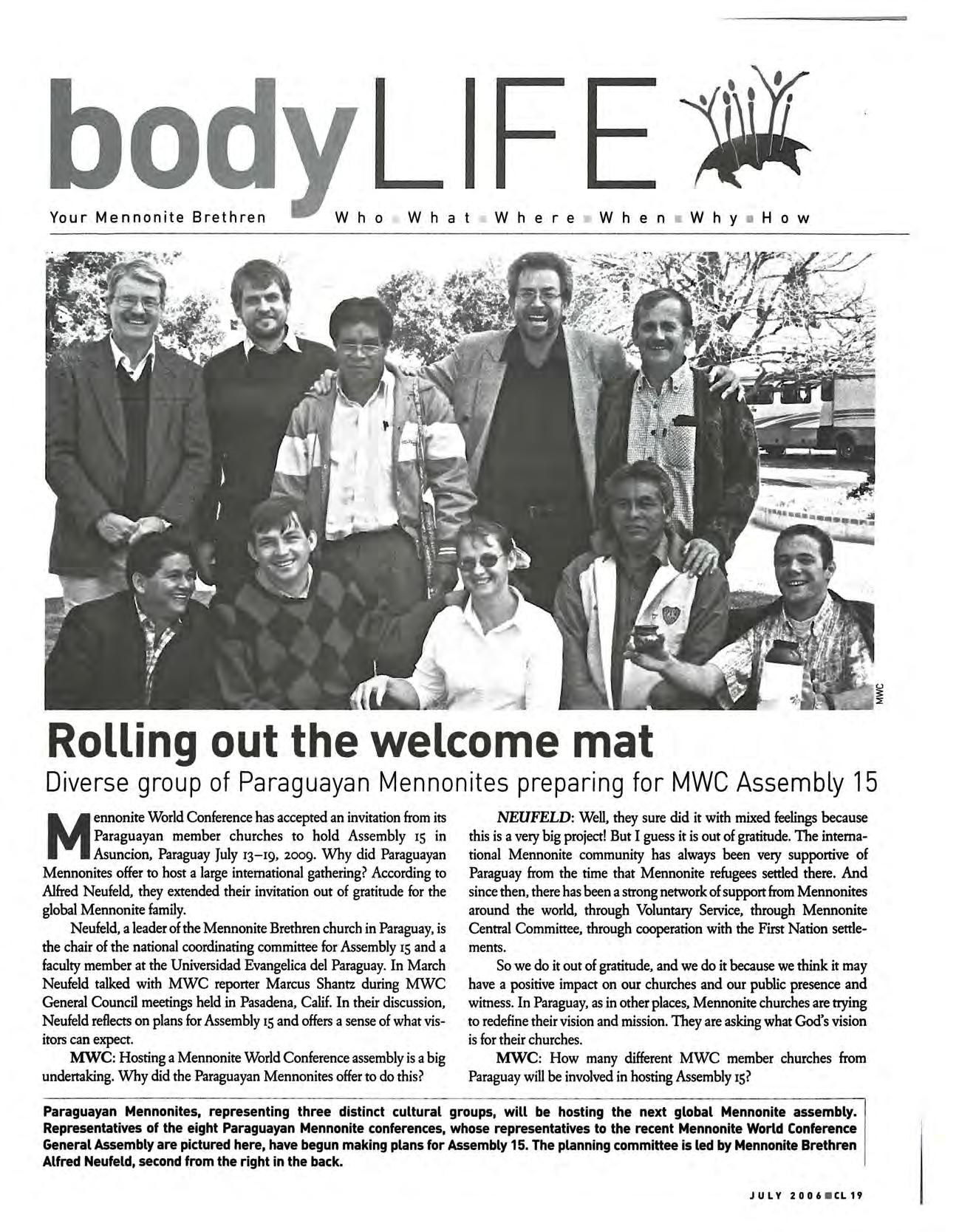
NEUFELD: Well, they sure did it with mixed feelings because this is a very big project! But I guess it is out of gratitude. The international Mennonite community has always been very supportive of Paraguay from the time that Mennonite refugees settled there. And since then. there has been a strong network of support from Mennonites around the world, through Voluntary Service, through Mennonite Centtal Committee, through cooperation with the First Nation settlements.
So we do it out of gratitude, and we do it because we think it may have a positive impact on our churches and our public presence and witness. In Paraguay, as in other places, Mennonite churches are trying to redefine their vision and Inission. They are asking what God's vision is for their churches.
MWC: How many different MWC member churches from Paraguay will be involved in hosting Assembly IS?
Paraguayan Mennonites, representing three distinct cultural groups, will be hosting the next global Mennonite assembly. Representatives of the eight Paraguayan Mennonite conferences, whose representatives to the recent Mennonite World Conference General Assembly are pictured here, have begun making plans for Assembly 15. The planning committee is led by Mennonite Brethren Alfred Neufeld, second from the right in the back.
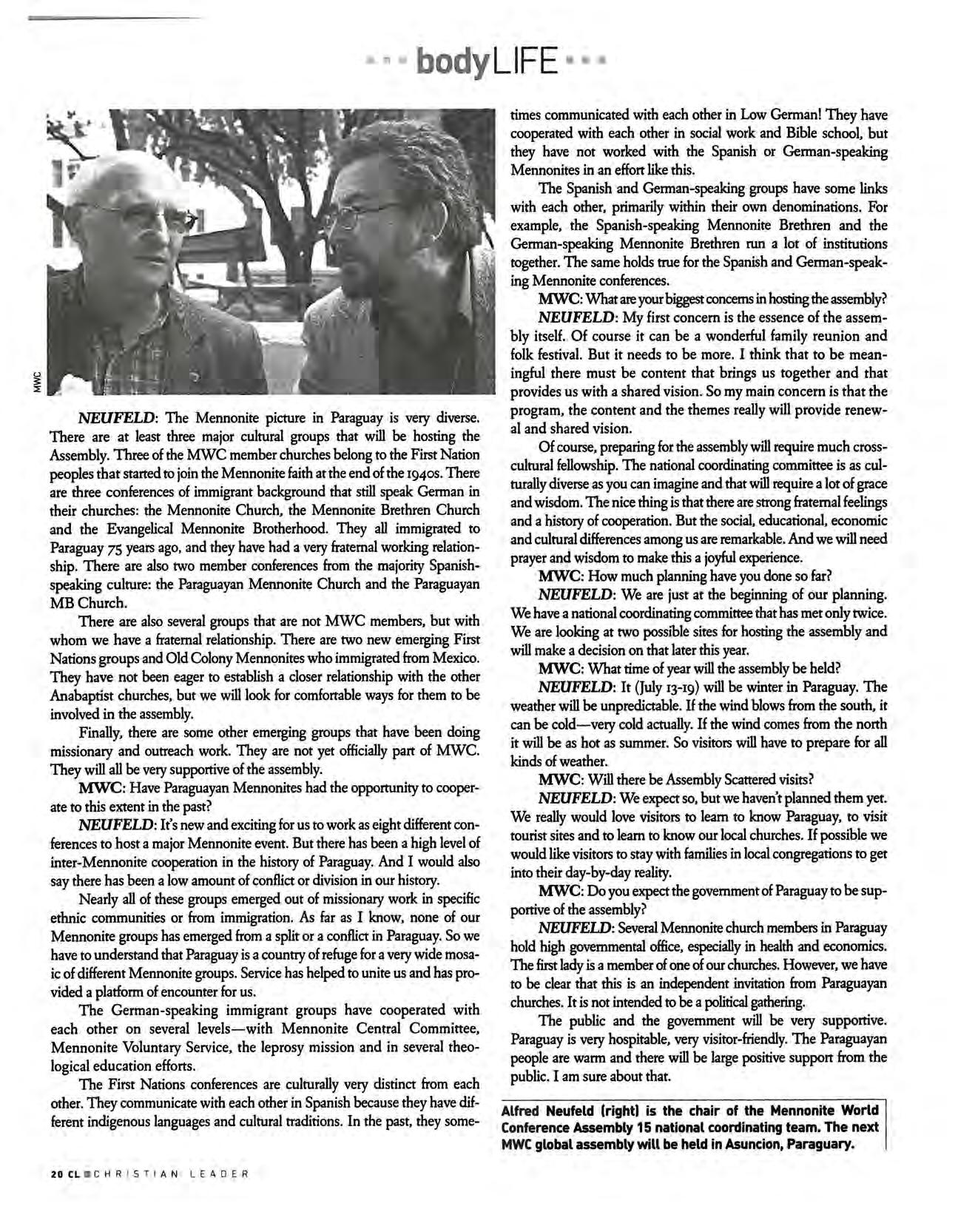
NEUFELD: The Mennonite picture in Paraguay is very diverse. There are at least three major cultural groups that will be hosting the Assembly. Three of the MWC member churches belong to the First Nation peoples that started to join the Mennonite faith at the end of the 1940s. There are three conferences of immigrant background that still speak German in their churches : the Mennonite Church, the Mennonite Brethren Church and the Evangelical Mennonite Brotherhood. They all immigrated to Paraguay 75 years ago, and they have had a very fratemal working relationship. There are also two member conferences from the majority Spanishspeaking culture: the Paraguayan Mennonite Church and the Paraguayan MBChurch.
There are also several groups that are not MWC members, but with whom we have a fratemal relationship. There are two new emerging First Nations groups and Old Colony Mennonites who immigrated from Mexico. They have not been eager to establish a closer relationship with the other Anabaptist churches, but we will look for comfortable ways for them to be involved in the assembly.
Finally, there are some other emerging groups that have been doing missionary and outreach work. They are not yet officially part of MWC. They will all be very supportive of the assembly.
MWC: Have Paraguayan Mennonites had the opportunity to cooperate to this extent in the past?
NEUFELD: It's new and exciting for us to work as eight different conferences to host a major Mennonite event. But there has been a high level of inter-Mennonite cooperation in the history of Paraguay. And I would also say there has been a low amount of conflict or division in our history.
Nearly all of these groups emerged out of missionary work in specific ethnic communities or from immigration. As far as I know, none of our Mennonite groups has emerged from a split or a conflict in Paraguay. So we have to understand that Paraguay is a country of refuge for a very wide mosaic of different Mennonite groups. Service has helped to unite us and has provided a platform of encounter for us.
The German-speaking immigrant groups have cooperated with each other on several levels-with Mennonite Central Commirtee, Mennonite Voluntary Service, the leprosy mission and in several theological education efforts.
The First Nations conferences are culturally very distinct from each other. They communicate with each other in Spanish because they have different indigenous languages and cultural traditions. In the past, they some-
times communicated with each other in Low German! They have cooperated with each other in social work and Bible school, but they have not worked with the Spanish or German-speaking Mennonites in an effort like this.
The Spanish and German-speaking groups have some links with each other, primarily within their own denominations. For example, the Spanish-speaking Mennonite Brethren and the German-speaking Mennonite Brethren run a lot of institutions together. The same holds true for the Spanish and German-speaking Mennonite conferences.
MWC: What are your biggest concerns in hosting the assembly?
NEUFELD: My first concem is the essence of the assembly itself. Of course it can be a wonderful family reunion and folk festival. But it needs to be more. I think that to be meaningful there must be content that brings us together and that provides us with a shared vision. So my main concern is that the program, the content and the themes really will provide renewal and shared vision . Of course, preparing for the assembly will require much crosscultural fellowship . The national coordinating committee is as culturally diverse as you can imagine and that will require a lot of grace and wisdom. The nice thing is that there are strong fraternal feelings and a history of cooperation. But the social, educational, economic and cultural differences among us are remarkable. And we will need prayer and wisdom to make this a joyful experience.
MWC: How much planning have you done so far?
NEUFELD: We are just at the beginning of our planning. We have a national coordinating committee that has met only twice We are looking at two possible sites for hosting the assembly and will make a decision on that later this year.
MWC : What time of year will the assembly be held?
NEUFELD : It (July 13-19) will be winter in Paraguay. The weather will be unpredictable. If the wind blows from the south, it can be cold-very cold actually. If the wind comes from the north it will be as hot as summer. So visitors will have to prepare for all kinds of weather.
MWC: Will there be Assembly Scattered visits?
NEUFELD: We expect so, but we haven't planned them yet. We really would love visitors to learn to know Paraguay, to visit tourist sites and to learn to know our local churches. If possible we would like visitors to stay with families in local congregations to get into their day-by-day reality.
MWC: Do you expect the government of Paraguay to be supportive of the assembly?
NEUFEW : Several Mennonite church members in Paraguay hold high governmental office, especially in health and economics. The first lady is a member of one of our churches. However, we have to be clear that this is an independent invitation from Paraguayan churches. It is not intended to be a political gatheting.
The public and the government will be very supportive. Paraguay is very hospitable, very visitor-friendly. The Paraguayan people are warm and there will be large positive support from the public. I am sure about that.
Alfred Neufeld (right) is the chair of the Mennonite World Conference Assembly 15 national coordinating team. The next MWC global assembly will be held in Asuncion, Paraguary.
Aecent survey of u.s Mennonite Brethren has resulted in a series of observations about the rela·onships between the u.s. Conference, its agencies and regional districts. Les Stahlke, a governance consultant hired by the u.s. Conference to guide the process of writing new USC bylaws, shared these observations in February with the USC Leadership Board as well as those attending the 2006 Leadership Summit in Phoenix, Ariz
Since the conference-wide survey included questions about the majority of ministties represented at the Leadership Summit, reviewing the results was of interest to

express a high commitment to the U.S. Mennonite Brethren Conference " He cites the following survey results:
79 percent agree that they are enthusiastic about the denomination.
• 96 percent accept and believe the MB Confession of Faith .
• 90 percent value their church's membership in the U S Conference
• 87 percent agree that their church should suppott the U.S. Conference financially
The second observation is related to respondents' awareness of the U.S. Conference. Survey respondents agree "moderately" regarding the effectiveness of U.S Conference services and "may also lack awareness the group. The annual Leadership Summit brings [J together lead staff members and board chairs of all national denominational ministries-MB Biblical
The re sults also hi ghli ght th e d jffi c ul ty church memb e rs ha ve in under standin g th e rel ation s hi p between th e national conferen ce other B entities .
Seminary, MBMS International and MB Foundation-and all district ministries-Tabor College and Fresno Pacific University along with representatives of the five district conferences.
The 33-question survey was mailed to everyone who attends a U.S Mennonite Brethren church and is on the Christian Leader mailing list. A total of 9,800 surveys were sent. In spite of an unforeseen mailing delay, u .S. Conference administrative assistant Donna Sullivan reports that 1,350 surveys were returned, most via U S mail; the option of replying online was not widely used
"Based on the total number of possible respondents, " says Stahlke in his written repott, "this level of response is well above the minimum required for a statistically reliable sample "
The demographics included age group, duration of Mennonite Brethren church membership , district conference membership and gender Of those who responded to the survey, 70 percent are 50 years old and above and 66 percent have been affiliated with the Mennonite Brethren church for more than 20 years.
Stahlke shared five observations with denominational leaders that he says affirm the ongoing ministry of the U S. Conference The results also highlight the difficulty church members have in understanding the relationship between the national conference and other MB entities.
Stahlke's first observation is that "survey respondents
of the services," says Stahlke.
'There is the possibility that the churches and the people in the churches don't know about you (the U S. Conference,)" Stahlke told the Leadership Board. 'They may not be sure who you are "
This second observation is based on replies to six questions about the denomination and its relationship with individuals, the local church and other denominations.
39 percent repott they receive "meaningful support" for their spiritual lives from the U.S Conference.
• 58 percent agree that the U.S. Conference relates to the wider Christian churches appropriately on behalf of the churches
. 55 percent agree that the U.S . Conference provides a positive corporate identity that is well respected by other churches across the U S
• 63 percent agree that the U.S . Conference serves as a hub of information for the churches.
• 64 percent agree that the U.S. Conference benefits them with a national spiritual family.
. 59 percent agree that the conference provides them with access to leadership and assistance when dealing with issues and circumstances that surface as they attempt to minister to their communities.
'The Christian Leader is an effective communication tool for strengthening the commitment to the U.S Conference and for building a sense of denominational community," says Stahlke in his third observation.
The survey shows that:
• 69 percent of the respondents read the magazine.
• 69 percent agree that "the Christian Leader makes me feel a part of the U.S. Conference."
• 81 percent agree that the MBMS International magazine Witness that is regularly insetted in the Leader "helps me understand MB missions work."
A series of five questions led Stahlke to his foutth observation : 'The commitment to the Confession of Faith remains strong. but the commitment to the process of keeping it strong through the Board of Faith and Life and the
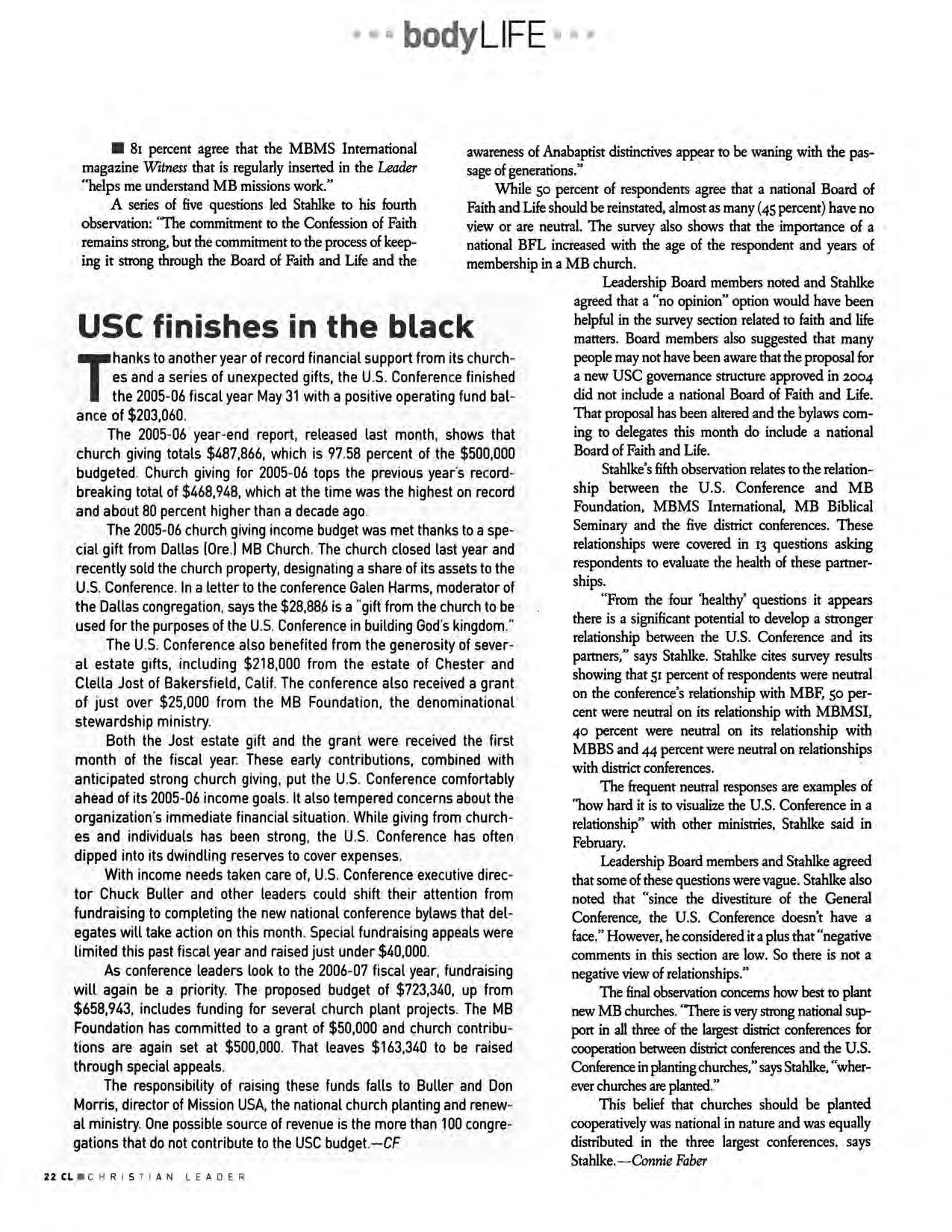
awareness of Anabaptist distinctives appear to be waning with the passage of generations."
While 50 percent of respondents agree that a national Board of Faith and Life should be reinstated, almost as many (45 percent) have no view or are neutral. The survey also shows that the impottance of a national BFL increased with the age of the respondent and years of membership in a MB church.
Thanks to another year of record financia l support from its churches and a series of unexpected gifts, the U S Conferen ce finished the 2005 - 06 fiscal year May 31 with a pos itive operating fund balan ce of $203,060 .
The 2005 -06 year - end report , released last month , shows that church giving totals $487,866, which is 97 .58 percent of the $500,000 budgeted Church giving for 2005 -06 tops the previous year 's re cordbreaking total of $468,948, whi ch at the time was the highest on record and about 80 percent higher than a decade ago
The 2005 -06 church giving income budget was met thanks to a special gift from Dallas (Ore.) MB Church The church closed last year and recently sold the church property, designating a share of its assets to the U.S Conferen ce In a letter to the conference Galen Harms, moderator of the Dallas congregation , says the $28,88(, is a "gift from the church to be used for the purposes of the U S Conferen ce in building God 's kingdom ."
The U S Conferen ce also benefited from the generosity of several estate gifts, including $218,000 from the estate of Chester and Clella Jost of Bakersfield, Calif The conference also received a grant of just over $25,000 from the MB Foundation, the denominational stewardship ministry
Both the Jost estate gift and the grant were received the first month of the fiscal year These early contributions, combined with anticipated strong church giving , put the U.s Conference comfortably ahead of its 2005 -06 income goals It also tempered concerns about the organization 's immediate financial situat ion While giving from churches and individuals has been strong , the u.s . Conferen ce ha s often dipped into its dwindling reserves to cover expenses
With income needs taken care of, U.S. Conferen ce exe cutive director Chuck Buller and other leaders cou l d shift their attention from fundraising to completing the new national conference bylaws that delegates will take act ion on this month Spe ci al fund raising appeals were limited this past fis cal year and raised just under $40,000
As conference leaders look to the 2006 - 07 fisca l year, fundraising will again be a priority The proposed budget of $723,340, up from $658,943, includes funding for several church plant projects . The MB Foundation has committed to a grant of $50,000 and church contributions are again set at $500 ,000 . That leaves $163,340 to be raised through special appeals
The responsibility of raising these funds falls to Buller and Don Morris , director of Mission USA, the national church planting and renewal ministry One possible source of revenue is the more than 100 congregations that do not contribute to the USC budget. - CF
Leadership Board members noted and Stahlke agreed that a "no opinion" option would have been helpful in the survey section related to faith and life matters. Board members also suggested that many people may not have been aware that the proposal for a new USC governance structure approved in 2004 did not include a national Board of Faith and Life. That proposal has been alteted and the bylaws coming to delegates this month do include a national Board of Faith and Life.
Stahlke's fifth observation relates to the relationship between the U .S. Conference and MB Foundation, MBMS International, MB Biblical Seminary and the five district conferences These relationships were covered in 13 questions asking respondents to evaluate the health of these pattnerships.
"From the four 'healthy' questions it appears there is a significant potential to develop a stronger relationship between the U.S . Conference and its pattners," says Stahlke. Stahlke cites survey results showing that 51 percent of respondents were neutral on the conference's relationship with MBF. 50 percent were neutral on its relationship with MBMSI, 40 percent were neutral on its relationship with MBBS and 44 percent were neutral on relationships with district conferences.
The ftequent neuttal responses are examples of ''how hard it is to visualize the U.S. Conference in a relationship" with other ministries, Stahlke said in February.
Leadership Board members and Stahlke agreed that some of these questions were vague. Stahlke also noted that "since the divestiture of the General Conference, the U S. Conference doesn't have a face." However, he considered it a plus that "negative comments in this section are low So there is not a negative view of relationships."
The final observation concerns how best to plant new MB churches 'There is very strong national suppott in all three of the largest district conferences for cooperation between district conferences and the U.S. Conference in planting churches," says Stahlke, "wherever churches are planted."
This belief that churches should be planted cooperatively was national in nature and was equally distributed in the three largest conferences, says Stahlke. - Connie Faber
The cattle on a thousand hills belong to God, according to Psalm 50:10. Some Mennonite Brethren farmers and ranchers take that literally, needing only to look to their own pastures to see God's missionary cattle. That's because they participate in STEER, Inc., an interdenominational, agricultural mission fundraising program popular in the cattle country of the Central District Conference.
For Sam Ortman, a member of Lustre (Mont ) MB Church, involvement in STEER began a dozen years ago when a missionary aunt found herself in need of more support. Ortman agreed to run a cow that was purchased by a donor and placed by STEER. He donated his labor and pasture to raise the calf born of that cow, and when the calf was sold the proceeds supported the aunt
The white cow stood out in Ortman's black herd, a visual reminder of the importance of giving to missions. The family even named the cow after the missionary aunt to strengthen that connection for the family's young children.
"When we saw that cow, it represented a cow whose calf was going to missions," Ortman says
The next year and the next brought another calf and another donation toward missions Ortman now has six STEER cows in his herd and is an area representative for the organization.
The STEER concept is based on the three-part teamwork of donors, ranchers or farmers and missions agencies. The giving begins when an individual or a group such as a congregation purchases a $700 "unit." A unit typically consists of a bred cow but could also be other livestock or crops.
STEER then places the unit with a Christian rancher or farmer who donates labor and feed to raise the calf born of that cow. If the unit is in the form of land or crops, STEER provides funds for seed, gas, fertilizer and chemicals, while the farmer donates land and labor. At the end of the season when the calves or crops are

sold, the proceeds go through STEER to a designated mission agency.
Bible Fellowship Church, Rapid City, SD, first became involved in STEER in 1991 when their vacation Bible school chose to purchase two units as their missionary offering. Junior high students made and sold two quilts with a western theme, which fit with the VBS theme that year, to raise the funds. Bible Fellowship now has seven units funded by VBS or missions offerings, all designated for MBMS International, the global mission agency of North American Mennonite Brethren.
Once the original unit is placed with a farmer or rancher, each season means a new calf or crop and a new donation to missions. Over the years, those donations add up.
For the Rapid City church, records show a satisfying increase in giving over the years The church's units gained more than $5,000 in the past fiscal year.
Bible Fellowship Church, Minot, ND, purchased four STEER units years ago, when the initial cost for each unit was $600. Over the years that initial investment of $2,400 has multiplied to over $21,000 in proceeds for missions.
STEER's unique approach means that the donor's initial investment is perpetual, producing money for missions year after year. STEER guarantees and insures each unit so that the donor is guaranteed a continual return on their original investment. If a unit dies or depreciates, STEER's insurance fund kicks in. When Ortman 's original white cow was struck by lightning, for example, STEER replaced her with another cow so that the cycle of giving would continue
STEER keeps a percentage of the funds raised to pay for this insurance and for administration-a percentage that is continually decreasing as STEER finds ways to reduce operating costs.
Because the original investment is guaranteed in this way, the unit can continue to support missions long after the donor is gone STEER reports that the Sawyer (ND) MB Church once purchased units designated for MBMSI. Although the Sawyer church closed its doors in 1993, that investment continues to generate funds for MBMSI.
The donor can choose a mission agency from STEER's list of approved mission societies, or can designate their unit as "rotational," which allows STEER to place the unit where it is most needed. The STEER Web site lists 89 agencies that benefit from the program, including MBMS International.
STEER participants raise cattle and crops and then forwa rd the proceeds to mission agencies including MBMS International.

STEER reports that from July I, 2005 through May 31, 2006, STEER sent over $10,000 to MBMSI, bringing the total money sent to MBMSI from STEER over the years to nearly $127,000. MBMSI distributes those funds to specific MBMSI missionaries and to the Central District Conference, where they are channeled to ethnic ministries within the district.
MB farmers and ranchers who participate in STEER say that the benefits outweigh the extra effort. Kenny Kirby, of Grace Bible Church, Gettysburg, SD, says he simply puts his STEER cows in with the rest of his herd. For that small extra effort, he gets to support missions. And he says that because the cows are in his herd season after season, his giving to missions stays firm regardless of economic swings :
Marlin Reddig, from Gospel Fellowship Church, Wolf Point, Mont., has run anywhere from five to seven cows with the STEER brand over the IS or so years he's been involved. He says that, although the STEER cows haven't seemed like extra effort at the time, they've raised well over $30,000 for missions.
Ultimately the measurable funds are only part of the reward. Sam Ortman points out that the money given to missions has an eternal reward that cannot be measured. The missionary aunt that inspired his first involvement in STEER-or other missionaries that have benefited since-may have reached more people than he knows. <We have no idea what is going to be in eternity because we ran a cow," he says.-by Myra Holmes
For more information on the STEER program, visit their Web site at www.steerinc.com or call 701 -258-49 11
Hendro was eating a breakfast of rice porridge just before 6 a.m May 27 when his house suddenly began shaking. The porridge was thrown to the floor and the ceiling started caving in.
Realizing an earthquake was occurring, he ran out of his house. He fell several times because the ground was moving. When he reached his yard, he lay down and watched the trees shake and the roof and walls of his house collapse. Then he realized that not only his house, but all of the buildings in his neighborhood of Sragen Village in Pundong, Indonesia, were being demolished. Hendro listened to the screams of neighbors as their houses collapsed on them.
Hendro's wife, Mugiyem, ran to him, crying about the destruction of their house. But she soon calmed down and told him it was a blessing that they had both survived.
When it was over, the magnitude 6.3 earthquake left more than 6,200 dead and hundreds of thousands homeless on the Indonesian island of Java. The quake is Indonesia's worst disaster since the 2004 tsunami and comes as residents watch for the threatened eruption of Mt. Merapi.
"Unlike the tsunami, this disaster happened in an area where there are Indonesian Mennonite congregations," says Jeanne Jantzi, a Mennonite Central Committee country representative for Indonesia. MCC is the relief, peace and service agency of North American Mennonite and Brethren in Christ churches.
Although central Java is predominantly Muslim, the region is also home to the majority of Indonesia's Mennonites. Indonesia has three Mennonite conferences with a combined membership of more than 87,000, according to Mennonite World Conference. <This is an important
Hendro (left) and Mugiyem, a Mennonite couple in Pundong, Indonesia, fled their house as it collapsed in a May 27 earthquake. They are living in a tent and receiving food and supplies from humanitarian groups, including Indonesian Mennonite churches.
time to support the relief efforts of the churches to people of all faiths who live in the affected area," Jantzi says.
Reports of the quake's destruction are sobering. 'The scene is precisely as horrible as what I saw in Aceh 16 months ago," said Abang Rahino of MCC Indonesia in a report May 29. Rahino says the entire Pundong Disrrict has been "flattened" by the earthquake. "No single building was left untouched. Ninety percent of the buildings in the area were destroyed."
One Mennonite Church in Pundong was especially hard-hit: "So far we have identified six casualties among our congregation here: four adults and two children," reported Indonesian Mennonite leader Paulus Widjaja June I. The pastor of the church, Daniel Sobari, suffered a fractured leg when the roof of his house collapsed as he was trying to escape. The quake damaged the homes of all 41 families from the church; 38 of them heavily damaged and only three lightly damaged. Reports from other Mennonite churches in central Indonesia indicate damaged homes and church buildings, but no further deaths of members.
Mennonites in the area mobilized quickly following the disaster. Mennonite Diakonia Service has set up a command center in the Pundong District, the area hit hardest by the quake.
The Diakonia Service first identified "refugee cluster points" where it focused its response ministries, including providing medical treatment and distributing food staples, blankets, used clothing and personal care items.
A medical tent was set up at the command center for patients able to come there Severely injured victims unable to travel received treatment at th e cluster points. Follow-up care is also being provided.
Mennonites are also offering trauma healing for adults through village gatherings and activities such as cleaning up debris. Traumatized children can come to two "Happy Tents," safe havens where they can play for two hours mornings and afternoons . Long-term goals include reconstructing homes for 100 families and schools in Pundong destroyed by the quake and providing economic empowerment so that victims can reestablish a livelihood. Mennonite Diakonia Service plans to buy coconuts and rice harvested by quake victims The rice will be processed by manually operated machines and used in its food distribution program.
MCC is appealing to its constituents for $265,000 to help Indonesian Mennonites and humanitarian organizations assist earthquake survivors . MCC has initially provided about $13,700 for the relief work of three partner organizations.
Quake survivors Hendro and Mugiyem are among those receiving food from Indonesian Mennonite volunteers who came to Pundong after the earthquake. Another humanitarian group gave the couple a tent to serve as a temporary shelter. Before the earthquake, Hendro earned a living by delivering water by hand to households in his village. In his deliveries, he would also distribute New Testaments and volunteered as a lay evangelist for his Indonesian Mennonite church. But now Hendro's neighbors are unable to hire him and he cannot find work.
Hendro told MCC staff member Abang Rahino that he is still traumatized. 'Tm still really scared now, even when a minor earthquake comes, or a little bit hard wind blows the trees in this village," Hendro said.
For the latest on the Indonesian earthquake, see www.mcc.orgljavaearthquake/. -from reports by MCC and MWC
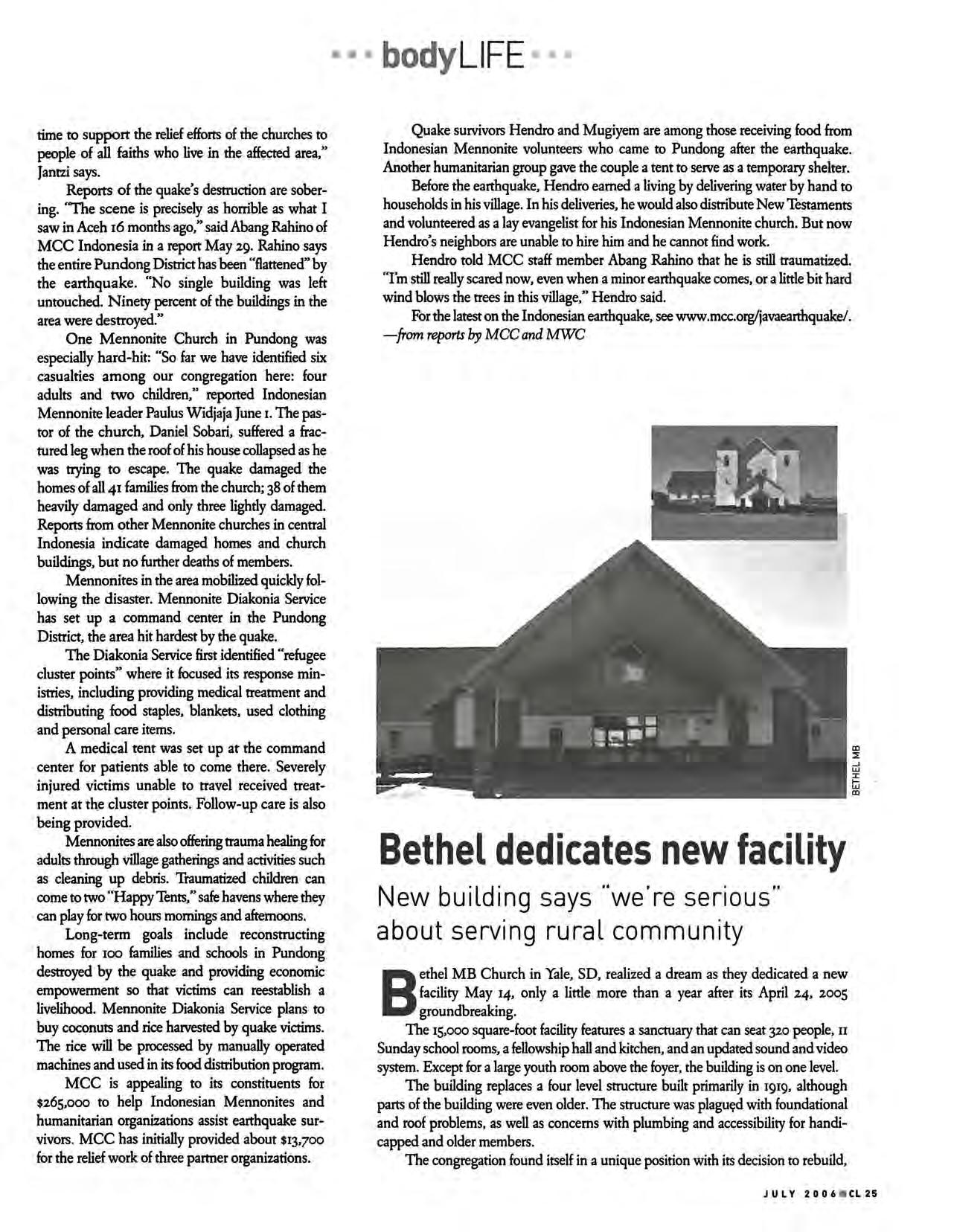
Bethel MB Church in Yale, SD, realized a dream as they dedicated a new facility May 14, only a litrle more than a year after its April 24, 2005 groundbreaking.
The 15,000 square-foot facility features a sanctuary that can seat 320 people, II Sunday school rooms, a fellowship hall and kitchen, and an updated sound and video system. Except for a large youth room above the foyer, the building is on one level.
The building replaces a four level structure built primarily in 1919, although parts of the building were even older. The structure was plagucyd with foundational and roof problems, as well as concerns with plumbing and accessibility for handicapped and older members.
The congregation found itself in a unique position with its decision to rebuild,
since many rural churches consider consolidating or closing as more people choose to live in cities.
'We do not feel just because we are a rural church that we need to just wait to die out," says Lud Hohm, chairman of the board of elders as well as a member of the building committee. 'There are more people in our community to reach out to than most people realize."
Hohm notes that members faithfully drive as much as 70 miles to attend Bethel.
The congregation initially voted to remodel the facility, but soon found that greater changes were in order. The old facility will be salvaged and surplus items have been sold at auction.
"The church as a whole has really been behind the project," says Hohm. "Even our eldest members have been for the project even though they have so many wonderful memories of the old church."
Ernie Lambright, who has served as pastor at Bethel for less than a year. calls the unity of the body "a blessing for a new pastor."
He is not the only one to be overwhelmed by the way God is blessing Bethel MB Church.
"It seemed like we needed to pinch ourselves to believe we were actually worshiping in our new church in only 13 months," says Hohm. 'We have been blessed so much."
Dedication Sunday was marked by worship, reflection and encouragement to the members to continue with the mission of the church
"It was a great time of singing and praising God for what he did in the last loo-plus years," says Hohm. According to Hohm, the old church building is a place where 'bundreds of lives have been changed for eternity "
Three sermons were preached, the first in the old building during the 9:30 a.m. service. Phil Glanzer, who grew up in the Bethel MB Church, emphasized God's work in the church's past as well as in individual lives. Glanzer urged the congregation to leave negatives behind with the old building as they make a new start.
At the conclusion of the first service, the congregation journeyed to the new building,
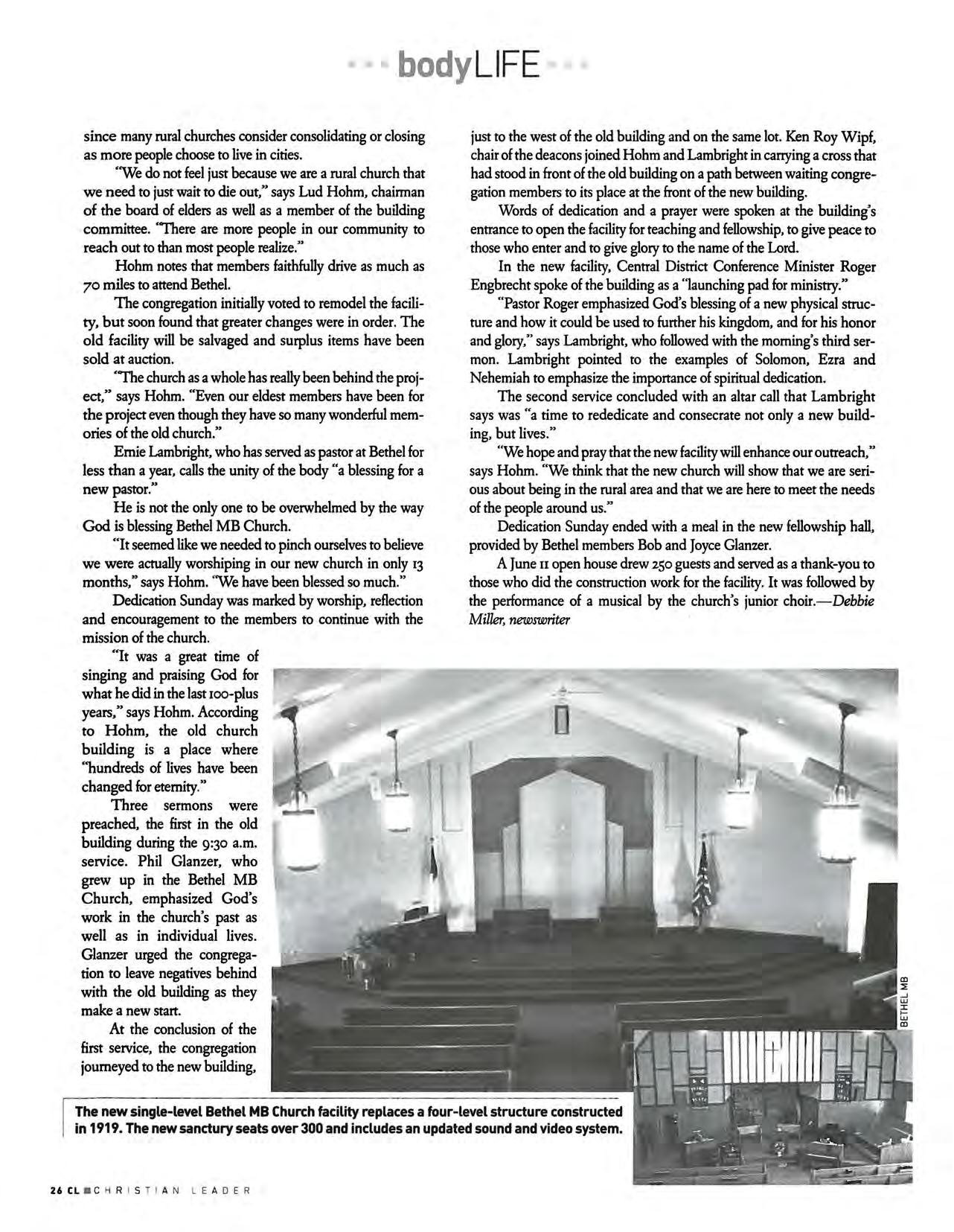
just to the west of the old building and on the same lot. Ken Roy WipE, chair of the deacons joined Hohm and Lambright in carrying a cross that had stood in front of the old building on a path between waiting congregation members to its place at the front of the new building.
Words of dedication and a prayer were spoken at the building's entrance to open the facility for teaching and fellowship, to give peace to those who enter and to give glory to the name of the Lord.
In the new facility, Central District Conference Minister Roger Engbrecht spoke of the building as a 'launching pad for ministry."
"Pastor Roger emphasized God's blessing of a new physical structure and how it could be used to further his kingdom. and for his honor and glory," says Lambright. who followed with the morning's third sermon . Lambright pointed to the examples of Solomon, Ezra and Nehemiah to emphasize the importance of spiritual dedication.
The second service concluded with an altar call that Lambright says was "a time to rededicate and consecrate not only a new building, but lives."
"We hope and pray that the new facility will enhance our outreach," says Hohm. "We think that the new church will show that we are serious about being in the rural area and that we are here to meet the needs of the people around us."
Dedication Sunday ended with a meal in the new fellowship hall, provided by Bethel members Bob and Joyce Glanzer.
A June II open house drew 250 guests and served as a thank-you to those who did the construction work for the facility. It was followed by the performance of a musical by the church's junior choir.-Debbie Miller, newswriter
We welcome ' . appreCIate y ' " generous support of Mission USA.
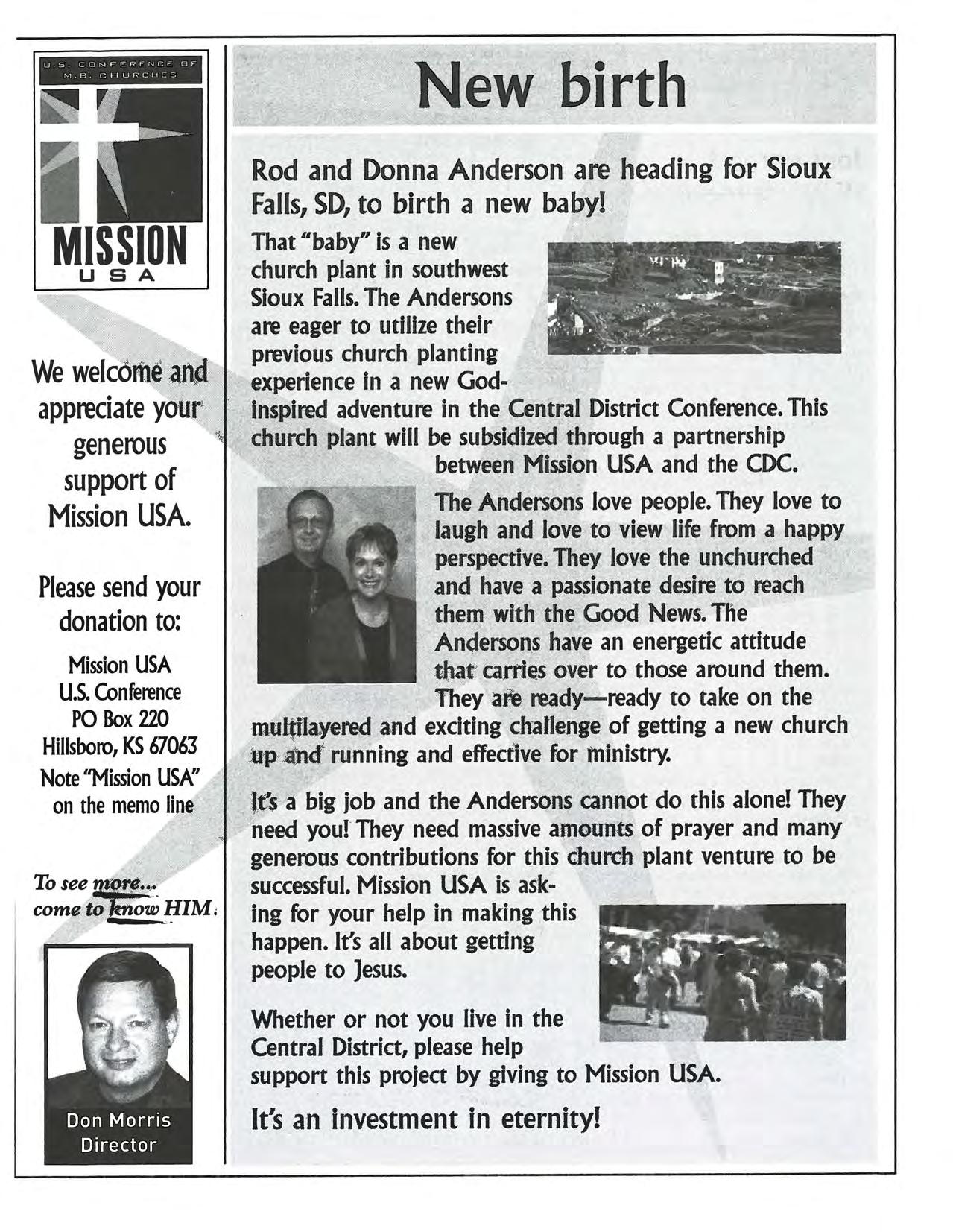
Rod and Donna Anderson are heading for Sioux Falls, SO, to birth a new baDY!
That "baby" is a new church plant in southwest Sioux Falls. The Andersons are eager to utilize their previous church planting experience in a new God- , (n'spired adventure in the Central District Conference. This church plant will be subsidized through a partnership between Mission USA and the CDC.
l'he Andersons love people. They love to laugll and loye ,to vlew fo life from a happy They love the unchurched
Please send your and have a passionate desire to reach c donation to: them with the Good News. TIle Anc;ierson,s have an energetic attitude Mission USA .• at carries over to those around them. u.S. Conference • , They are reaCly-ready to take on the PO Box 220 }}ltlJtllayered and exciting of getting a new church Hillsboro, KS 67063 i JJp;W running and effectlve for ministry. Note "Mission USA" 4 ' on the memo line It's '3 big job and the Andersons cannot do this alonel They t()1iftow HIM. 1 need you!' They need massive amounts of prayer and many generous contributions for this church plant venture to be successful. Mission USA is asking for your help in making this happen. It's all about getting people to Jesus.
Whether or not you live in the Central District, please help support this project by giving to Mission USA. It's an investment in eternity!
new u.s. staff members have recently been hired by MBMS International. the Canadian and U.S. Mennonite Brethren global mission agency. Craig Jost will begin Sept. I as the Midwest regional mobilizer Andi Baier began July I as the short-term mission coordinator for the Pacific District Conference.
Jost and his wife Fabiana recently returned from Portugal where they served with MBMSI as church planters. "Craig and Fabiana bring to this role the values of shortterm and long-term mission experience and commitment." says Carlin Weinhauer in a May 18 e-mail to U.S. MB churches. 'We are pleased the Lord has prepared the Josts to be instrumental in raising up a new generation of short-term and long-term missionaries from among our MB churches in the Midwest."
Jost served for six years with MBMSI in Brazil. graduated from MB Biblical Seminary in 1998 and then served another six years in Portugal. Craig. Fabiana and their two children. Josiah and Megan. will be living in Wichita. Kan. Jost will work from the MBMSI office in Wichita.
This month Baier began working with Ron Penner. West Coast regional mobilizer. in the Fresno. Calif.• MBMSI office. She is a graduate of Fresno State University and MB Biblical Seminary. She has worked as the director of campus ministries at Fresno Pacific University. '1\ndi has relational. leadership and evangelistic gifts." says Sam Dick. the regional mobilizer for Western Canada and TREK director. "She will provide a strong connection with the students at FPU as well as Pacific District Conference youth groups. It has been exciting to see her exercise these passions as an alumnus of several MBMSI short-term mission programs."
Baier was a member of the MBMSI ACfION team to Thailand this past year and for the past seven months had been leading a TREK team in Germany.-from MBMSI reports

Saving on has with the high cost of fuel lnore critical than ever. The documente8 cotR.p arisons show you the big savings on Homeowners Insurance for members or regv:lar attenders of a Mennonite church. No mid4:Jeman. We're the only agents for the Mennonite Aid Plan. We also work directly with other A-rated companies, enabling us to offer Auto** (and other) insurance at huge savings to responsible drivers and fa ptilies -(Jv;itt\ teenage drivers. Free quotes immediately Simply contact us today!
Rock wallabies are small kangaroos, brown in color, approximately 18 inches tall . They are quite cute, even at close range. I know, since I had a close encounter with one recendy.
We were at a motel in central Australia near the rock formation where a colony of these unique animals lives. The motel sells small bags of pet food and invites guests to feed the wallabies in the evening. With food pellets in hand I sat on the cement curbing at the foot of the hill and waited
At first none of the wallabies appeared interest-
ed in my food. Then suddenly one of the males dart- [] ed across the rocks and made a beeline for my hand. He grabbed my fingers with his short front legs, sat
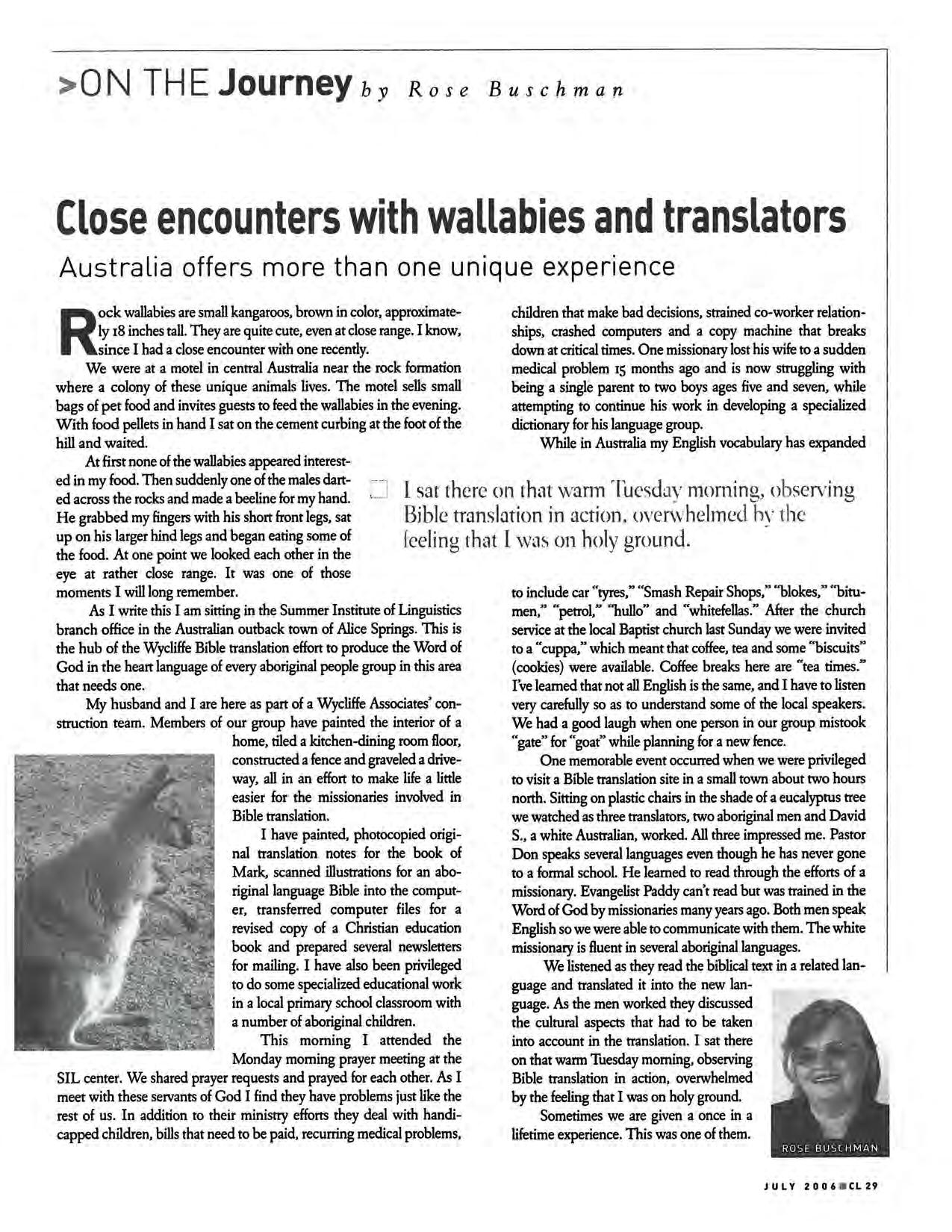
children that make bad decisions, strained co-worker relationships, crashed computers and a copy machine that breaks down at critical times One missionary lost his wife to a sudden medical problem 15 months ago and is now struggling with being a single parent to two boys ages five and seven, while attempting to continue his work in developing a specialized dictionary for his language group.
While in Australia my English vocabulary has expanded
I sat there on ' thM warm 'luesd ..ry morning, observing Bible translation in action, overwhelmed h v th e up on his larger hind legs and began eating some of the food . At one point we looked each other in the
!-eeling that I W,lS on holy ground. .
eye at rather close range. It was one of those moments I will long remember.
As I write this I am sitting in the Summer Institute of Linguistics branch office in the Australian outback town of Alice Springs This is the hub of the Wycliffe Bible translation effort to produce the Word of God in the heart language of every aboriginal people group in this area that needs one.
My husband and I are here as part of a Wycliffe Associates' construction team. Members of our group have painted the interior of a home, tiled a kitchen-dining room floor, constructed a fence and graveled a driveway, all in an effort to make life a lime easier for the missionaries involved in Bible translation.
I have painted, photocopied original translation notes for the book of Mark, scanned illustrations for an aboriginallanguage Bible into the computer, transferred computer files for a revised copy of a Christian education book and prepared several newsletters for mailing. I have also been privileged to do some specialized educational work in a local primary school classroom with a number of aboriginal children.
This morning I attended the Monday morning prayer meeting at the SIL center We shared prayer requests and prayed for each other. As I meet with these servants of God I find they have problems just like the rest of us . In addition to their ministry efforts they deal with handicapped children, bills that need to be paid, recurring medical problems,
to include car "tyres," "Smash Repair Shops," 'blokes," 'bitumen," "petrol," 'nullo" and "whitefellas." After the church service at the local Baptist church last Sunday we were invited to a "cuppa," which meant that coffee, tea and some "biscuits" (cookies) were available. Coffee breaks here are "tea times ." I've learned that not all English is the same, and I have to listen very carefully so as to understand some of the local speakers We had a good laugh when one person in our group mistook "gate" for "goat" while planning for a new fence
One memorable event occurred when we were privileged to visit a Bible translation site in a small town about two hours north . Sitting on plastic chairs in the shade of a eucalyptus tree we watched as three translators, two aboriginal men and David S , a white Australian, worked All three impressed me. Pastor Don speaks several languages even though he has never gone to a formal school. He learned to read through the efforts of a missionary. Evangelist Paddy can't read but was trained in the Word of God by missionaries many years ago. Both men speak English so we were able to communicate with them. The white missionary is fluent in several aboriginal languages.
We listened as they read the biblical text in a related language and translated it into the new language As the men worked they discussed the cultural aspects that had to be taken into account in the translation I sat there on that warm Tuesday morning , observing Bible translation in action, overwhelmed by the feeling that I was on holy ground
Sometimes we are given a once in a lifetime experience This was one of them
QAre we missing something in the church when we do not give more attention to the celebration of religious events or seasons like Ash Wednesday or Lent? (Kansas)
AThis inquirer says she attended a Shrove (Fat) Tuesday home celebration where an assortment of goodies·ncluding tasty doughnuts laden with frosting-was served. those unfamiliar with the church year, let me quickly summanze. Shrove or Fat Tuesday is the day before Ash Wednesday and Ash Wednesday marks the

order to create spiritual sensitivity. Opus Dei founder Josemaria Escriva writes: "Blessed be pain. Love be pain. Sanctified be pain. Glorified be pain." He also writes: "No ideal becomes a reality without sacrifice Deny yourself. It is so beautiful to be a victim!" Escriva cites the actions of various church leaders: St. Francis of Assisi rolling in the snow, St. Benedict throwing himself into a thombush and St. Bernard plunging into an icy pond.
I'm quite aware that these examples are more extreme than wearing a rock in your shoe. And the inquirer is not beginning of Lent. The 40 days of Lent end with Easter Sunday. Since it was Fat Tuesday she enjoyed the refreshments, but she resolved that the next day she would abstain from such rich foods.
l\iennonile Brethren churc hes in ge neral do a very poor job ot observing the church year.
A large basket of rocks also sat with the food. A small sign suggested each diner select a rock and wear it in hislher shoe during Lent. This rock would cause the wearer to concentrate on Christ's suffering and death. The inquirer. placed a rather fiat, smooth stone in one shoe kept it there for 40 days. She says that it repeatedly reminded her to be thankful for the suffering of Jesus on her behalf This experience led to the question posed above.
I received this letter at the same time that I was reading about the controversial Da Vinci Code book and movie. While Protestants have been insulted by author Dan Brown's idea that Jesus married Mary Magdalene and fathered children, Roman Catholics reacted strongly to his depiction of a Catholic organization called Opus Dei.
Opus Dei members, numbering 3,000 in the u S. and 85,500 worldwide, live together in many semi-cloistered communities and endure a rigorous course of spiritual "formation" stressing church doctrine and contemplation . The Da Vinci Code suggests they go to extremes even so far as to murder. Opus Dei followers deny this.
What struck me in my reading is that Opus Dei uses acts of "corporal mortification" in its strict discipline. In other words, members voluntarily punish themselves physically in
Have a about a Bible passage, doctrine, conference policy or other spmtual ISSUe? Send your question to "Inqu iring Minds," c/o Marvin Hein, 3036 East Magill Avenue, Fresno, CA 93710 or e-mail Marvin at marvinhein@sbcglobal net.
suggesting she became more spiritual through this exercise. But the rock caused her to more often ponder Christ's suffering. Yet in SOme small sense the stone in the shoe is a form of self-mortification.
There are dangers in such rituals of self-mortification. Even the radical Opus Dei acknowledges that and governs such activities rather closely. So should you wear stones in your shoes during Lent? I'm not prepared to make that judgment. But I do have strong feelings about our observance of certain holidays.
Mennonite Brethren churches in general do a very poor job of observing the church year . In late May our congregation observed Memorial Day during the worship service. June 4 the only mention of Pentecost was a very brief reference in a prayer that most will have missed Which is more important: remembering those who have died in the past or celebrating the coming of the Holy Spirit who gives life?
Advent, Lent, Pentecost-all these and more can become mere rituals. But it is equally true that ignoring them is spiritually irresponsible. Individuals may choose whether or not to wear stones in their shoes. It seems to me that churches, on the other hand, are under compulsion to make more of the strategic events in the church year calendar.
Even the observance of the Lord's Supper nowadays often appears to be little more than a quick add-on to the other ingredients in the service. In my mind it is hard to meditate, remember and be thankful in a hurry! I vote for more deliberate celebration, even ritual, not less.
BAPTISM/MEMBERSHIP
Edmond, Okla. IMemorial Roadl-Angela Wahl was baptized June 11. She and husband Brian were received as members.
Dinuba, CaUf.-Jinsoo Hwang was baptized and received as a member May 28.
Bakersfield, Calif. ILaurelglenl-Bill and Lilian Atkinson, Doug and Phyllis Barker, Shawn a Herrold, Brodie and Allison McClain, Jason Tyner and Archie Webb were received as members June 3-4. Janelle Gibson, Shawna Herrold, Nicholas Herndon, Krystan Lallo, Jason Tyner, Joshua Webb and Jacob Webb were baptized May 27-28.
Blaine, Wash. IBirch Bayl-Cecil Robinson, Erica Eytzen, George Lloyd, Laurence Lotte, Maritia Spry, and Michael Flittie were baptized and received as members May 21.
Buhler, Kan.-Daniel Friesen and Liz Schmidt were baptized and received as members May 21. Eileen Hoskinson, Gene Krenzin, Jeanette Krenzin, Dean Nisly, Anita Nisly, Erik Ober, Don Reimer, Judy Reimer and Jake Schmidt were also received as members May 21. Katrina Hughes, Kylee Kirchoff, Katey Mishler, Allison Pauls and Roy Thomas were baptized and received as members May 14. Andy Adrian, Chris Adrian, Perry Finkle, Serena Gibson, Drew Roberts, Dan Sherwood and Bev Sherwood were also received as members Littleton, Colo. IBelleviewl-Andrea Acker, Abigail Funk, Crystal Holmes, Hannah Holmes, Christine Rempel, OriAnn Stauffer and Carly Wilhelm were baptized and received as members May 21.
Papillion, Neb. IShadow Lake Communityl-Four couples recently joined the congregation and one person was baptized.
Reedley, CaUf.-Brian and Shana Penner were received as members May 14.
Lodi, CaUf.lVinewoodl- Nicole Dickinson; Greg Geiger, Loren Geiger, Chris Luce, Colleen Meyer, and Lyle Nachand were baptized and received as members May 7 Hazel Freeman, Kara Luce and Suzan Meyer were received as members
Shafter, Calif.-Melissa Bloemhof, Ben Coyle, Carol Kroeker and Treanna Pierce were baptized and received as members May 7
Cordell, Okla. IBiblel-Dennis Widen was baptized May 7. Tyesha Cole was baptized May 14.
Clovis, Calif. ICollege Communityl-Julia Baker, Seth Dunn, Kristina Geddert, Peter Isaak, Rianna Isaak, Nathan Rodriguez and Elisabeth Shaum were baptized and received into membership May 7 Lisa Washio was received as a member.

Omaha, Neb. IMillard Biblel-Stuart Pederson began serving July 1 as senior pastor Newton, Kan. IKoemer Heightsl - Tony Grove, Robert Suderman and Frank Willems Sr were commissioned May 21 as pastoral assistants. They will provide senior adult and hospital visitation and follow-up care in times MB
of grief and crisis. Diana Zuercher began as director of family and student ministries in June Tulsa, Okla. IThe Heartl-Bridget Brock has resigned as part-time outreach staff member to take a position in the public school system. Hillsboro, Kan.-Paul Raugust has accepted the position of youth pastor beginning Sept. 1. Wichita, Kan. IFirstl-Neil Bontrager has
resigned as youth pastor after 12 years to pursue a seminary degree Ferndale, Wash. IGood Newsl-Pastor Skip Suess received his Doctor of Ministry degree May 28 Salem, Ore. IKingwoodl-Jordan Ringhofer has begun serving as youth pastor. He had served as a youth intern at North Fresno MB Church, Fresno, Calif., and he and his wife Tristan were commissioned by North Fresno May 7.
As the controversial film The DaVinci Code hit theaters, Mennonite Brethren congregations were ready The fictional, conspiracy theory film questions the authenticity of Scripture and the deity of Jesus, and claims that Mary Magdalene was married to Jesus Bethesda Church of Huron SO, made the book by Dan Brown upon which the movie is based available in the library so that members might familiarize themselves with it. Bethesda and Heritage Bible Church of Bakersfield , Calif , made available a May 21 simulcast presentation , "Unlocking the DaVinci Code ."
Bible Fellowship Church of Rapid City, SO, and Community Bible Church of Mountain Lake, Minn., were among the congregations that invited discussion of the film during midweek Bible study times
Some pastors tackled the issues head - on in sermons, including Tim Davis of Garden Valley Church, Garden City, Kan , Garvie Schmidt of Enid (Okla ) MB Church , Jim Aiken of Dinuba (Calif.! MB Church, Nick Nichols of Heritage Bible Church, Bakersfield, Calif , and Skip Suess of Good News Fellowship, Ferndale, Wash At Fairview (Okla.l MB Church, Pastor Gary Janzen addressed the film in a church newsletter article
Ken Ediger, pastor of North Oak Community Church, Hays, Kan ., says that while the film itself will soon be "only a faint memory," the questions it raises have been around for decades 'With the arrival of the book and the movie, the issues have been put on the lower shelf so everyone can reach them and interact with them, " he says Ediger preached five messages on the topic and encouraged his congregation to use the film to initiate conversations about faith
At Bethany MB Church in Fresno, Calif , Forrest Jenan , pastor of student ministry, addressed the film in young adult services and an adult Sunday school class, then preached on the topic during Sunday worship May 21 . "We tried to answer two questions: What do Christians believe and when did they start believing itT He says the goal was not to attack the film but to use it as a starting point to tell people about Christianity " It is always good to have an opportunity to address the story of Christianity," Jenan says.-Myra Holmes
Three Bakersfield , Calif , Mennonite Brethren churches cooperated to bring a day- long evangelism workshop to their area Laurelglen Bible Church , The Bridge Bible Church and Rosedale Bible Church sponsored the "Share Your Faith " workshop April 1 Members from two other local churches also participated , for a total attendance of 104
Share Your Faith workshops are under the umbrella of Evangelism Explosion International, an organization that equips lay people to share their faith through a variety of clinics and training opportunities The MB host churches have been involved in EE evangelism training for two years This workshop was an effort to introduce more church members to EE, and it was timed so that interested people could attend the next EE training clinic Ken Silva , director of the Share Your Faith division of EE, led the workshop using the five fingers to help attendees remember five key parts of the gospel message
Rosedale reports that workshop feedback has been positive and interest in outreach has increased Rosedale hopes to host one of the larger EE clinics on their campus in the near future - from a report by John Lopez, Rosedale Bible Church
Tabor College is oommitted to providing a d ecid ed ly Chri stian education r elevant t o today's world Regardl ess of your oo urse of study, you w ill be prepared for a life of learning, work and servioe for Christ and his kln{;Jdom .
HOFER, ELIAS J., Bridgewater, SO, a member of Salem MB Church, Bridgewater, was born Dec 9, 1912, to John J.R. and Anna J. Hofer near Bridgewater and died May 7, 2006, at the age of 93 I On March 3, 1935, he married Justina Walter, who predeceased him Sept. 23, 1990. He is survived by two sons, Calvin and wife Cindy of Cumming, Ga., and Vernon and wife Janice of Bridgewater; two daughters, Shirley and husband Sam Pollman of Bridgewater, and JoAnne Lottman of Sioux Falls, SO; two sisters, Sarah and husband Glen Halsey of Springfield, SO, and Dorothy and husband Calvin Preheim of Freeman, SO, 13 grandchildren and 20 great-grandchildren.
LACHENMAIER, WILLIAM IBILL! RICHARD, Shafter, Calif , a member of Shafter MB Church, was born Oct. 6, 1919, to John and Bertha Lachenmaier in Lodi, Calif. , and died June 6, 2006, at the age of 86 On Dec. 25,1943, he married Thelma Eproson, who survives. He is also survived by one daughter, Jan Lachenmaier of Santa Barbara, Calif , and two sisters-in-law, Leona Lachenmaier of Bakersfield, Calif., and Evelyn Bohn of IOresno, Calif
REGIER, STEVE, Enid, Okla, a member of Enid MB Church, was born Dec. 9, 1955, to John and Barbara Regier in Enid, Okla , and died May 30, 2006 , at the age of 50. On Nov. 21, 1986, he married Noemi Salgado, who survives. He is also survived by his parents; two sons, Steven and Matthew; two brothers, Rodney and wife Jeanie and Ronald lEd) and wife Sandra; and one grandmother, Elizabeth Regier.
SAWATZKY, TINA, Reedley, Calif , a member of Reedley MB Church, was born May 17, 1938, to Jacob and Margaretta Boldt Mierau in Karlsruhe, Femheim Colony, Paraguay, and died April 29, 2006, at the age of 67. in 1964, she married Jim Pratt. On June 7, 1980, she married Larry Sawatzky, who survives . She is also survived by her mother, Margaret Mierau; two daughters, Wendy Neufeld and Julie Zweigle; one brother, Pete Mierau; two sisters, Gredel
McCray and Annie Guenther, and four grandchildren. THIESSEN, EMIL A., Hillsboro, Kan., a member of Hillsboro MB Church, was born June 24, 1915, to Jacob and Mary Adrian Thiessen in Buhler, Kan , and died April 8, 2006, at the age of 90 On Aug 20, 1944, he married Gladys, who predeceased him May 22, 2003. He is survived by one son, Lonnie and wife Barbara of Wichita, Kan .; one daughter, Jonelle and husband Steve Barkyoumb of Madison, Wis , seven grandchildren and one great-grandchild.
VOGT-MARTIN, MILDRED, Corn, Okla., a member of Corn MB Church, was born Feb 22, 1922, to John A and Katie Peters Janzen near Corn and died April 30, 2006, at the age of 84. On April 23, 1942, she married Lohrenz A Vogt, who predeceased her in 1979. On Dec 7, 1985, she married Albert Martin, who predeceased her in 1998 She is survived by two sons, Gaylon Vogt and wife Clarene of Weatherford, Okla , and Terry Vogt and wife Debra of Chanhassen, Minn .; two stepdaughters, Brenda and husband Denny Ostercamp of Oklahoma City, Okla , and Cordova and husband Gary Van Wert of Shreveport, La ; one brother, Robert Janzen of Fresno, Calif.; four sisters, Florence Saunders of California, Lillian Heinrichs, Elda Balzer and Heinrichs, all of Oklahoma, five grandchildren , seven step-grandchildren, four great-grandchildren and three step great-grandchildren.
WOLLMAN, SIMON A., Bridgewater, SO, a member of Salem MB Church, Bridgewater, was born Dec 1, 1930, to Andrew R. and Barbara Glanzer Wollman near Menno, SO, and died May 11, 2006, at the age of 75 On Aug. 12, 1960, he married Karen Jean Tschetter, who survives He is also survived by two sons, Craig and wife Lois of Omaha, Neb., and Nathan of Chicago, Ill ; one daughter, Nancy and husband Pat Heilman of Mound, Minn ; two brothers, Sam of Huron, SO, and Reuben and wife Alma of Freeman, SO; three sisters, Mary W. Hofer of Sioux Center, iowa, Susie Evans of Landsdale, Penn , and Naomi and husband Theodore Hofer of Bridgewater, and four granddaughters.
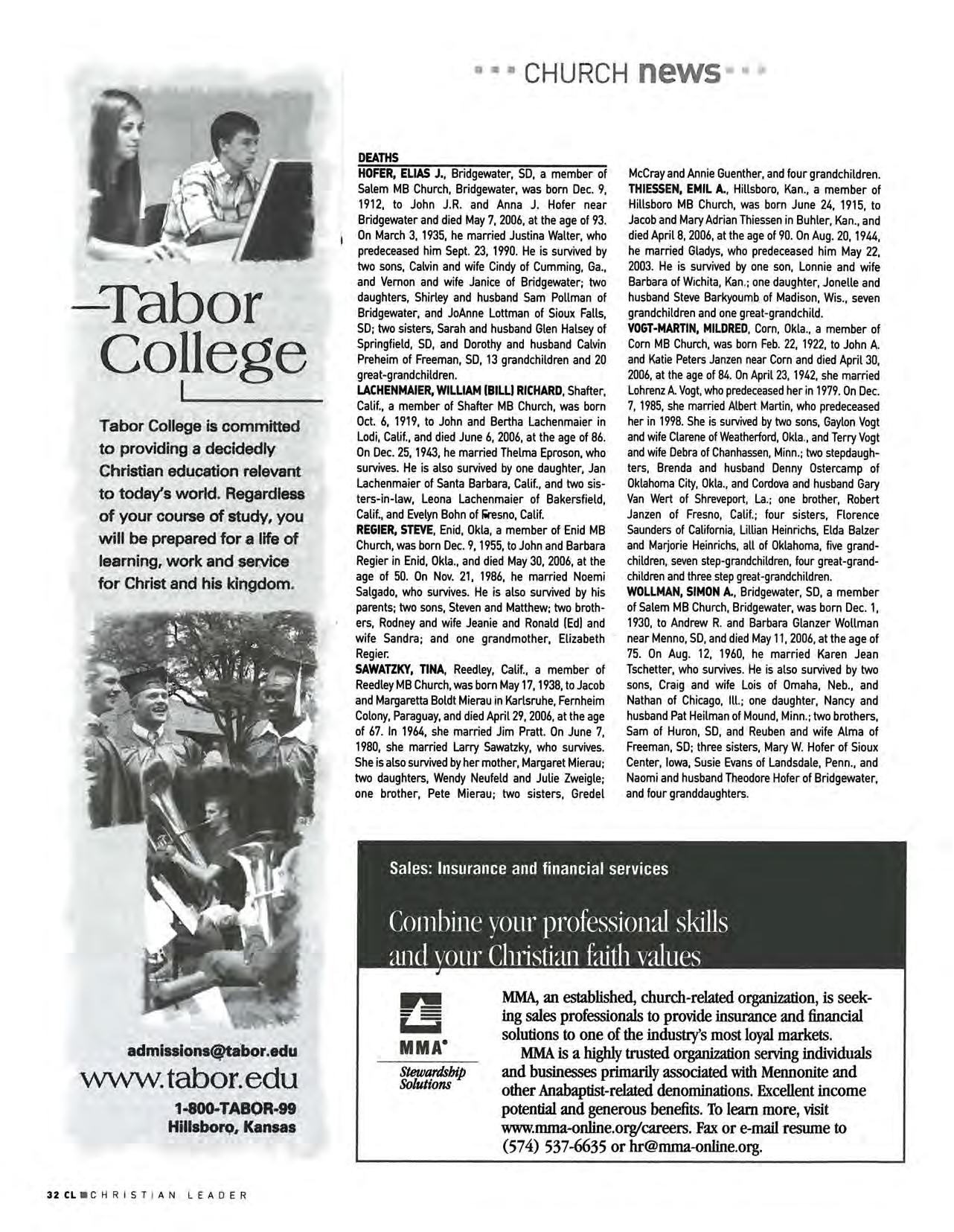
Stewardship Solutions
MMA, an established, church-related organization, is seeking sales professionals to provide insurance and finandaI solutions to one of the industry's most loyal markets.
MMA is a highly trusted organization serving individuals and businesses primarily assodated with Mennonite and other Anabaptist-related denominations Excellent income potential and generous benefits. To learn more , visit www.mma-online.orglcareers. Fax or e-mail resume to (574) 537-6635 or hr@mma-online.org.
Ware planning to venture out on a few minor road trips this summer: one to Washington state. another to the Oregon coast and a third to either Central Oregon or Northern California. Nothing more than a few hours away. We haven't scaled our outings back due to rising gas prices; these are trips we'd
planned to take all along. Well get on the road , " a bit like we do every summer. three bucks a gallon or not.
Even in this age of expensive gas and easy airline flight, the road trip is still my favorite fonn of travel. I guess it's odd to say that going by car is the slow way, given that for thousands
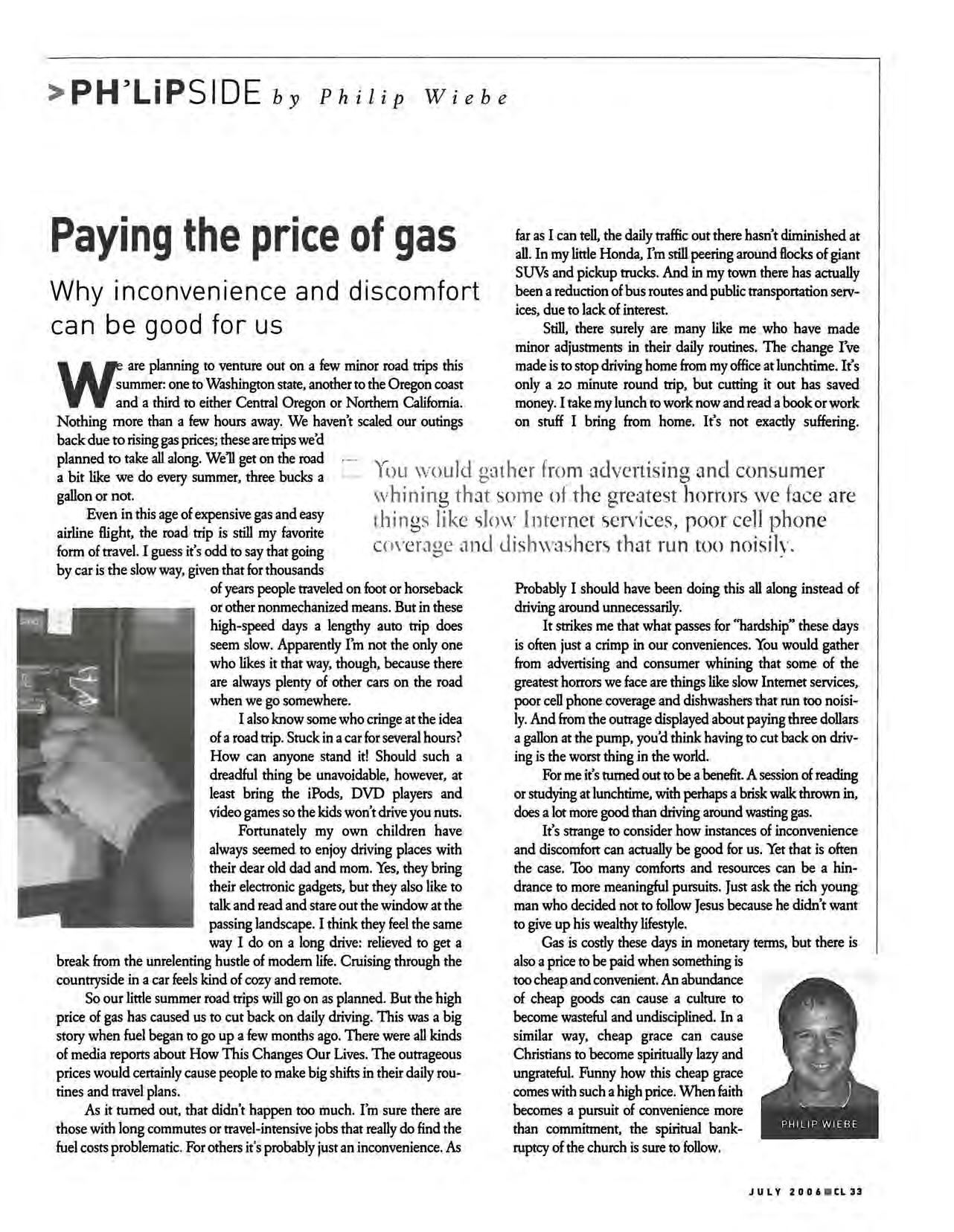
far as I can tell. the daily traffic out there hasn't diminished at all. In my litrle Honda. I'm still peering around flocks of giant SUVs and pickup trucks. And in my town there has actually been a reduction of bus routes and public transportation services. due to lack of interest.
Still, there surely are many like me who have made minor adjustments in their daily routines. The change I've made is to stop driving home from my office at lunchtime. It's only a 20 minute round trip, but cutting it out has saved money. I take my lunch to work now and read a book or work on stuff I bring from home. It's not exactly suffering.
Yi.m would g;.1th e r fro m ..mel consum e r whinin g th at so
me of the greatest horrors we face are
thin gs like Intern
et
services, poor cen phone cove r..lge Jnd Ji s hw"lsh ers that run too noisily.
of years people traveled on foot or horseback or other nonmechanized means. But in these high-speed days a lengthy auto trip does seem slow. Apparently I'm not the only one who likes it that way. though. because there are always plenty of other cars on the road when we go somewhere.
I also know some who cringe at the idea of a road trip. Stuck in a car for several hours? How can anyone stand it! Should such a dreadful thing be unavoidable. however. at least bring the iPods. DVD players and video games so the kids won't drive you nuts.
Fortunately my own children have always seemed to enjoy driving places with their dear old dad and mom. Yes. they bring their electronic gadgets. but they also like to talk and read and stare out the window at the passing landscape. I think they feel the same way I do on a long drive: relieved to get a break from the unrelenting hustle of modem life. Cruising through the countryside in a car feels kind of cozy and remote.
So our litrle summer road trips will go on as planned. But the high price of gas has caused us to cut back on daily driving. This was a big story when fuel began to go up a few months ago. There were all kinds of media reports about How This Changes Our Lives. The outrageous prices would certainly cause people to make big shifts in their daily routines and travel plans.
As it turned out. that didn't happen too much. I'm sure there are those with long commutes or travel-intensive jobs that really do find the fuel costs problematic For others it's probably just an inconvenience. As
Probably I should have been doing this all along instead of driving around unnecessarily.
It strikes me that what passes for "hardship" these days is often just a crimp in our conveniences. You would gather from advertising and consumer whining that some of the greatest horrors we face are things like slow Internet services. poor cell phone coverage and dishwashers that run too noisily. And from the outrage displayed about paying three dollars a gallon at the pump. you'd think having to cut back on driving is the worst thing in the world.
For me it's turned out to be a benefit. A session of reading or studying at lunchtime. with perhaps a brisk walk thrown in. does a lot more good than driving around wasting gas.
It's strange to consider how instances of inconvenience and discomfort can actually be good for us. Yet that is often the case. Too many comforts and resources can be a hindrance to more meaningful pursuits. Just ask the rich young man who decided not to follow Jesus because he didn't want to give up his wealthy lifestyle.
Gas is costly these days in monetary terms. but there is also a price to be paid when something is too cheap and convenient. An abundance of cheap goods can cause a culture to become wasteful and undisciplined. In a similar way. cheap grace can cause Christians to become spiritually lazy and ungrateful. Funny how this cheap grace comes with such a high price. When faith becomes a pursuit of convenience more than commitment. the spiritual bankruptcy of the church is sure to follow.
IjOOkin g at the schedule for this month's national Mennonite
Brethren Pastors' Conference and the U.S. Conference conention schedule, I count six mealtimes as well as a couple of coffee breaks at which to enjoy whatever is placed before me by our North Carolina hosts including, I hope, some local specialties. Mealtimes are often a highlight of any denominational gathering. After what must have been a culinary disaster, I recall fortner U.S.
research cited on the attitudes of teenagers regarding family mealtimes. This data hits home given that two of my three children are teenagers.
I was surprised to learn that most teenagers who eat three or fewer meals a week with their families wish they did so more often. In spite of their/our busy schedules and the not-so-pleasant attitudes that kids sometimes bring to the dinner table, our kids want to eat with usl I need no better reason to maintain family mealtimes as a priority.
Thinking about this latest research makes me wonder: If family mealtime is valuable beyond the nutritional foods consumed, does it follow that corporate mealtimes benefit us in similar ways? Is a congregation that enjoys regular meals together healthier? Does something other
[J All of the reason'; cited for \vhy famil y mealtime s make lor healthier hlmilies members can he apphed to ;,1 church hody and it s members .
Conference executive secretary Lynford Becker saying that food will make or break any event. He was referring to the quality of the food itself but I think it's fair to say that mealtimes can be successful in more ways than one.
The opening article in Time's June 12 special "Smart Earing" section recently caught my eye. In her piece called 'The Magic of the Family Meal," reporter Carolina A. Miranda describes the regular family meal as being a family's "anchor," as having a mysterious power that "engraves our souls" and as a kind of vaccine, protecting children "from all manner of hartn."
According to this article my three children are less likely to smoke, drink and do drugs, get depressed, develop eating disorders and consider suicide-all because our family regularly eats together. My husband and I are also raising kids who are more likely to do well in school, delay having sex, eat a variety of foods, have a good command of the English language and know their manners-thanks to family mealtimes.
The article is stuffed with facts and statistics that support these claims. Much of the infortnation stems from a study on family earing patterns published last year by the National Center on Addiction and Substance Abuse at Columbia University and reflects nearly a decade of data gathering.
Many of the reasons given for earing together as a family - better nutrition, building a sense of family identity and teaching citizenship-are ones I've heard before. What was news to me is the

than the wonderful array of desserts make for a successful church potluck? Do church meals foster a sense of identity and aid a congregation in passing on important truths about being a citizen of God's king-
dom? Does a meal shared at church nourish the soul of a congregation as well as the bodies of its members?
I think the answer to all of the above questions is yes. In fact, the more I think about the power of potlucks the more excited I become at the potential fellowship meals hold. All of the reasons cited for why family mealtimes make for healthier families and family members can be applied to a church body and its members. And the spiritual dimension we Christians bring to our own family tables as well as the congregational dinner table only strengthens and enhances those benefits.
The problem is that the family dinner table isn't always touched by magic. As Miranda notes in her Time atticle we may be sitting together around the same table but that doesn't mean well have something to say. We may be sharing a meal butthe kids may be fidgeting, bickering or daydreaming about where they'd rather be while my husband and I are mulling over something that happened at work.
The same can be said for congregational mealtimes. I may come to the table angry with someone from church that I did business with during the week, disappointed over a recent decision by church leaders or preoccupied with a problem at home. The meal may fill my stomach but do little for the rest of me.
So how do I create magical mealtime moments? For me the answer comes in a line from the movie Finding Nemo. It's a version of Dory's reminder to herself to "just keep swimming." I tell myself to just keep at it because on those days when no one is in a hurry to leave and we are savoring the joy of being together, I catch a glimpse of God at work in my family or my congregation and I know why breaking bread together is so important. -CF
Lead Pastor: The Buhler MB Church in Buhler, Kan., is looking for a lead pastor to be part of a four person pastoral team. Resumes may be sent to the Search Committee at Buhler M.B. Church, 415 N. West Street, Buhler, KS 67522 or e-mailed to inf00buhlermb.org 17/121
Country Representative: Mennonite Central Committee has an urgent opening for a country representative for its historic program in India. This individuaVcouple will coordinate the work of a large Indian staff in peace, education and community development programs in partnership with Indian organizations. Preferred start date is January 2007; June 2007 start date is possible. Direct inquiries to Lowell Detweiler, MCC Human Resources, PO Box 500, Akron, PA 17501; phone 717-859-1151; email: Icd0mcc.org.
Local Coordinator: Local Coordinator needed for Seattle Mennonite Voluntary Service IMVSI Program! Recruit/orient volunteers, liaise with placement agencies and supporting Mennonite congregations, oversee unit house/budget, build/support relationships. Averages 18 h/p/w, fair wages. Opens 7/1/2006. Call 206-361-4630, e-mail mvslpc0netsmc net for more information.
Orchard Park Bible Church is seeking to begin a new ministry position of a Family Ute Pastor.
This Associate Pastor would be responsible for helping to spearhead the development of strategies for Family life through the various stages of ministries at OPBe.
Specifically the candidate must:
[,yo Have a vibrant relationship with Christ, demonstJate consiste nt Christian character. commitment and lifestyle
r.,.. Be capable of developing a creative plan to connect family from Nursery. Kidzone. JR Youth , SeniorYouth. and their Parents
;;,. Be able to equip families and empower parents through various Ministries
[,yo Possess a passion for pastoral ministry be highly motivated, demonstrate self initiative and work well in a team oriented ministry
;::,. Preferably have a MasteIS Dewee In Pastoral Studies Orchard Park Bible Church Attn: Jim Dick 434 Hunter Rd. RR #3 Niagara On The lake, Ontario lOS UO pastorsearch@orchardparkbibledlurch.org 905-468-5732 fax _.orchardparkbiblechurch.org
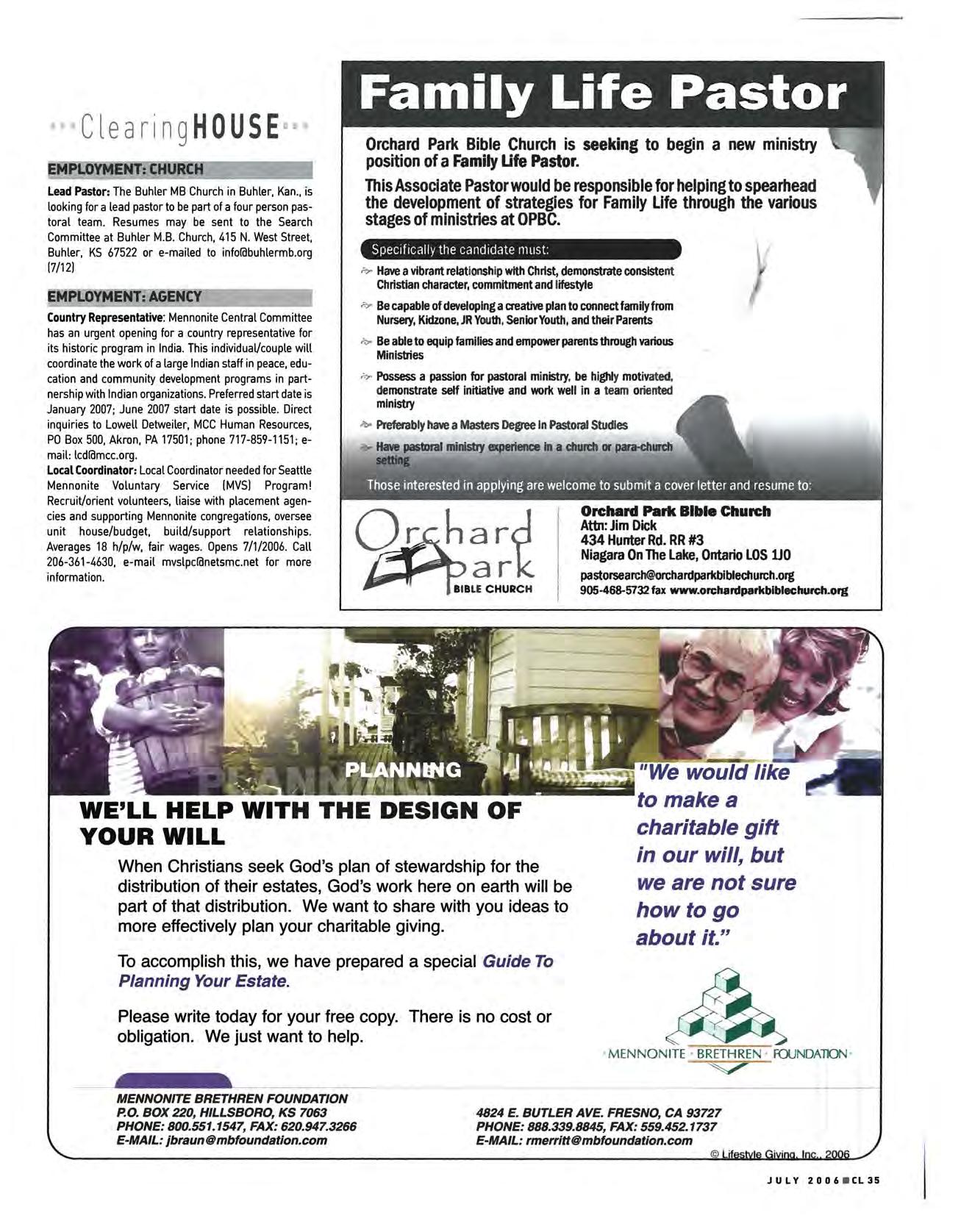
When Christians seek God's plan of stewardship for the distribution of their estates, God's work here on earth will be part of that distribution. We want to share with you ideas to more effectively plan your charitable giving.
To accomplish this, we have prepared a special Guide To Planning Your Estate
Please
Congratulations North Oak Community Church on completion ofyour beautiful neW worship center! This addition was financed by MB Loan Fund in cooperation withinvestors across our U.S. Conference of MB Churches. ........-'

Would
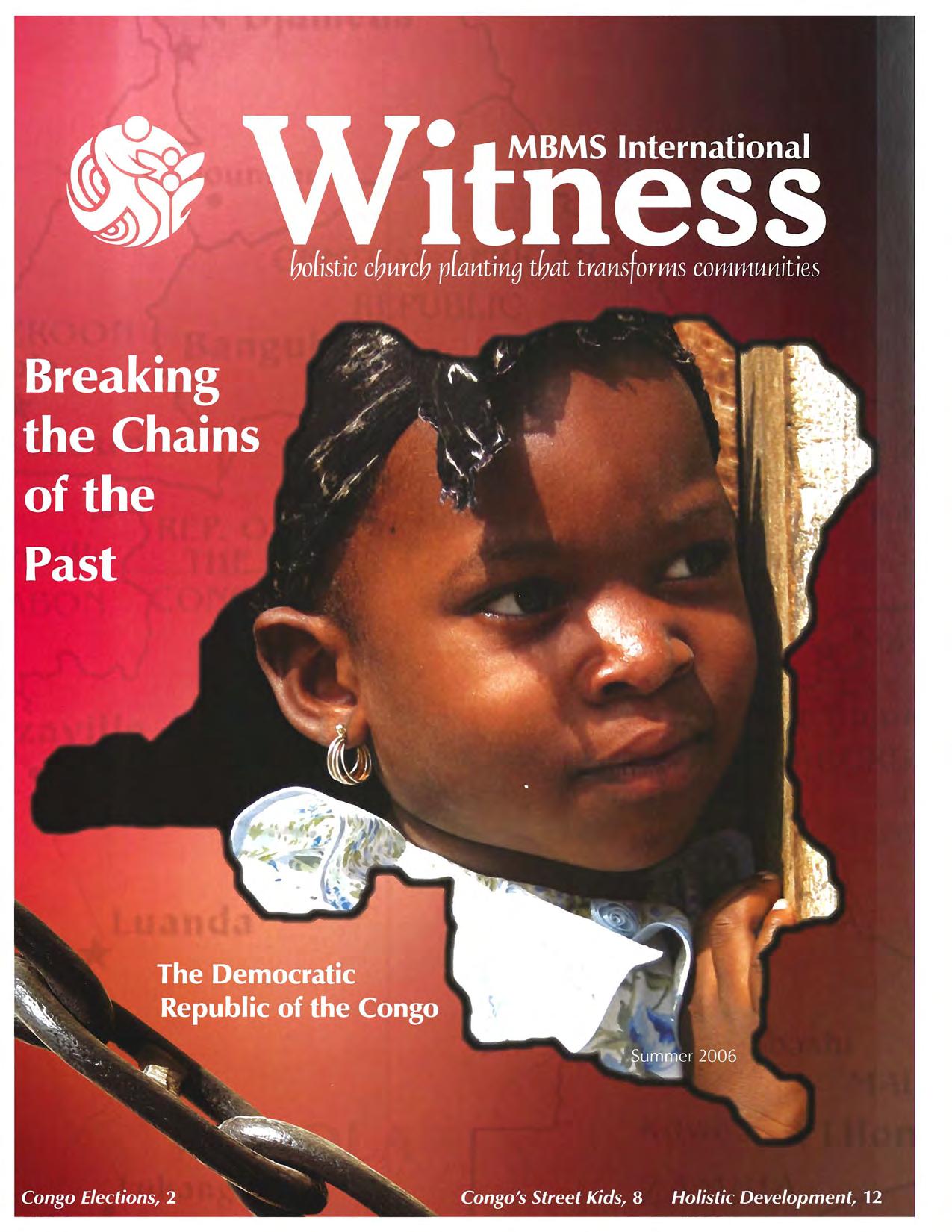
The Witness Magazine is a quarterly publication of Mennonite Brethren Mission and Service International (MBMSI), the Mennonite Brethren global mission agency of MB churches in Canada and the United States.
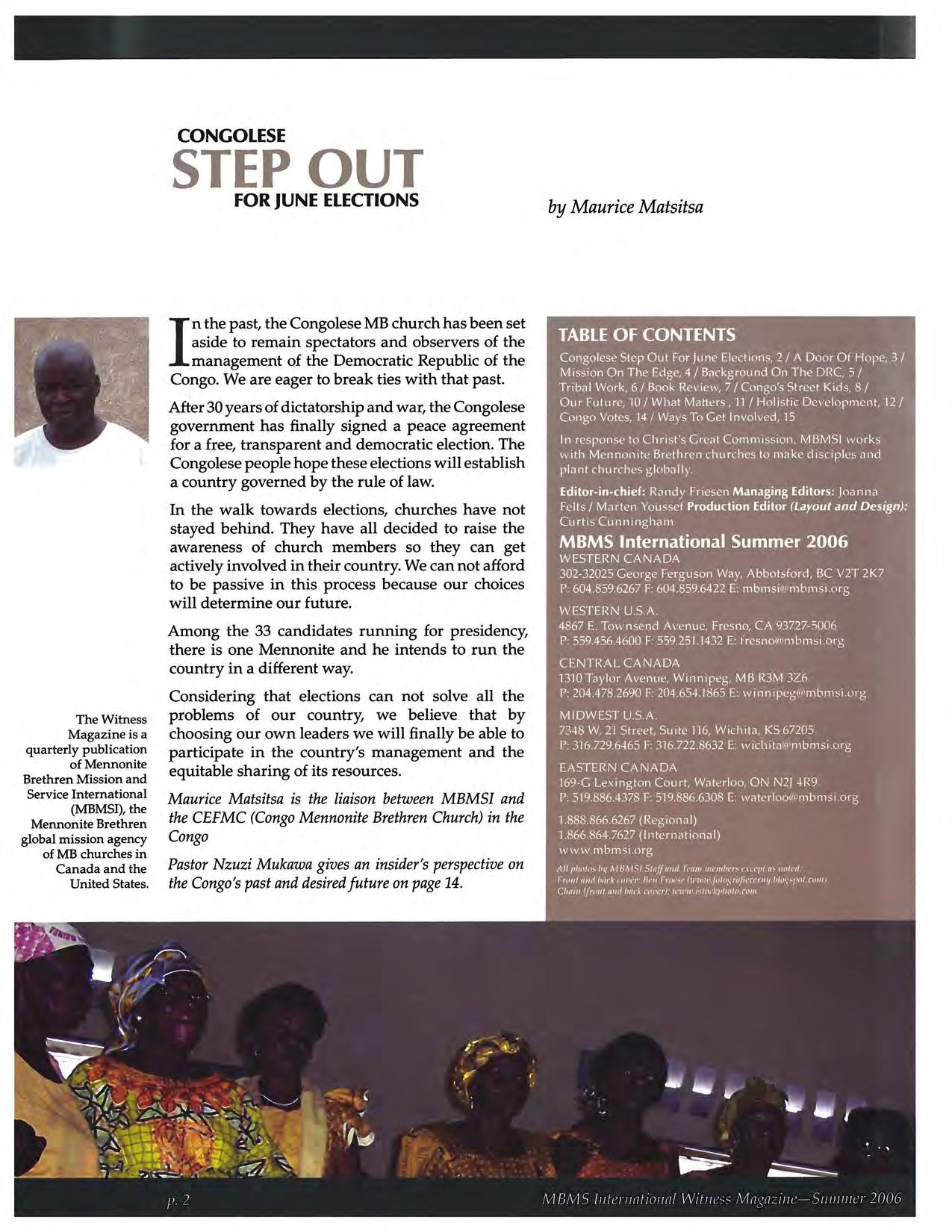
by Maurice Matsitsa
In the past, the Congolese MB church has been set aside to remain spectators and observers of the management of the Democratic Republic of the Congo. We are eager to break ties with that past.
After 30 years of dictatorship and war, the Congolese government has finally signed a peace agreement for a free, transparent and democratic election. The Congolese people hope these elections will establish a country governed by the rule of law.
In the walk towards elections, churches have not stayed behind. They have all decided to raise the awareness of church members so they can get actively involved in their country. We can not afford to be passive in this process because our choices will determine our future.
Among the 33 candidates running for presidency, there is one Mennonite and he intends to run the country in a different way.
Considering that elections can not solve all the problems of our country, we believe that by choosing our own leaders we will finally be able to participate in the country's management and the equitable sharing of its resources.
Maurice Matsitsa is the liaison between MBMSI and the CEFMC (Congo Mennonite Brethren Church) in the Congo
Pastor Nzuzi Mukawa gives an insider's perspective on the Congo's past and desired future on page 14.
by Randy Friesen, MBMSI General Director
My wife Marjorie and I were enjoying the hospitality of our hosts Pakisa and Linda Tshimika during a visit a number of years ago to Kinshasa, Congo. Linda invited us to join her at a discipleship class she was leading for new Christians. As I prayed about what to share with this group I felt led to focus on Christ's training of his disciples in Luke 9 and 10 where they learned to proclaim the Kingdom through word and deed. If we are disciples of Christ, we also must learn to share the gospel of the Kingdom
One of the young men in that class was a displaced Sudanese refugee, and a former Muslim, staying at the United Nations Refugee House in Kinshasa After our study on the importance of sharing the gospel, he immediately returned to the refugee house and shared his newfound faith in Christ with a friend of his and then led this friend to Christ. He went on to serve on a YMI team that summer in Congo, to help other Congolese believers learn to share their faith, and now has a world wide ministry to Muslims He has remained a good friend and is now a colleague in ministry
Congo has one of the highest percentages of displaced people and refugees of any country in the world It is no coincidence that many in these circumstances are discovering new found hope in the gospel. It is that combination of suffering and hope which marks so many of the stories coming out of Congo
MBMSI has been serving in Congo for over 80 years. Hundreds of missionaries have shared and lived the hope of the gospel often through very challenging circumstances. I was reading the autobiography of Sarah Peters this week who invested more than 30 years of her life in medical care, evangelism and discipleship in the Congo
Through the witness of Sarah Peters and many like her the MB church in Congo has grown to more than 100,000 members With the growth of this Congolese church the role of MBMSI has changed to one of support for capacity building projects which enable Congolese Christians to reach, disciple and resource their own communities
MBMSI's work in Congo is focused on:
• Discipling and assisting leaders who can serve in the areas of health care, education, pastoral ministry and church planting.
• Assisting local congregations, bringing community transformation through microenterprise and small business loans, better access to pharmaceuticals, and peace making.
• Strengthening the mission training and sending capacity of the Congolese MB conference
The current economic and social crisis in the country has been a significant challenge to local congregations and their ability to bring transformation to their communities. While many are focused on survival they also live with tremendous hope At a particularly difficult time in Israel's history God spoke to Hosea and said, "1 will make the Valley of Achor (trouble) a door of hope ."
(Hosea 2:15) We serve a God who continues to open doors of hope in times of trouble. We'd like to share some of those stories of hope and transformation with you in this edition of the Witness. Our prayer is that together we would choose to join the Congolese church in being agents of hope filled transformation in our world.

Refer to page 7 for an interview with Sarah Peters.
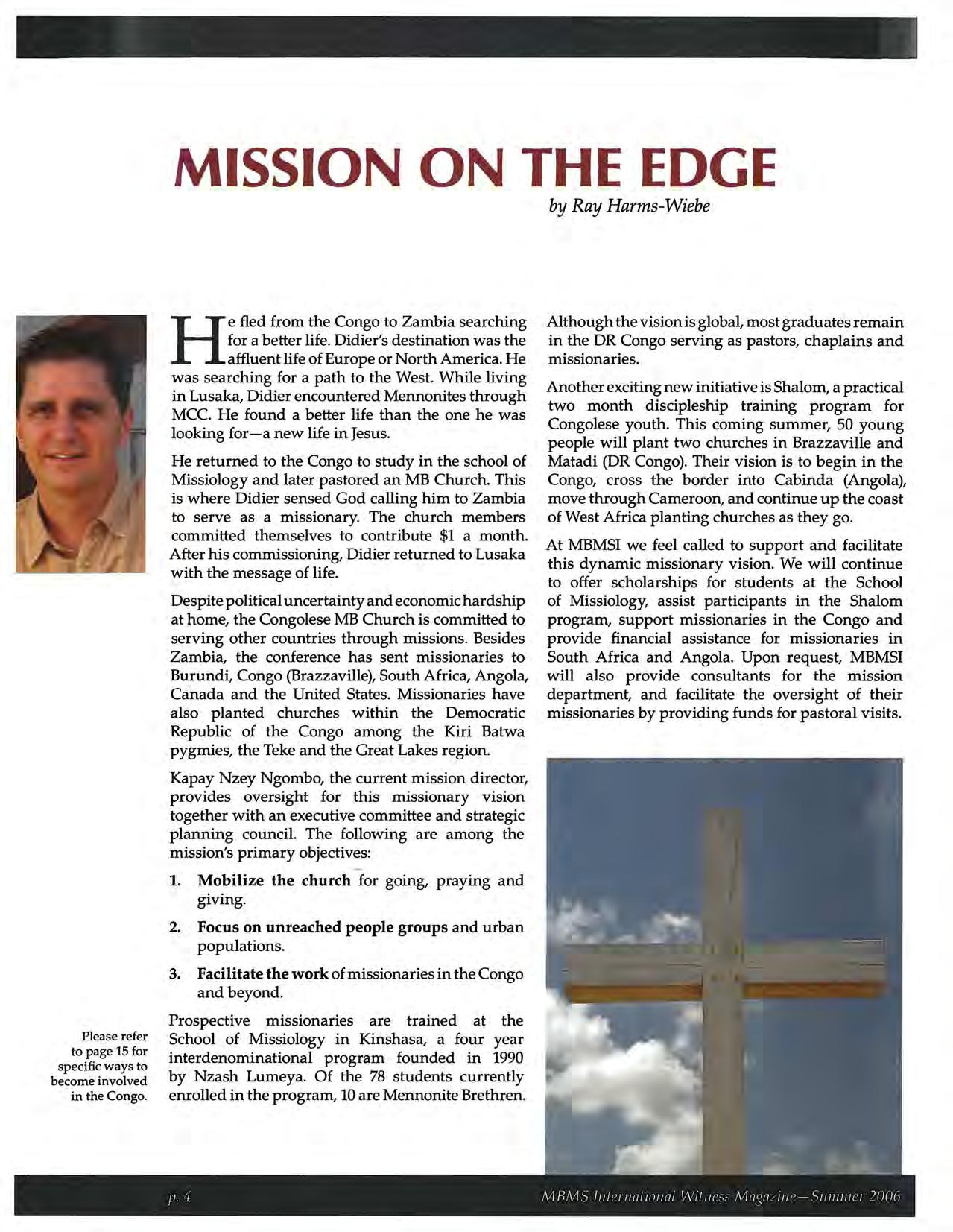
Please refer to page 15 for specific ways to become involved in the Congo.
by Ray Harms-Wiebe
He fled from the Congo to Zambia searching for a better life. Didier's destination was the affluent life of Europe or North America. He was searching for a path to the West. While living in Lusaka, Didier encountered Mennonites through MCC. He found a better life than the one he was looking for-a new life in Jesus.
He returned to the Congo to study in the school of Missiology and later pastored an MB Church. This is where Didier sensed God calling him to Zambia to serve as a missionary. The church members committed themselves to contribute $1 a month. After his commissioning, Didier returned to Lusaka with the message of life.
Despite political uncertainty and economic hardship at home, the Congolese MB Church is committed to serving other countries through missions. Besides Zambia, the conference has sent missionaries to Burundi, Congo (Brazzaville), South Africa, Angola, Canada and the United States. Missionaries have also planted churches within the Democratic Republic of the Congo among the Kiri Batwa pygmies, the Teke and the Great Lakes region.
Kapay Nzey Ngombo, the current mission director, provides oversight for this missionary vision together with an executive committee and strategic planning council. The following are among the mission's primary objectives:
1. Mobilize the church for going, praying and giving.
2. Focus on unreached people groups and urban populations.
3. Facilitate the work of missionaries in the Congo and beyond.
Prospective missionaries are trained at the School of Missiology in Kinshasa, a four year interdenominational program founded in 1990 by Nzash Lumeya. Of the 78 students currently enrolled in the program, 10 are Mennonite Brethren.
Although the vision is global, most graduates remain in the DR Congo serving as pastors, chaplains and missionaries.
Another exciting new initiative is Shalom, a practical two month discipleship training program for Congolese youth. This coming summer, 50 young people will plant two churches in Brazzaville and Matadi (DR Congo). Their vision is to begin in the Congo, cross the border into Cabinda (Angola), move through Cameroon, and continue up the coast of West Africa planting churches as they go.
At MBMSI we feel called to support and facilitate this dynamic missionary vision. We will continue to offer scholarships for students at the School of Missiology, assist participants in the Shalom program, support missionaries in the Congo and provide financial assistance for missionaries in South Africa and Angola. Upon request, MBMSI will also provide consultants for the mission department, and facilitate the oversight of their missionaries by providing funds for pastoral visits.
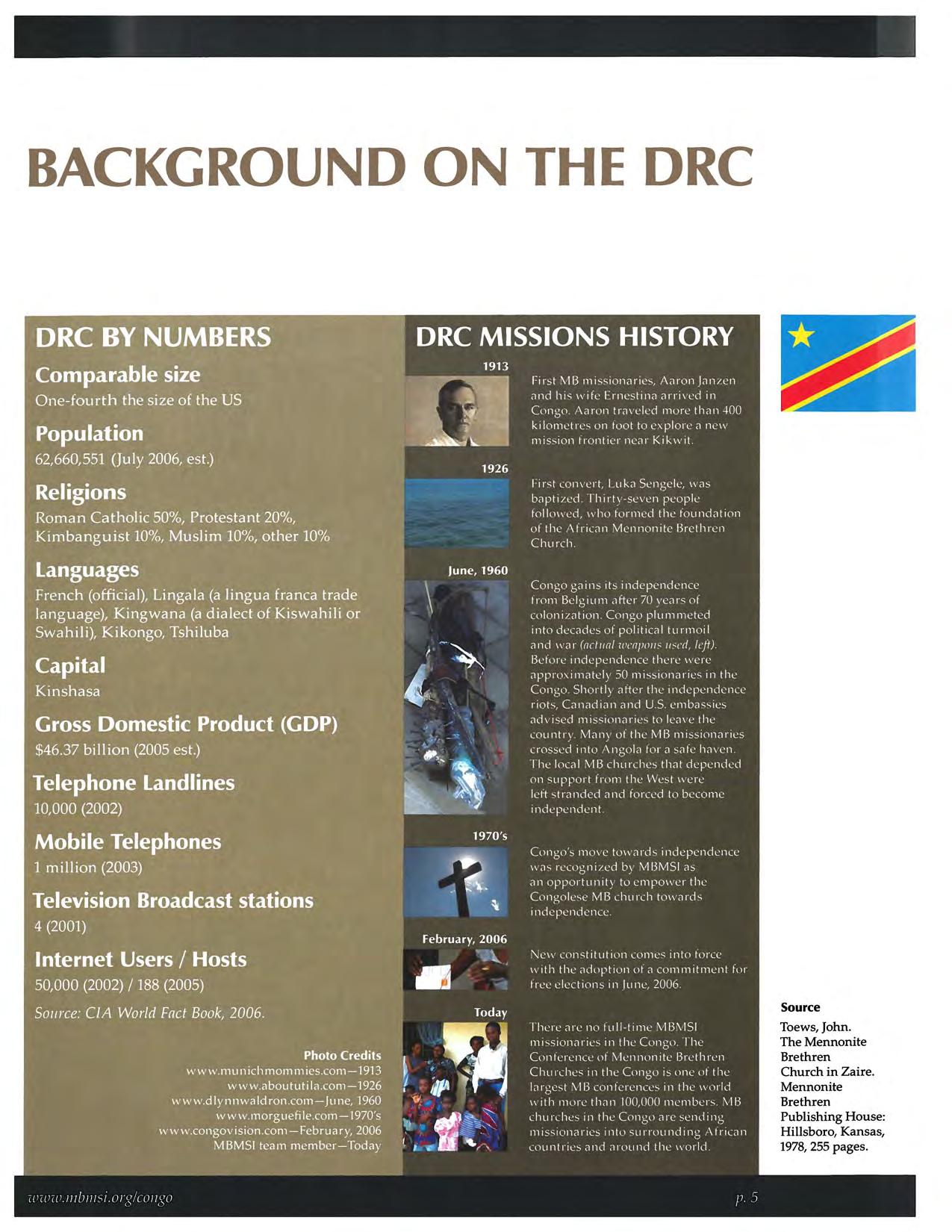
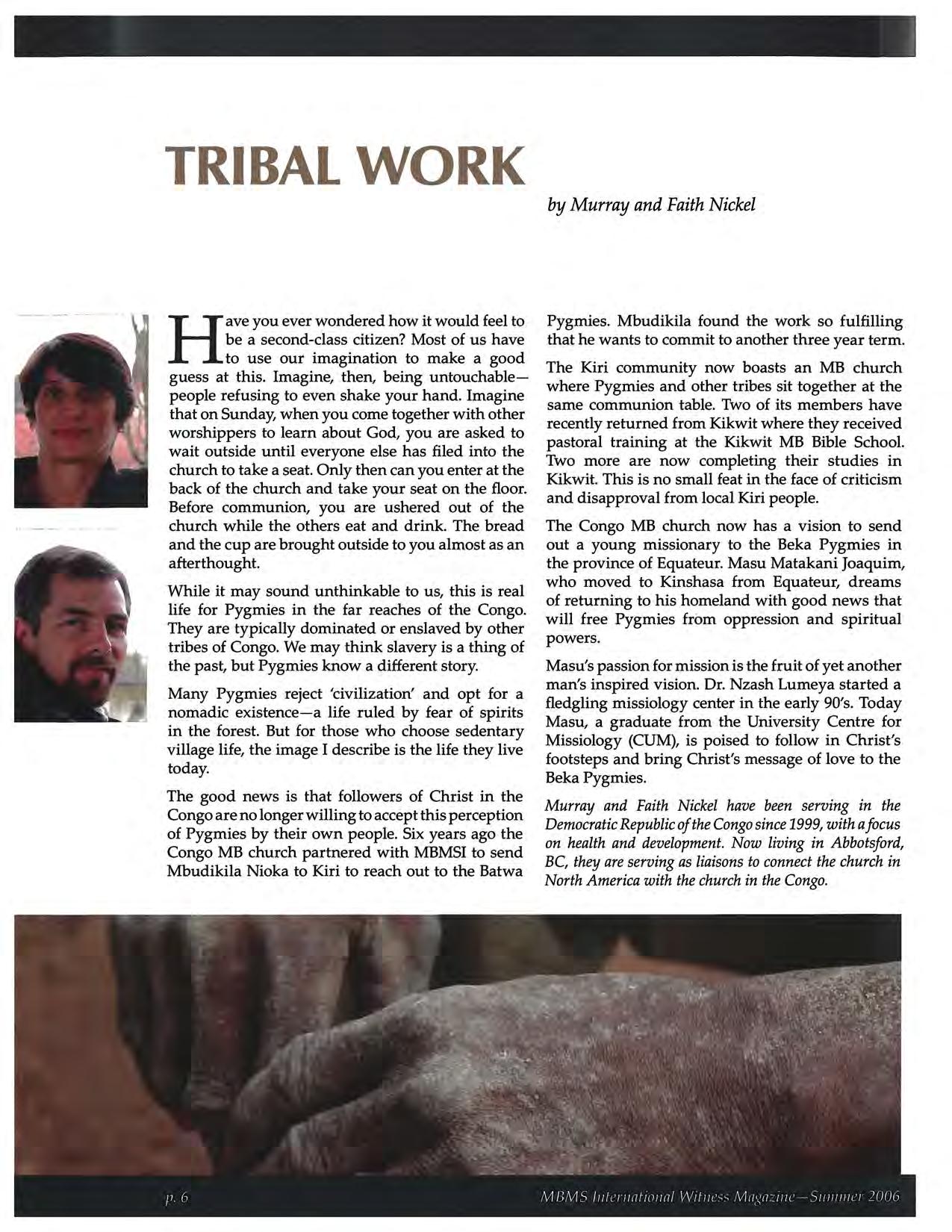
by Murray and Faith Nickel
Have you ever wondered how it would feel to be a second-class citizen? Most of us have to use our imagination to make a good guess at this . Imagine, then, being untouchablepeople refusing to even shake your hand. Imagine that on Sunday, when you come together with other worshippers to learn about God, you are asked to wait outside until everyone else has filed into the church to take a seat. Only then can you enter at the back of the church and take your seat on the floor. Before communion, you are ushered out of the church while the others eat and drink. The bread and the cup are brought outside to you almost as an afterthought.
While it may sound unthinkable to us, this is real life for Pygmies in the far reaches of the Congo. TI:tey are typically dominated or enslaved by other tnbes of Congo. We may think slavery is a thing of the past, but Pygmies know a different story.
Many Pygmies reject 'civilization' and opt for a nomadic existence-a life ruled by fear of spirits the f?rest. for those who choose sedentary village hfe, the image I describe is the life they live today.
The good news is that followers of Christ in the Congo are no longer willing to accept this perception of Pygmies by their own people. Six years ago the Congo MB church partnered with MBMSI to send Mbudikila Nioka to Kiri to reach out to the Batwa
Pygmies. Mbudikila found the work so fulfilling that he wants to commit to another three year term
The Kiri community now boasts an MB church where Pygmies and other tribes sit together at the same communion table Two of its members have recently returned from Kikwit where they received pastoral training at the Kikwit MB Bible School. Two more are now completing their studies in Kikwit. This is no small feat in the face of criticism and disapproval from local Kiri people.
The Congo MB church now has a vision to send out a missionary to the Beka Pygmies in the province of Equateur. Masu Matakani Joaquim, who moved to Kinshasa from Equateur, dreams of. returning to his homeland with good news that will free Pygmies from oppression and spiritual powers.
Masu's passion for mission is the fruit of yet another man's inspired vision. Dr Nzash Lumeya started a fledgling missiology center in the early 90's . Today Masu, a graduate from the University Centre for Missiology (CUM), is poised to follow in Christ's footsteps and bring Christ's message of love to the Beka Pygmies.
Murray and Faith Nickel have been serving in the Democratic Republic of the Congo since 1999, with afocus on health and development . Now living in Abbotsford, BC, they are serving as liaisons to connect the church in North America with the church in the Congo
by Marten Youssef
She spent over 30 years in the Congo and in her book, Walk With Me: South of the Equator, Sarah Peters walks the reader through her journey in vivid detail. Sarah, a trained nurse, served under Mennonite Brethren Missions as a nurse and midwife at the Kajiji hospital; she also served in the Kikwit Bible School.
After returning to Canada, Sarah felt led to write about her experience in the Congo hoping God would use it for His glory. She has committed all the proceeds of the book to missions work in the Congo. More than 700 copies have been sold.
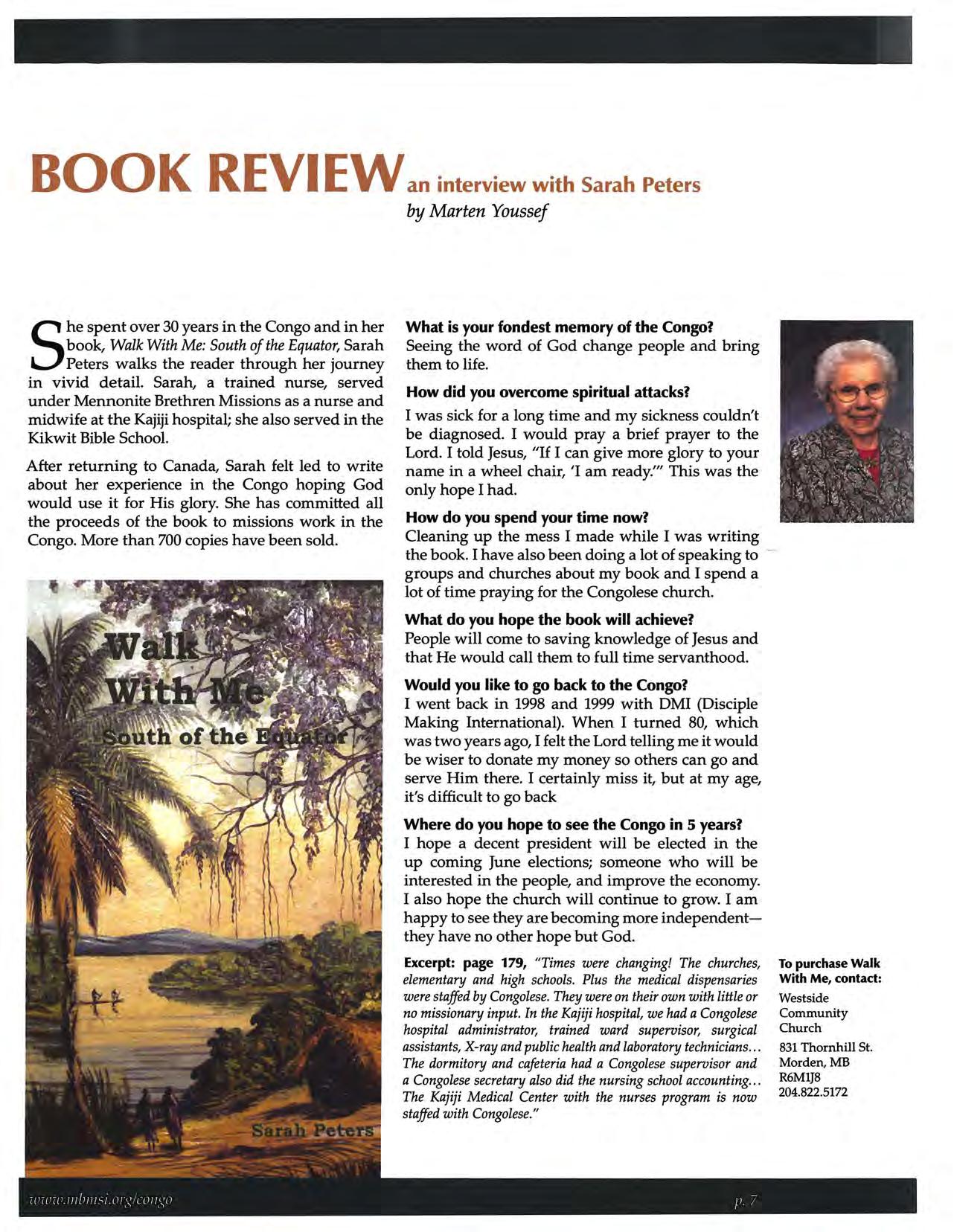
What is your fondest memory of the Congo?
Seeing the word of God change people and bring them to life.
How did you overcome spiritual attacks?
I was sick for a long time and my sickness couldn't be diagnosed. I would pray a brief prayer to the Lord. I told Jesus, "If I can give more glory to your name in a wheel chair, 'I am ready.'" This was the only hope I had.
How do you spend your time now?
Cleaning up the mess I made while I was writing the book. I have also been doing a lot of speaking to groups and churches about my book and I spend a lot of time praying for the Congolese church. What do you hope the book will achieve?
People will come to saving knowledge of Jesus and that He would call them to full time servanthood.
Would you like to go back to the Congo?
I went back in 1998 and 1999 with DMI (Disciple Making International). When I turned 80, which was two years ago, I felt the Lord telling me it would be wiser to donate my money so others can go and serve Him there. I certainly miss it, but at my age, it's difficult to go back
Where do you hope to see the Congo in 5 years?
I hope a decent president will be elected in the up coming June elections; someone who will be interested in the people, and improve the economy. I also hope the church will continue to grow. I am happy to see they are becoming more independentthey have no other hope but God.
Excerpt: page 179, "Times were changing! The churches, elementary and high schools. Plus the medical dispensaries were staffed by Congolese. They were on their own with little or no missionary input. In the Kajiji hospital, we had a Congolese hospital administrator, trained ward supervisor, surgical assistants, X-ray and public health and laboratory technicians
The dormitory and cafeteria had a Congolese supervisor and a Congolese secretary also did the nursing school accounting
The Kajiji Medical Center with the nurses program is now staffed with Congolese."
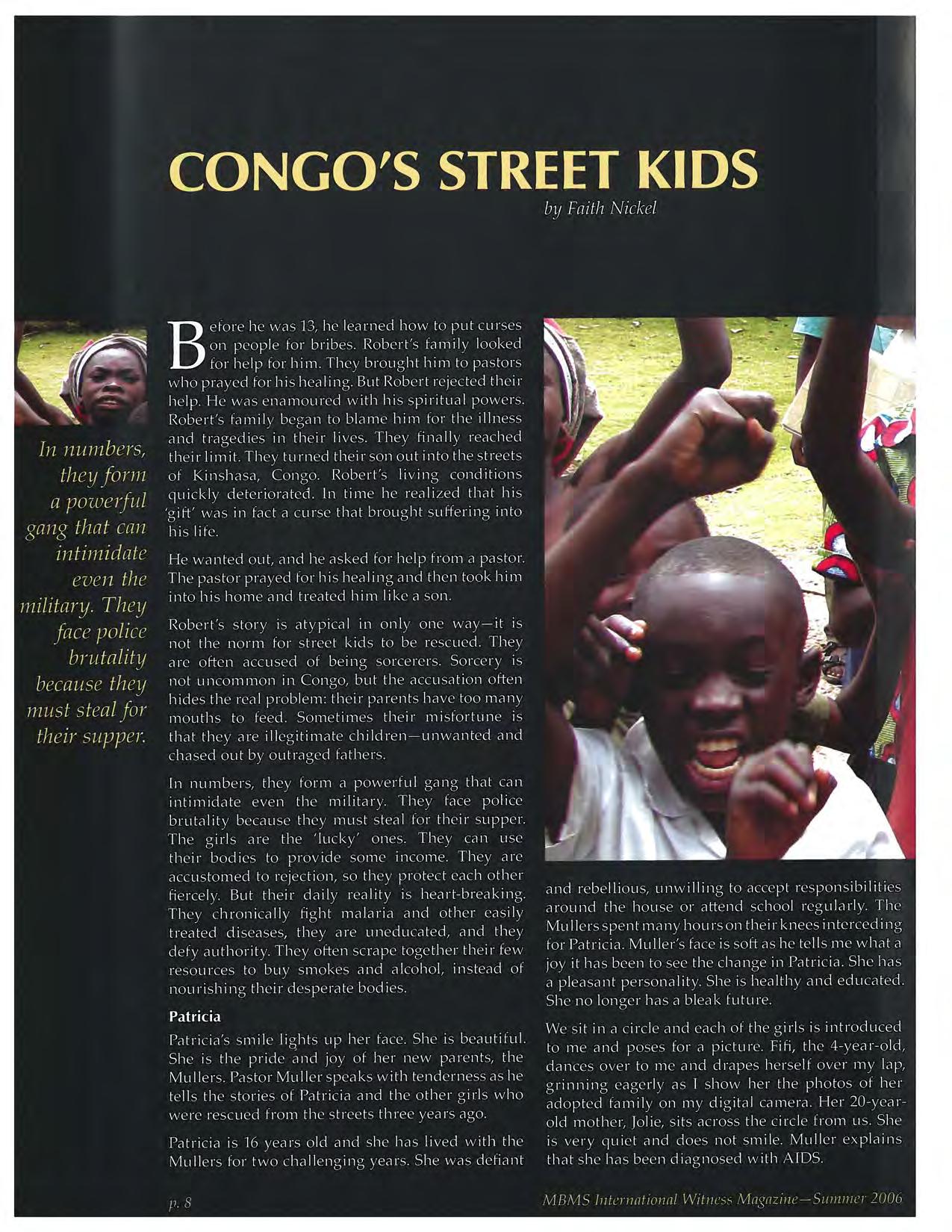
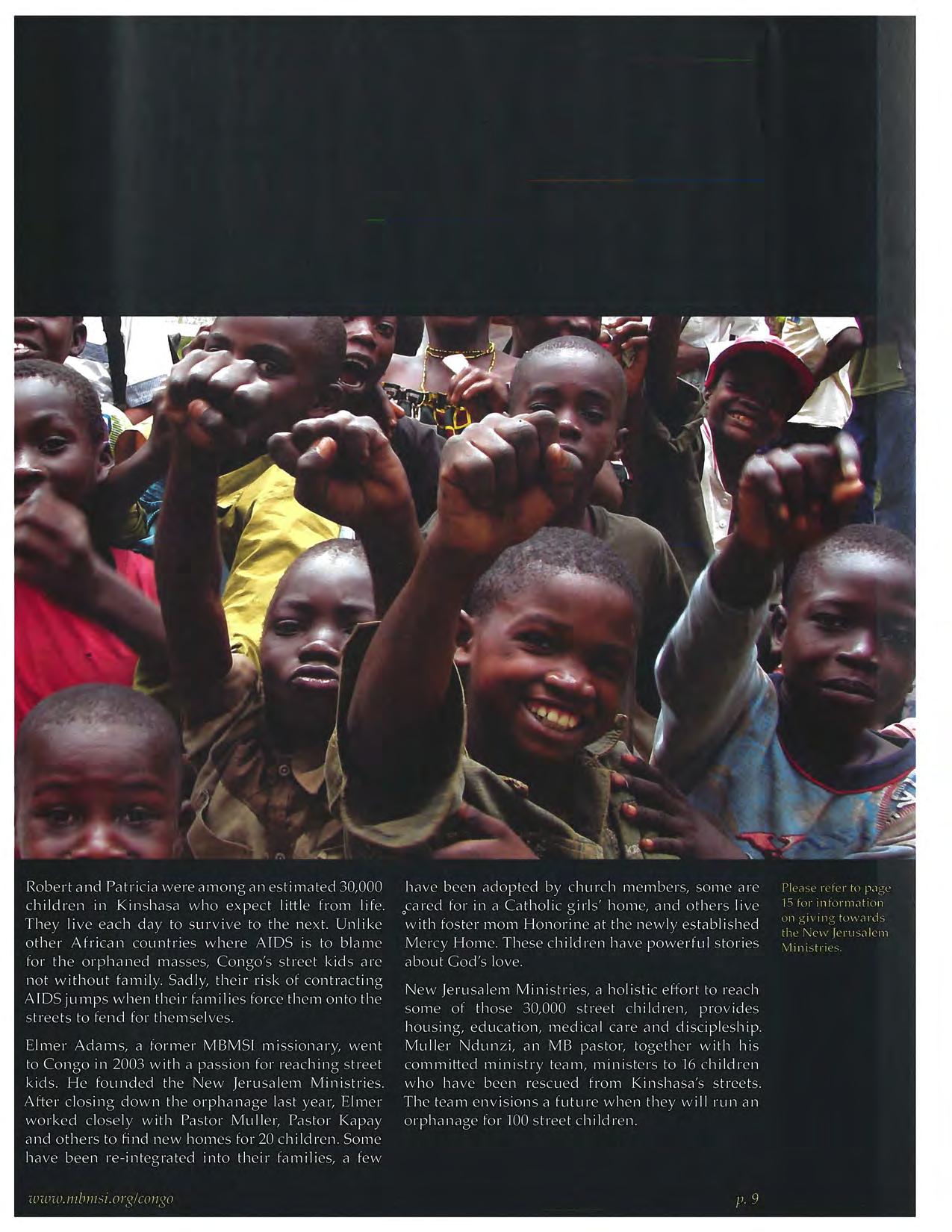
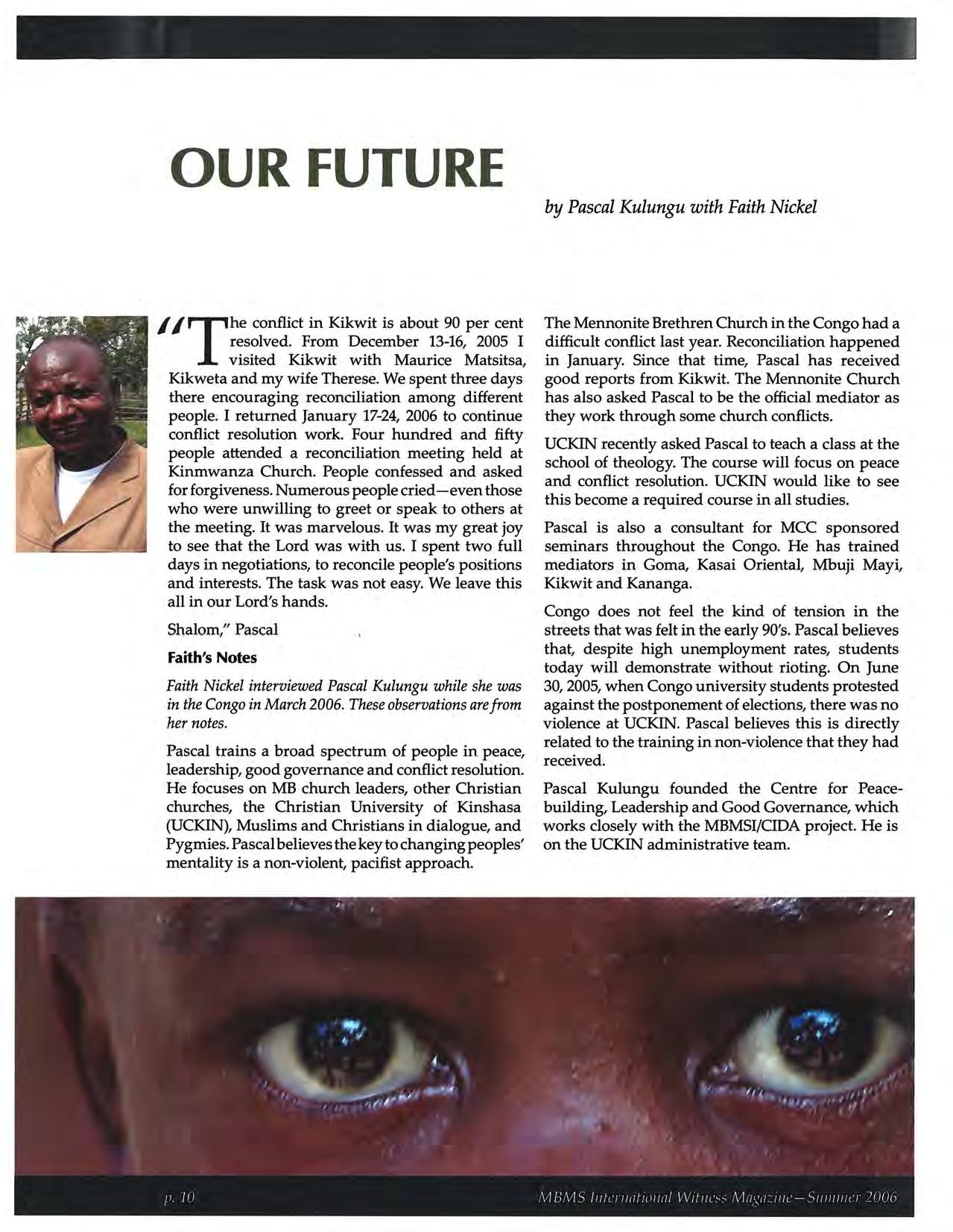
by Pascal Kulungu with Faith Nickel
II The conflict in Kikwit is about 90 per cent resolved. From December 13-16, 2005 I visited Kikwit with Maurice Matsitsa, Kikweta and my wife Therese. We spent three days there encouraging reconciliation among different people. I returned January 17-24, 2006 to continue conflict resolution work. Four hundred and fifty people attended a reconciliation meeting held at Kinmwanza Church. People confessed and asked for forgiveness. Numerous people cried -even those who were unwilling to greet or speak to others at the meeting. It was marvelous. It was my great joy to see that the Lord was with us. I spent two full days in negotiations, to reconcile people's positions and interests. The task was not easy. We leave this all in our Lord's hands.
Shalom," Pascal
Faith's Notes
Faith Nickel interviewed Pascal Kulungu while she was in the Congo in March 2006. These observations are from her notes.
Pascal trains a broad spectrum of people in peace, leadership, good governance and conflict resolution. He focuses on MB church leaders, other Christian churches, the Christian University of Kinshasa (UCKIN), Muslims and Christians in dialogue, and Pygmies. Pascal believes the key to changing peoples' mentality is a non-violent, pacifist approach.
The Mennonite Brethren Church in the Congo had a difficult conflict last year. Reconciliation happened in January. Since that time, Pascal has received good reports from Kikwit. The Mennonite Church has also asked Pascal to be the official mediator as they work through some church conflicts.
UCKIN recently asked Pascal to teach a class at the school of theology. The course will focus on peace and conflict resolution. UCKIN would like to see this become a required course in all studies.
Pascal is also a consultant for MCC sponsored seminars throughout the Congo. He has trained mediators in Goma, Kasai Oriental, Mbuji Mayi, Kikwit and Kananga.
Congo does not feel the kind of tension in the streets that was felt in the early 90's. Pascal believes that, despite high unemployment rates, students today will demonstrate without rioting. On June 30, 2005, when Congo university students protested against the postponement of elections, there was no violence at UCKIN. Pascal believes this is directly related to the training in non-violence that they had received.
Pascal Kulungu founded the Centre for Peacebuilding, Leadership and Good Governance, which works closely with the MBMSI/CIDA project. He is on the UCKIN administrative team.
by Ashley Harms-Wiebe
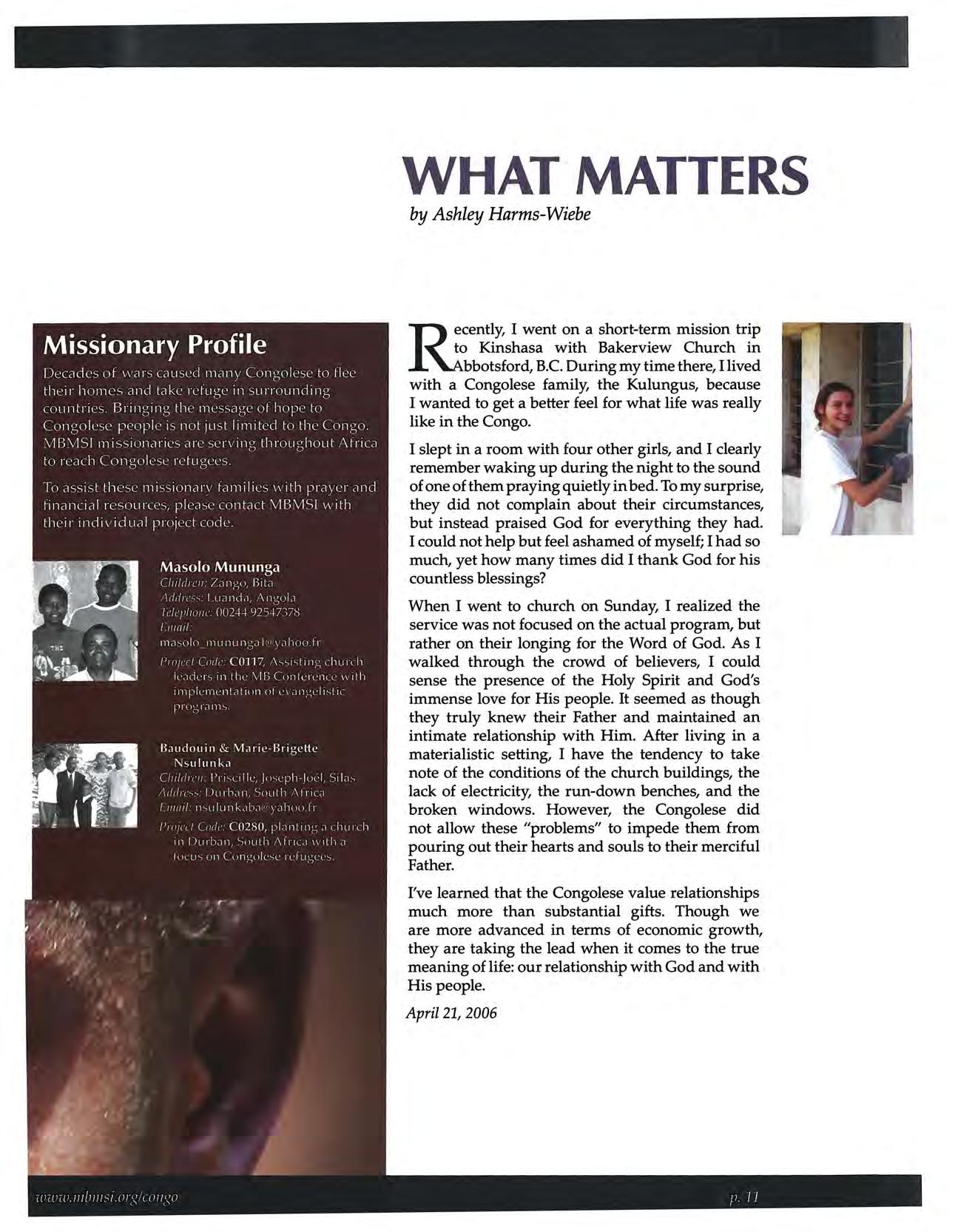
I went on a short-term mission trip to Kinshasa with Bakerview Church in bbotsford, B.c. During my time there, I lived with a Congolese family, the Kulungus, because I wanted to get a better feel for what life was really like in the Congo .
I slept in a room with four other girls, and I clearly remember waking up during the night to the sound of one of them praying quietly in bed. To my surprise, they did not complain about their circumstances, but instead praised God for everything they had. I could not help but feel ashamed of myself; I had so much, yet how many times did I thank God for his countless blessings?
When I went to church on Sunday, I realized the service was not focused on the actual program, but rather on their longing for the Word of God. As I walked through the crowd of believers, I could sense the presence of the Holy Spirit and God's immense love for His people. It seemed as though they truly knew their Father and maintained an intimate relationship with Him. After living in a materialistic setting, I have the tendency to take note of the conditions of the church buildings, the lack of electricity, the run-down benches, and the broken windows. However, the Congolese did not allow these "problems" to impede them from pouring out their hearts and souls to their merciful Father.
I've learned that the Congolese value relationships much more than substantial gifts. Though we are more advanced in terms of economic growth, they are taking the lead when it comes to the true meaning of life: our relationship with God and with His people.
April 21, 2006
To learn more on this project, contact: MBMSI mbmsi@mbmsi.org
1.866 964.7627
Ernest Dyck
MBMSI-CIDA Liaison ehdyckl@mts.net 204.669.6773
Murray Nickel
MBMSI Congo Projects Coordinator mfnickel @mbmsi.org 604.855.9512
Please refer to page 15 for more information.

Despite decades of economic hardship, war and civil unrest, the Church of Congo is committed to improving health, education and economic opportunities in their communities through peace-building efforts.
MBMSI's commitment to assist the Congolese church remains strong. Together with the Canadian International Development Agency, MBMSI will direct $334,000 towards projects in the CongoCIDA has offered to contribute $200,000 of that total. MBMSI has raised a substantial amount of the remaining balance, but there still remains $74,722 to be raised.
The Peace, Health and Rural Development project emphasizes sustainability and the training of local people. To this end, a local Congolese group of professionals and lay men and women, all members of the Congo MB Church, have been involved in planning, implementing and monitoring the project.
The project has three integrated components.
1. Peace building: the Centre for Peace building, Leadership, and Good Governance is a local initiative promoting improved approaches to conflict resolution as well as leadership development.
2. Medicine credit line: local health centres will be supported through the medicine credit line, which will provide essential medicine to clinics at a lower cost while promoting improved management and long-term sustainability.
3. Saving and loans associations: the activities of existing Savings and Loan Associations will be enhanced by increasing their ability to provide credit to viable microenterprises. It also helps to promote improved association management capacity as well as community structured accountability.

by Pastor Nzuzi Mukawa
The Democratic Republic of the Congo is undergoing a crucial time in its history. After forty years of its existence as a nation, the Congo will elect its own political leaders. It is with great expectation that Congolese people are awaiting the materialization of this event.
History bears witness that the DRC has never had legitimate political leaders. All of the authorities came to power through military coups, war or political arrangements. This can be seen through out the four periods of our history.
1. The colonial era, 1907 to 1960: the Belgian government appointed its own political leaders who intended to rule and colonize the Congo.
2. The independence period: in June 1960 the Congo became a free country with a dream to become a great nation in the heart of the African continent. But this dream was shattered by a civil war.
3. Revolutions: Joseph Mobutu came to power through a coup d'etat. He ruled the country in dictatorship for 32 years. He was ousted in 1997 by Laurent Kabila. Mobutu died in exile. With the assistance of Rwanda and Burundi, Kabila took power in 1997. His former allies turned against him. His resistance led the country into

a civil war with more than 4 million casualties. Kabila was killed in his own palace and was replaced by his son Joseph Kabila.
4. The transitional period: Joseph Kabila's main objective was to restore peace in the war-torn Congo. With the help of the international community, an agreement for a transitional government was reached. It aims to organize a free election that will resolve the crisis of legitimacy.
We want to see the crisis of legitimacy resolved once and for all. We are determined to choose those who will lead us. But above all, we long for a new Congo with peace, justice and prosperity. A great effort is being made to educate people on the important issues to the Congo. The Lord has , given me the opportunity to host a television program where different leaders share their experiences and views on Congolese issues.
Please pray the Congolese would accept the verdict of the elections. But most importantly that the international community would accept the choice that Congolese would make for their own future.
God Bless DRe.

We rely on our readers to tell us what works and what doesn't. At MBMSI we are exploring new ways to reach our MB constituents using the print
• Pray the church will continue to grow its mission vision.
• Pray for peace during and after the election process.
Financial Support
Missions on the Edge (page 4)
Project code C0019: School of Missiology and the program support missionary training in the Congo.
Congo's Street Kids (pages 8-9)
Project code P0311: New Jerusalem Ministries is an opportunity to help Congo's street kids find a loving family and a home. The ministry aims to show kids the love of Christ and give them a new hope.
Holistic Development: CIDA / MBMSI (page 12)
Project code C0437: This project is divided into three components: peace, medical and economic development.
Leadership is nurtured through mentoring and relationship. Murray and Faith Nickel invite you to join them in the Congo to partner in the work God is doing in the Congo. These are the tentative dates they will be going:
Congo trip schedule: July 6-20, 2006 / Oct. 9-18, 2006/ Jan. 29-Feb. 7, 2007/ May 21-30,2007
You can contact Murray Nickel, MBMSI Congo Projects Coordinator, by phone (604.855.9512) or email (mfnickel@mbmsi.org).
media. We would love to hear your suggestions, or comments on how the content of the Witness magazine has impacted you in any way. You can reach us by phone at 604.859.6267 or by email at witness@mbmsi.org.
